Team Accountability – Workshop 1 (Introduction to DTW)

The Appleton Greene Corporate Training Program (CTP) for Team Accountability is provided by Mr. Teschner MBA BA Certified Learning Provider (CLP). Program Specifications: Monthly cost USD$2,500.00; Monthly Workshops 6 hours; Monthly Support 4 hours; Program Duration 12 months; Program orders subject to ongoing availability.
If you would like to view the Client Information Hub (CIH) for this program, please Click Here
Learning Provider Profile

Mr. Teschner is a transformational Leadership Coach and Trainer and Founder & CEO of VMax Group. VMax Group is a St Louis-based Leadership Development company specializing in teaching accountable leadership and high-performing teamwork to businesses across the globe. VMax Group has centered much of its signature training around the proper practice of Accountability. Real Accountability—positive, forward-focused Accountability centered around the process of taking Absolute Ownership for the outcomes the team achieves—is something Mr. Teschner and his team lived during their collective time as member of high-performance military teams. Now they’ve made it their mission to teach what they know to those who need to learn it.

A decorated graduate of the U.S. Air Force Academy, Air University, and the National War College, Mr. Teschner is also both a Distinguished Graduate and former F-15 Instructor at the USAF Weapons School – the Air Force version of “TOP GUN”. It was there that he honed his craft of teaching accountable leadership to the top practitioners in the world. Additionally, Mr. Teschner was privileged to command an operational F-22 “Raptor” squadron, flying America’s most advanced air supremacy platform. Mr. Teschner was ultimately honored to be promoted to the rank of full Colonel but retired early as a result of a battle with colon-rectal cancer. Mr. Teschner has over 20 years of hands-on leadership experience in High-Performance, High-Reliability Organizations and brings all of that experience with him wherever he speaks, teaches or coaches.

Mr. Teschner has a special way of connecting with his audiences, blending high-impact stories of fighter aviation and personal humility to achieve the intended outcome. In addition, his story of his personal fight with cancer serves as the launch pad for talks about humility, growth, motivation, and constant improvement. Mr. Teschner is the author of the #1 bestselling book, Debrief to Win: How High-Performing Leaders Practice Accountable Leadership, and released his newest bestselling book Aiming Higher: A Journey Through Military Aviation Leadership, a book co-authored with 4 other former Air Force pilots, in May of 2022. His next book, Building Resilience, is due out in the Spring of 2023.
MOST Analysis
Mission Statement
This is the Vistage workshop – our current core product – delivered over the course of 6 hours. Outcome: understanding of where we’re going. Tools: VMG Pre-workshop assessment. Desired Learning Objectives: We understand what Accountability truly is and how it’s practiced. We know the definition of both a Team, and a High-Performance Team. We understand the basic outline of the “F-4 Debrief” methodology. We understand the High-Performance Team Lifecycle. We understand Mission Command and Commander’s Intent.
Objectives
01. Understanding Accountability: departmental SWOT analysis; strategy research & development. Time Allocated: 1 Month
02. Accountability Roadmap: departmental SWOT analysis; strategy research & development. Time Allocated: 1 Month
03. Pre-Assessment: departmental SWOT analysis; strategy research & development. Time Allocated: 1 Month
04. Debriefs Explained: departmental SWOT analysis; strategy research & development. Time Allocated: 1 Month
05. Mission Command: departmental SWOT analysis; strategy research & development. Time Allocated: 1 Month
06. Commander’s Intent.: departmental SWOT analysis; strategy research & development. Time Allocated: 1 Month
07. Building Teams: departmental SWOT analysis; strategy research & development. 1 Month
08. High-Performance Teams: departmental SWOT analysis; strategy research & development. Time Allocated: 1 Month
09. Common Barriers: departmental SWOT analysis; strategy research & development. Time Allocated: 1 Month
10. Creating Culture: departmental SWOT analysis; strategy research & development. Time Allocated: 1 Month
11. Accountable Leaders: departmental SWOT analysis; strategy research & development. Time Allocated: 1 Month
12. Team Dynamic: departmental SWOT analysis; strategy research & development. Time Allocated: 1 Month
Strategies
01. Understanding Accountability: Each individual department head to undertake departmental SWOT analysis; strategy research & development.
02. Accountability Roadmap: Each individual department head to undertake departmental SWOT analysis; strategy research & development.
03. Pre-Assessment: Each individual department head to undertake departmental SWOT analysis; strategy research & development.
04. Debriefs Explained: Each individual department head to undertake departmental SWOT analysis; strategy research & development.
05. Mission Command: Each individual department head to undertake departmental SWOT analysis; strategy research & development.
06. Commander’s Intent.: Each individual department head to undertake departmental SWOT analysis; strategy research & development.
07. Building Teams: Each individual department head to undertake departmental SWOT analysis; strategy research & development.
08. High-Performance Teams: Each individual department head to undertake departmental SWOT analysis; strategy research & development.
09. Common Barriers: Each individual department head to undertake departmental SWOT analysis; strategy research & development.
10. Creating Culture: Each individual department head to undertake departmental SWOT analysis; strategy research & development.
11. Accountable Leaders: Each individual department head to undertake departmental SWOT analysis; strategy research & development.
12. Team Dynamic: Each individual department head to undertake departmental SWOT analysis; strategy research & development.
Tasks
01. Create a task on your calendar, to be completed within the next month, to analyze Understanding Accountability.
02. Create a task on your calendar, to be completed within the next month, to analyze Accountability Roadmap.
03. Create a task on your calendar, to be completed within the next month, to analyze Pre-Assessment.
04. Create a task on your calendar, to be completed within the next month, to analyze Debriefs Explained.
05. Create a task on your calendar, to be completed within the next month, to analyze Mission Command.
06. Create a task on your calendar, to be completed within the next month, to analyze Commander’s Intent.
07. Create a task on your calendar, to be completed within the next month, to analyze Building Teams.
08. Create a task on your calendar, to be completed within the next month, to analyze High-Performance Teams.
09. Create a task on your calendar, to be completed within the next month, to analyze Common Barriers.
10. Create a task on your calendar, to be completed within the next month, to analyze Creating Culture.
11. Create a task on your calendar, to be completed within the next month, to analyze Accountable Leaders.
12. Create a task on your calendar, to be completed within the next month, to analyze Team Dynamic.
Introduction
How to integrate accountability into your company culture
Lack of accountability makes it impossible to build a high-performing team.
Why?
Simply said, things don’t get done when no one takes responsibility for making decisions, handling problems, and fixing them.
When someone accepts accountability, they do so for their own decisions. It involves taking the initiative and realising that people have the ability to both cause and solve problems. We’ll get into what accountability looks like at work, why it’s critical, and how to incorporate it into your culture in this article.
• What exactly does accountability mean at work?
• What occurs at work when there is a lack of accountability?
• How do you demonstrate responsibility at work?
• Making responsibility a cornerstone of your culture in 7 simple steps
• Bonus section: Accountability for coworkers
What exactly does accountability mean at work?
Every employee must take responsibility for their actions, behaviours, output, and decisions in the workplace. Additionally, it’s associated with better levels of devotion to work and employee morale, both of which boost performance.
It’s understanding that the outcomes of your job affect other team members and overall corporate performance.
When employees are held accountable, they accept responsibility for the outcomes and do not think it is the responsibility of someone else.
In essence, it’s the antithesis of passing responsibility.
The person who is specifically accountable
The directly responsible individual (DRI), a term coined by Apple, is the ideal illustration of accountability in the workplace. Every task at Apple, no matter how little, is given to a person who is personally in charge of it.
DRIs are responsible for the accomplishment or failure of the projects they are given. By clearly defining who is responsible, there is less potential for shifting blame and greater transparency regarding decision-making.
In the end, trust is built when team members continuously show ownership and accountability.
Performance improves and micromanagement decreases as a result.
What occurs at work when there is a lack of accountability?
Simply put: The team suffers from a lack of accountability.
When no one takes responsibility, the delay of one individual affects the entire team. A little shortage quickly grows into a larger one.
When unfinished work, missing deadlines, and poor punctuality are accepted, they often start to become the standard. People are taught that the actual deadline is a week after the one that was publicised, that it’s normal to constantly be 10 minutes late for meetings, and that producing subpar work is acceptable. Your team suffers, and eventually, so does the culture of your organisation.

The team as a whole becomes frustrated and disengaged when one of its members consistently breaks promises and isn’t held accountable.
Partners In Leadership claims that a lack of accountability at work results in:
• low team spirit
• Team members’ priorities are unclear.
• reduced level of employee involvement
• Unmet team and personal objectives
• Low trust levels
• a lot of change
How do you demonstrate responsibility at work?
It is obvious that a lack of responsibility has a hefty cost. So how do you avoid it or fix the problem? You need to go inward before you even consider how to include accountability into your workplace culture. At work, do you exhibit accountability?
A excellent place to start is with your goals and objectives. If you don’t know what you should be accepting responsibility for, you can’t be accountable. Set measurable, unambiguous goals for yourself and your team so that everyone, including you, understands what you’re aiming to accomplish.
You can skip forward to the next section, where we’ll talk about setting goals, if you’d like.
The discrepancy between expectations and performance should then be addressed. You can close the gap between what you’re doing and what you should be doing after you have a clear understanding of your objectives and expectations. Do things fall into a black hole because you weren’t aware they were on your plate?
Finally, and most importantly: Be accountable for your deeds. When you admit a mistake you’ve made, you’re also admitting that you have the ability to correct it. And accountability has this wonderful quality.
Examples of how you can show your own accountability at work:
• Within the time frame you agreed upon, finish the duties that have been allocated to you.
• Be accountable for your team’s success and put out the effort to assist your team when necessary.
• Respect everyone else’s time by arriving on time and prepared for meetings you schedule (and expect that others do too).
• Take responsibility for the issues you raise by offering solutions as well.
• Avoid brushing issues under the rug or assuming they have already been resolved. Instead, raise red flags as they appear.
How to instil accountability as a fundamental value across your team and in your culture
Because it makes us uncomfortable, we frequently forget to do it, or perhaps we are unsure of how to go about it, we avoid holding others accountable. Here are some strategies for dealing with these problems and fostering an accountable workplace culture.
1. Set a good example and start with being responsible for yourself.
As we just established, you create the tone, performance, and culture for your team as the manager. People will imitate your actions. The team will copy your behaviour if you consistently arrive late for meetings, miss deadlines, and refuse to accept responsibility for your errors.

2. Set collective objectives
Developing an environment of accountability on your team requires setting goals. It clarifies what you’re attempting to accomplish collectively.
To be clear, not all objectives are created equal. They must also be measurable, explicit, and demanding in order to be set in a way that promotes accountability. Our preferred method of setting goals is using the OKR framework (objective and key results). The fact that OKRs are bottom-up makes them beautiful. They are simple to track and are created collaboratively. Additionally, they must to be linked to more significant corporate objectives so that everyone is aware of their significance.
Everyone’s understanding of their tasks and expectations—both individually and collectively—is facilitated by this.

3. Improve your feedback abilities
Although it’s difficult, giving difficult feedback is a talent that can be developed. Giving feedback is one of the most crucial things a manager does. Giving severe feedback is lot simpler when you do it frequently, even when it’s favourable. It also lessens the possibility that the feedback your direct report is receiving may come as a surprise to them, which could result in even more disengagement.
Effective feedback is made up of a few components:
• Ensure psychological safety by providing critical feedback in a secure, private setting, such as your one-on-one meetings. However, it’s crucial to keep in mind that psychological safety doesn’t develop overnight. Work to establish an environment with your team where people feel free to be open and authentic. If they don’t, it will be far more difficult for them to take your advice.
• Assume good intentions: At its core, constructive criticism stems from a desire to sincerely assist someone in developing. You must show that you care. Assume that the problem you’re trying to solve wasn’t done intentionally, and vice versa. The key is to always have each other’s backs.
• Be specific; being overly generic is not helpful to your team member. Give specific examples to support your criticism so they may better grasp how to improve.
Check out this collection of constructive feedback examples for more information on how to provide feedback effectively.
4. Establish a two-way feedback culture.
Good feedback requires not just the ability to give it, but also the willingness to receive it and the provision of a safe environment in which to do so. Your team members start to disengage when you don’t promote a culture of two-way feedback and they don’t feel like there is a safe area to speak up. According to a study by Vital Smarts of over 800 professionals,
• 52% are hesitant to bring up issues with peers’ work, such as incorrect shortcuts, a lack of attention to detail, and incomplete assignments.
• 47% of respondents claim they hold back on raising issues or suggestions that could help the company since doing so would infringe on someone else’s territory.
• When policy actions are starting to have unanticipated negative impacts, 49% of people wait more than a week to voice their concerns.
• When they think someone (or a group) has made a poor strategic decision, 55% are unwilling to address it.
That is a significant amount of missed opportunities for insightful learning and resource waste. Encourage two-way communication so that your staff feels comfortable identifying and outlining issues. Try the lettuce agreement with your team to help promote feedback.
5. Create a habit of accountability
It will be easier to ensure constant feedback flow if you include a reminder to provide and request feedback in the agenda for each meeting. We think team meetings and one-on-one conversations are excellent venues for developing an accountability habit.
To establish accountability as a habit, managers who use Hypercontext include the following meeting questions on their one-on-one agendas:
• Is there anything that our group should GET STARTED doing?
• Do you want me to give you more or less direction for your work?
• Do you believe you receive adequate criticism on your work? Where would you like further input if not here?
• Is there a part of your career that you feel could use extra coaching or help?
• How can we make our teamwork more effective?
6. Keep a record of your obligations, and keep one another responsible.
Make sure to include that as a future agenda item if you pledge to provide your direct reports more input so that you can hold yourself accountable. Make sure you have a mechanism to check-in on the day your employee promises to deliver a workback schedule for a project.
Making sure you’re assigning action items during meetings is a simple method to promote an accountability culture or, if the harm has already been done, repair a lack of accountability.
This is the ideal method for holding each and every team member responsible for their activities. For instance, the Next Steps feature in Hypercontext lets you add action items with deadlines to each meeting agenda item and assign them to team members. The team will have a clear understanding of what is being done and who needs to be held responsible for duties that have been neglected because you can’t close the agenda item until all of the subsequent stages have been completed.

7. Use a framework for accountability
Rarely is a lack of accountability on purpose. It frequently happens as a result of various issues, one of which being unclear roles and duties.
Accountability is very difficult when there is ambiguity on who is in charge of what. In fact, according to a Gallup poll, just 50% of workers firmly agree that they are aware of their obligations at work.
Fortunately, accountability models like the RACI matrix can assist with this issue. This accountability framework, sometimes referred to as a RACI chart, makes sure that every person involved in a project is given a role at each stage. There are 4 degrees of accountability for these roles:
• Responsible: Those who are in charge of finishing the given duty.
• Accountable: Individuals who are ultimately responsible for seeing that the work or delivery is finished. Additionally, this person is in charge of assigning the job to the appropriate parties.
• Consulted: For the task at hand, these people are often the subject-matter experts. They take on a consultancy and advisory role at the particular project stage.
• People who are informed are those who are given regular updates on the project’s status. One-way communication is the most common method used for this.
Here is an illustration of how the RACI matrix for an engineering team might appear:

Bonus section: Accountability for coworkers
One example is fostering an environment of accountability within your direct staff. Another one is holding your fellow students accountable. How can you hold your coworkers accountable so that your teamwork across the entire company is optimised?
Contrary to what many people think, holding your coworkers accountable doesn’t involve blaming or accusing them. It all comes down to helping each other. To encourage greater accountability among your coworkers, think about the following important factors:
1. Be open and honest Be forthright and honest with your coworkers. Due to complex office politics or working in silos, we sometimes keep our cards close to our chests. However, being honest promotes accountability for both you and your colleagues.
2. Work collaboratively: Working in silos can quickly lead to a lack of accountability for anything that occurs outside of your team. The truth is that each team is a component of the overall picture in an organisation, which is a puzzle. To accomplish your company’s objectives, you must collaborate. Look for ways you can help one another, even if it’s “outside of your job description.” Your troubles are also their problems.
3. Don’t overlook peer-to-peer one-on-one interactions:
One-on-ones are frequently only used in situations involving a management and a direct report. However, peer-to-peer one-on-one conversations are crucial for fostering empathy and responsibility throughout the company. It’s simple to blame another team for a project that doesn’t go as planned. However, by regularly engaging with your peers, you can better comprehend their challenges and constraints and have a deeper understanding of the context in which team choices are made.
To sum up:
Overall, encouraging an accountable culture within your team will not only increase productivity and employee morale, but it will also provide your team the autonomy and sense of responsibility they require to succeed. Changes need to be made if you believe your team lacks accountability.
Executive Summary
Chapter 1: Understanding Accountability
What Does Workplace Accountability Mean?
A culture of ownership, a climate of trust, and high-performing teams all depend on accountability in the workplace. Accountability is necessary for employees at all levels of a business to perform their jobs most effectively. Being a better employee and creating a culture of responsibility can be achieved by understanding what it means to be accountable in the workplace. In this course manual, we cover workplace accountability as well as the advantages of taking responsibility for your actions.
What exactly does accountability mean at work?
You might be unsure of how to respond to the query, “What is accountability in the workplace?” whether you’re a manager or an employee. You need first become familiar with the definition of accountability in order to completely respond to this query. Accepting responsibility for your actions is central to the idea of accountability. But accountability goes beyond that. Accountability also entails taking responsibility for your job responsibilities and using initiative to take on additional jobs as necessary. It entails owning up to your errors and making the necessary corrections.
Any level of employee in a business is accountable for achieving certain objectives. This calls for you to be dependable and to act on your promises. When you go above and beyond to fulfil your own and other people’s deadlines and expectations, you are being accountable. To create a culture of openness and trust at work, accountability also demands transparency between management and employees.

Chapter 2: Accountability Roadmap
The finest businesses are always looking for ways to develop as a team, whether it’s creating a stronger culture, cutting down on errors, or avoiding failure.
Some of the finest businesses will examine each project in detail to determine what went correctly and what went wrong. The huddle, also known as a “debrief,” is popular outside of the commercial sphere.
Each project or mission is followed by a debriefing in many of the top businesses (and military units), where it is discussed what made it successful and where there is room for improvement. One of the most important lessons is to constantly think positively and avoid assigning blame.

Chapter 3: Pre-Assessment
Imagine this: Your weekly team meeting is about to begin, but barely half of your staff are there.
Even so, you get going, only to have two more employees show up five minutes later.
Finally, another employee enters as you proceed.
You and your entire team experience disruption, which causes your meeting to run longer than usual.
It’s improbable that the primary issue at work in a setting like this is being late to meetings. There’s a good chance that you also experience missed deadlines, finger-pointing, and low productivity.
A lack of accountability at work is the root of all of these problems.
Work is substandard and frequently delivered late in a team that lacks accountability. Nobody accepts responsibility for their acts, which has a negative impact on all outcomes.
We’ve put up this comprehensive guide to assist you in identifying and resolving a lack of responsibility on your team. We’ll discuss what it means to be accountable at work, the issues that result from a lack of accountability, and how to deal with these issues on your team.

Chapter 4: Debriefs Explained
Your team has chosen a significant objective to achieve, a problem to solve, or a chance to seize. You convene one or more meetings, establish goals, create a plan, and then begin to carry it out. On paper, everything seems excellent.
But then things start to go wrong with your strategy. Some goals are more challenging to achieve than you anticipated. Important players are enticed to join another project. Timelines go more slowly than you expected. The impact is not as great as it should be.
You have three options at this point: (1) keep plodding along in the hopes that things improve; (2) scrap the entire plan; or (3) adjust and dive back in. In my experience, options one and two don’t work and are ultimately ineffective. Only option three has the potential to sustainably propel the development of your group and business. Debriefing, a straightforward yet effective tool, enters the picture here.
Debriefing is a methodical learning procedure created to help plans continually improve as they are being carried out. It first appeared in the military as a means of addressing errors or modifications on the field while also learning swiftly in situations that were changing quickly. Debriefing is well known in business as being essential to advancing initiatives, developing fresh strategies, and accomplishing challenging goals. Additionally, it unites a team, stimulates relationship-building, and supports team learning. In my experience, teams that routinely debrief are closer than those that don’t. All in all, they communicate more successfully. Their values and purposes are more in line. In essence, they develop into more effective teams.

Chapter 5: Mission Command
Mission Command: What is it?
According to the Capstone Doctrine of the Irish Defense Forces, “Mission Command is a philosophy of command that emphasises decentralised command, freedom, and speed of action and initiative, but is responsive to superior direction.” The mission command philosophy is described as “The exercise of authority and direction by the commander using mission orders to enable disciplined initiative within the commander’s intent to empower agile and adaptive leaders in the conduct of unified land operations” in the US Army’s pamphlet on mission command (ADRP 6-0). Simply said, Job Command permits subordinate leaders to carry out their mission with the greatest amount of latitude feasible when their commander has delegated decision-making to their level through the issuance of a clear “commander’s intent” and control measures.
Make sure your goals are clear. a goal, at the very least.
It may sound overly dramatic, but how can you get somewhere if you don’t know where you’re going? More importantly, how will your staff members carry out your instructions?
Look at the British Army’s Leadership Code or Doctrine to see how vision is incorporated into our doctrine. A good leader must set the vision, encourage followers to work toward it, and challenge them to do so. The vision is where it all begins. Let’s call it a mission and use verbs that are appropriate for missions if you are uncomfortable with the idea of your team having a vision. But you need something to keep you from being blown around by the dominant winds.

Chapter 6: Commander’s Intent
Utilize the Commander’s Intent to Prepare Your Team for Action
What is the appropriate level of insight and direction I need to offer and get from my team? is by far one of the most frequent execution difficulties our clients ask for assistance with.
In other words, how can teams ensure that they are behaving in the interests of the desired aim while still having the most flexibility to decide and move quickly?
In a leadership role, you must continuously strike a balance between effective oversight and ineffective micromanagement. Your planning process and consequent success of your organisation might soon come to a standstill without a clear understanding of how much guidance is required.
What level of management knowledge is appropriate if you’re in a philosophical rut? How do I make sure my team is moving in the right direction while yet allowing them the freedom to make choices and carry out their tasks? – attempt implementing some of this leadership tenet’s essential components.
The Commander’s Intent to Carry Out the Plan
Think about the commander’s intent concept when attempting to define your role as a strategic plan leader.
For decades, military operations have used the Commander’s Intent as their standard operating procedure. But the business sector can use the idea just as well.
The process essentially depends on identifying a precisely defined end-state, i.e., what will the world look like if everything goes according to plan?
Teams are then sent out to begin carrying out minor tasks in order to reach the end-state with little guidance.
The emphasis on the objective guarantees that teams have direction in their work but autonomy to be subject-matter experts who can make judgments in the moment.

Chapter 7: Building Teams
Putting together a brilliant collection of people at random is not enough to create a high performance team. A team needs its members to share a same vision and be driven to realise that vision in order to be genuinely effective. They must have mutually understood, quantifiable objectives and be dedicated to each contributing to the success of the team as a whole.
Here are six essential measures for creating and maintaining a powerful, harmonious, and efficient team:
1. Define the goal.
The team’s goal should be expressly stated, along with the larger goal that brought the team together. What do you wish to develop, enhance, or alter? What does each member of the team’s function serve to accomplish? Having a strong, motivating vision lays the groundwork for effective teamwork and aids in directing the group’s course when it comes to decisions and problems.
2. Gather the crew.
People that fervently embrace the goal, think their contributions matter, and are driven to put up their best effort make up high performance teams. Each team member needs to have the other’s trust, respect, and support. Choose team members who can contribute a variety of perspectives and ideas and who have complimentary talents and abilities. The group will be able to collaborate well but also push each other when necessary by striking a solid balance of personality types.
3. Identify the objectives
The next phase is to divide the vision into more manageable goals and tasks once the team has been formed and is united under a common, compelling purpose. Create a schedule outlining the necessary tasks, together with agreed-upon due dates, milestones, and roles. Establish the functions that each team member will perform. Make sure you take into account the additional time, materials, space, assistance, and financial resources that may be needed.
4. Set objectives
Establish a team code of conduct so that everyone is aware of what is expected of them. Will there be regular, honest, open, and transparent communication? Will contributions be rewarded, appreciated, and encouraged? Will disagreements be resolved amicably? Will team decisions and suggestions be honoured? Establishing clear expectations early on will guarantee that each participant behaves appropriately and makes valuable contributions.
5. Observe and evaluate
To make sure that progress is being made, regularly evaluate the group’s performance through team meetings and one-on-one catch ups. We should ask ourselves: How are we doing? What progress have we made so far? What do we now know? What isn’t functioning very well? How can we get better? It is possible to implement changes and enhancements along the route by tracking and analysing progress.
6. Commemorate and honour
Schedule time to recognise, honour, and celebrate team and individual accomplishments on a regular basis. This will boost the group’s motivation to keep up the hard work and help boost morale. To recognise team accomplishments, choose the most suitable method, such as a personal “thank you” during a team meeting, an email with a copy to senior managers, or a team lunch. Make sure that praise is given consistently, and that the approach you use encourages and reaffirms team members to keep up their constructive contributions to the group’s advancement.

Chapter 8: High Performance
High-Performance Work Teams’ Personalities
Although no team is the same and there is no easy way to gauge a group’s performance effectiveness, there seems to be a general consensus on what makes an effective group function. Norms and standards, power and empowerment, conflict, communication, efficacy, leadership, talent, skills, performance ethics, incentives, and motivation are all components of high-performing work teams in general.
Purpose, Aim, And Roles Of The Team
High-performing groups collaborate to accomplish a shared objective or objectives, both short-term and long-term. They frequently serve as an example of entire dedication to the task and to one another. When responsibilities are defined, team members perform better because they understand how and why they are performing each task. The mission and vision of the team must be understood by each member and supported. The potential of the team is increased by making the objective clear and connecting it to each person’s position and duties, as well as by including “stretch” goals that raise the bar on the level of difficulty required to inspire team members.
Ability, Capability, And Work Ethic
High-performance teams start by bringing on and keeping the best talent while helping underachievers find new jobs as soon as possible. Performance usually rises along with morale. After choosing team members based on talent, it is crucial to make sure they have complementary talents (e.g., technical, problem-solving, decision-making and interpersonal skills). Team members are expected to consistently commit to performing at the highest level, to be open and respectful with one another, and to hold themselves and their organisations accountable on both an individual and team level.
Rewards, Motivation, And Effectiveness
Systems that reward outstanding performance both financially and nonfinancially have a positive effect on the tactical realisation of the team’s objectives. The greatest influence on performance is made over the long run by intrinsic motivators like job satisfaction and engaging initiatives. Additionally, having confidence in one’s abilities and self motivates one to take more calculated risks in order to accomplish team objectives.
Leadership
High-performing work teams typically have high-performing leaders. The ability to a) maintain the relevance and significance of the purpose, goals, and strategy; b) foster commitment and confidence; c) ensure that team members continually improve their skills; d) manage relationships from the outside with a focus on the removal of obstacles that might hinder group performance; e) provide opportunities for others without seeking credit; and f) get in the trenches and carry out the necessary work are all essential leadership qualities. There is broad consensus that great team leaders put a strong emphasis on connections, purpose, goals, and an unflinching dedication to outcomes that are advantageous to both the organisation and each individual.
Communication And Conflict
A high-performance team must have effective conflict management. In these teams, open communication implies putting more emphasis on coaching than on directing and emphasising the capacity to face problems head-on in an honest and open manner. Open channels of communication are essential for team performance because they inspire cooperation, retain interest, and provide incentive.
Embodiment And Power
Increased ownership, the chance to learn new skills, increased enthusiasm in the project, and easier decision-making are all benefits of empowered work teams. The perfect scenario, according to researchers, is described as being “loose-tight,” meaning that certain decision-making constraints are created with enough leeway for people to make informed decisions.
Standards And Norms
Norms, like the guidelines that direct group behaviour, can aid in enhancing the growth and effectiveness of a team. Open lines of communication, quick conflict resolution, regular evaluations of both individual and team performance, high levels of respect among team members, a supportive and cohesive team environment, a strong work ethic that prioritises results, and shared appreciation of team accomplishments are all norms for high-performance teams. The crucial factor is that high-performing teams genuinely talk about and decide on their operating principles—standards that each team member commits to upholding and for which they hold one another accountable.

Chapter 9: Common Barriers
Experts have concentrated on employing evidence-based organisational research to identify the distinguishing characteristics of high-performance teams because of the significance of team-based work in today’s economy.
Even though there are many different ways to define high-performance teams, some common traits appear to be reliable signs that a team is underperforming or requires assistance:
• leadership that doesn’t participate. Team members do not engage and involve team members through democratic leadership.
• Making poor decisions.
• Without a mix of analytical and intuitiv methods, team members make judgments too quickly.
• sporadic communication
• Communication channels are closed and intermittent.
• Diversity isn’t respected.
• Due to a lack of different opinions and unsuccessful decision-making and solutions, team members do not value the diversity of experience and backgrounds of their fellow team members.
• reciprocal lack of trust.
• Team members do not have complete faith in one another or the group as a whole.
• incapacity to control conflict
• Team morale can be ruined if dispute is not handled openly and honestly and grudges are allowed to fester.
• not having a clear goal.
• There is a lack of commitment and involvement among team members as a result of their uncertainty about their duties and the overall team goals.
• roles and obligations that are poorly defined.
• Team members lack clarity over what they must do (and must not do) to support the success of the team and show their dedication to the group.
• issues in relationships.
• Team members’ relationships are weak, which has an impact on their efficacy and efficiency.
• negative environment
• Failure to perform at high levels is caused by an overall team culture that is not open, transparent, positive, and future-focused.

Chapter 10: Creating Culture
Organizations simply cannot function or perform without accountability, which is at the core of organisational success and high-performing teams!
It involves individuals accepting accountability for their own acts. And it has to do with exercising initiative and appreciating one’s own power to solve issues. Because flourishing employees are those that are responsible.
Although each person must develop their own sense of accountability, this does not occur in a vacuum. Accountable people are more likely to be fostered in an organisation that cultivates an accountable culture. However, accountability doesn’t just come by accident; deliberate action is needed. In this essay, I’ll go into detail about what responsibility at work looks like, why it’s important, and how to incorporate it into your culture.
What Does It Mean to Foster an Accountability Culture in the Workplace?
Every employee must take responsibility for their actions, behaviours, output, and decisions in the workplace. When implemented properly, personal accountability is associated with a rise in dedication to the job and employee morale, both of which contribute to better performance. Employees improve workplace culture when they feel like they are a part of something greater than themselves and understand that their contribution, no matter how “large” or “little,” is significant to the organization’s ecology.
Although it seems excellent in theory, accountability is not always that simple to put into practise. You are not the only one who feels upset by a lack of accountability at work. According to data, 82% of managers admit they have “little to no” ability to hold others accountable effectively, and 91% of employees believe it is one of the most important areas in need of leadership development at their firm. Low accountability breeds distrust, low morale, and a poisonous work environment, which is the worst possible scenario for any firm.

Chapter 11: Accountable Leaders
One of the most important abilities a corporate leader can have is accountability. The culture, output, and overall performance of an organisation are built on the foundation of leadership responsibility.
More than merely accepting responsibility or being dependable constitutes being “accountable.” A really accountable leader has several veins running through him or her.
Leadership requires leaders to accept responsibility for their actions, choices, and errors. It also includes the capacity to follow through on the promises they have made to an organization’s members. Finally, effective leadership demands that managers take ownership of the art of motivating and directing their teams.
Although it may not be as simple as it may seem, being an accountable leader is essential if you want to add real value to your team of employees and your organisation as a whole.
What Takes Place When a Leader Lacks Accountability Skills?
Lack of an accountability culture in an organisation can result in a variety of problems, including but not limited to:
• Inefficiency
• low-spirited personnel
• a lack of company morale
• high turnover rates
• lack of faith
• inadequate performance at work
Giving staff enlightening criticism is part of accountable leadership. Employees won’t know how to progress in the future if they don’t recognise their own strengths and shortcomings as well as the preferred direction and leadership style.
Employees can be encouraged to improve their work performance through regular and insightful feedback, which will produce happier outcomes. Leaders must point out both an employee’s strengths and weaknesses while providing feedback to their staff. The employee will be motivated to implement the suggested improvements if they receive some encouraging feedback for their efforts.

Chapter 12: Team Dynamic
We ask a lot of our staff, let’s face it. We want them to be highly effective, innovative, and engaged. Their capacities and problem-solving abilities should be diverse. In addition, we want them to lead balanced, healthy lives outside of work. So how can you entice such workers? Being a well-rounded organisation is one of the finest methods to find well-rounded employees.
Today’s businesses face several difficulties. For instance, there is a labour shortage. The pandemic has changed the way that individuals perceive the world. First off, some people found it more profitable to NOT work because of the hefty unemployment payments. Second, it became commonplace to be able to work independently or from home. Last but not least, workers desire to be part of an organisation whose goals extend beyond financial success. What strategies can companies use to balance these demands and changes? And how can you be sure to stay away from the burnout that is currently affecting so many businesses?
It’s crucial to set an example for your staff members by having the traits you want your business to have. What traits have you had success with? You must be able to see things from everyone else’s point of view in order to be a successful leader. What’s it like to walk a mile in their shoes? Don’t solely live for your work, too. Business executives should strive to lead multifaceted lives. A well-rounded leader takes into account how their actions influence others. This includes the impression they leave on their loved ones, friends, coworkers, business partners, and community. Show by example that maintaining a healthy balance is necessary for happiness. Additionally, happiness promotes productivity.
Curriculum
Team Accountability – Workshop 1 – Introduction to DTW
- Understanding Accountability
- Accountability Roadmap
- Pre-Assessment
- Debriefs Explained
- Mission Command
- Commander’s Intent.
- Building Teams
- High-Performance Teams
- Common Barriers
- Creating Culture
- Accountable Leaders
- Team Dynamic
Distance Learning
Introduction
Welcome to Appleton Greene and thank you for enrolling on the Team Accountability corporate training program. You will be learning through our unique facilitation via distance-learning method, which will enable you to practically implement everything that you learn academically. The methods and materials used in your program have been designed and developed to ensure that you derive the maximum benefits and enjoyment possible. We hope that you find the program challenging and fun to do. However, if you have never been a distance-learner before, you may be experiencing some trepidation at the task before you. So we will get you started by giving you some basic information and guidance on how you can make the best use of the modules, how you should manage the materials and what you should be doing as you work through them. This guide is designed to point you in the right direction and help you to become an effective distance-learner. Take a few hours or so to study this guide and your guide to tutorial support for students, while making notes, before you start to study in earnest.
Study environment
You will need to locate a quiet and private place to study, preferably a room where you can easily be isolated from external disturbances or distractions. Make sure the room is well-lit and incorporates a relaxed, pleasant feel. If you can spoil yourself within your study environment, you will have much more of a chance to ensure that you are always in the right frame of mind when you do devote time to study. For example, a nice fire, the ability to play soft soothing background music, soft but effective lighting, perhaps a nice view if possible and a good size desk with a comfortable chair. Make sure that your family know when you are studying and understand your study rules. Your study environment is very important. The ideal situation, if at all possible, is to have a separate study, which can be devoted to you. If this is not possible then you will need to pay a lot more attention to developing and managing your study schedule, because it will affect other people as well as yourself. The better your study environment, the more productive you will be.
Study tools & rules
Try and make sure that your study tools are sufficient and in good working order. You will need to have access to a computer, scanner and printer, with access to the internet. You will need a very comfortable chair, which supports your lower back, and you will need a good filing system. It can be very frustrating if you are spending valuable study time trying to fix study tools that are unreliable, or unsuitable for the task. Make sure that your study tools are up to date. You will also need to consider some study rules. Some of these rules will apply to you and will be intended to help you to be more disciplined about when and how you study. This distance-learning guide will help you and after you have read it you can put some thought into what your study rules should be. You will also need to negotiate some study rules for your family, friends or anyone who lives with you. They too will need to be disciplined in order to ensure that they can support you while you study. It is important to ensure that your family and friends are an integral part of your study team. Having their support and encouragement can prove to be a crucial contribution to your successful completion of the program. Involve them in as much as you can.
Successful distance-learning
Distance-learners are freed from the necessity of attending regular classes or workshops, since they can study in their own way, at their own pace and for their own purposes. But unlike traditional internal training courses, it is the student’s responsibility, with a distance-learning program, to ensure that they manage their own study contribution. This requires strong self-discipline and self-motivation skills and there must be a clear will to succeed. Those students who are used to managing themselves, are good at managing others and who enjoy working in isolation, are more likely to be good distance-learners. It is also important to be aware of the main reasons why you are studying and of the main objectives that you are hoping to achieve as a result. You will need to remind yourself of these objectives at times when you need to motivate yourself. Never lose sight of your long-term goals and your short-term objectives. There is nobody available here to pamper you, or to look after you, or to spoon-feed you with information, so you will need to find ways to encourage and appreciate yourself while you are studying. Make sure that you chart your study progress, so that you can be sure of your achievements and re-evaluate your goals and objectives regularly.
Self-assessment
Appleton Greene training programs are in all cases post-graduate programs. Consequently, you should already have obtained a business-related degree and be an experienced learner. You should therefore already be aware of your study strengths and weaknesses. For example, which time of the day are you at your most productive? Are you a lark or an owl? What study methods do you respond to the most? Are you a consistent learner? How do you discipline yourself? How do you ensure that you enjoy yourself while studying? It is important to understand yourself as a learner and so some self-assessment early on will be necessary if you are to apply yourself correctly. Perform a SWOT analysis on yourself as a student. List your internal strengths and weaknesses as a student and your external opportunities and threats. This will help you later on when you are creating a study plan. You can then incorporate features within your study plan that can ensure that you are playing to your strengths, while compensating for your weaknesses. You can also ensure that you make the most of your opportunities, while avoiding the potential threats to your success.
Accepting responsibility as a student
Training programs invariably require a significant investment, both in terms of what they cost and in the time that you need to contribute to study and the responsibility for successful completion of training programs rests entirely with the student. This is never more apparent than when a student is learning via distance-learning. Accepting responsibility as a student is an important step towards ensuring that you can successfully complete your training program. It is easy to instantly blame other people or factors when things go wrong. But the fact of the matter is that if a failure is your failure, then you have the power to do something about it, it is entirely in your own hands. If it is always someone else’s failure, then you are powerless to do anything about it. All students study in entirely different ways, this is because we are all individuals and what is right for one student, is not necessarily right for another. In order to succeed, you will have to accept personal responsibility for finding a way to plan, implement and manage a personal study plan that works for you. If you do not succeed, you only have yourself to blame.
Planning
By far the most critical contribution to stress, is the feeling of not being in control. In the absence of planning we tend to be reactive and can stumble from pillar to post in the hope that things will turn out fine in the end. Invariably they don’t! In order to be in control, we need to have firm ideas about how and when we want to do things. We also need to consider as many possible eventualities as we can, so that we are prepared for them when they happen. Prescriptive Change, is far easier to manage and control, than Emergent Change. The same is true with distance-learning. It is much easier and much more enjoyable, if you feel that you are in control and that things are going to plan. Even when things do go wrong, you are prepared for them and can act accordingly without any unnecessary stress. It is important therefore that you do take time to plan your studies properly.
Management
Once you have developed a clear study plan, it is of equal importance to ensure that you manage the implementation of it. Most of us usually enjoy planning, but it is usually during implementation when things go wrong. Targets are not met and we do not understand why. Sometimes we do not even know if targets are being met. It is not enough for us to conclude that the study plan just failed. If it is failing, you will need to understand what you can do about it. Similarly if your study plan is succeeding, it is still important to understand why, so that you can improve upon your success. You therefore need to have guidelines for self-assessment so that you can be consistent with performance improvement throughout the program. If you manage things correctly, then your performance should constantly improve throughout the program.
Study objectives & tasks
The first place to start is developing your program objectives. These should feature your reasons for undertaking the training program in order of priority. Keep them succinct and to the point in order to avoid confusion. Do not just write the first things that come into your head because they are likely to be too similar to each other. Make a list of possible departmental headings, such as: Customer Service; E-business; Finance; Globalization; Human Resources; Technology; Legal; Management; Marketing and Production. Then brainstorm for ideas by listing as many things that you want to achieve under each heading and later re-arrange these things in order of priority. Finally, select the top item from each department heading and choose these as your program objectives. Try and restrict yourself to five because it will enable you to focus clearly. It is likely that the other things that you listed will be achieved if each of the top objectives are achieved. If this does not prove to be the case, then simply work through the process again.
Study forecast
As a guide, the Appleton Greene Team Accountability corporate training program should take 12-18 months to complete, depending upon your availability and current commitments. The reason why there is such a variance in time estimates is because every student is an individual, with differing productivity levels and different commitments. These differentiations are then exaggerated by the fact that this is a distance-learning program, which incorporates the practical integration of academic theory as an as a part of the training program. Consequently all of the project studies are real, which means that important decisions and compromises need to be made. You will want to get things right and will need to be patient with your expectations in order to ensure that they are. We would always recommend that you are prudent with your own task and time forecasts, but you still need to develop them and have a clear indication of what are realistic expectations in your case. With reference to your time planning: consider the time that you can realistically dedicate towards study with the program every week; calculate how long it should take you to complete the program, using the guidelines featured here; then break the program down into logical modules and allocate a suitable proportion of time to each of them, these will be your milestones; you can create a time plan by using a spreadsheet on your computer, or a personal organizer such as MS Outlook, you could also use a financial forecasting software; break your time forecasts down into manageable chunks of time, the more specific you can be, the more productive and accurate your time management will be; finally, use formulas where possible to do your time calculations for you, because this will help later on when your forecasts need to change in line with actual performance. With reference to your task planning: refer to your list of tasks that need to be undertaken in order to achieve your program objectives; with reference to your time plan, calculate when each task should be implemented; remember that you are not estimating when your objectives will be achieved, but when you will need to focus upon implementing the corresponding tasks; you also need to ensure that each task is implemented in conjunction with the associated training modules which are relevant; then break each single task down into a list of specific to do’s, say approximately ten to do’s for each task and enter these into your study plan; once again you could use MS Outlook to incorporate both your time and task planning and this could constitute your study plan; you could also use a project management software like MS Project. You should now have a clear and realistic forecast detailing when you can expect to be able to do something about undertaking the tasks to achieve your program objectives.
Performance management
It is one thing to develop your study forecast, it is quite another to monitor your progress. Ultimately it is less important whether you achieve your original study forecast and more important that you update it so that it constantly remains realistic in line with your performance. As you begin to work through the program, you will begin to have more of an idea about your own personal performance and productivity levels as a distance-learner. Once you have completed your first study module, you should re-evaluate your study forecast for both time and tasks, so that they reflect your actual performance level achieved. In order to achieve this you must first time yourself while training by using an alarm clock. Set the alarm for hourly intervals and make a note of how far you have come within that time. You can then make a note of your actual performance on your study plan and then compare your performance against your forecast. Then consider the reasons that have contributed towards your performance level, whether they are positive or negative and make a considered adjustment to your future forecasts as a result. Given time, you should start achieving your forecasts regularly.
With reference to time management: time yourself while you are studying and make a note of the actual time taken in your study plan; consider your successes with time-efficiency and the reasons for the success in each case and take this into consideration when reviewing future time planning; consider your failures with time-efficiency and the reasons for the failures in each case and take this into consideration when reviewing future time planning; re-evaluate your study forecast in relation to time planning for the remainder of your training program to ensure that you continue to be realistic about your time expectations. You need to be consistent with your time management, otherwise you will never complete your studies. This will either be because you are not contributing enough time to your studies, or you will become less efficient with the time that you do allocate to your studies. Remember, if you are not in control of your studies, they can just become yet another cause of stress for you.
With reference to your task management: time yourself while you are studying and make a note of the actual tasks that you have undertaken in your study plan; consider your successes with task-efficiency and the reasons for the success in each case; take this into consideration when reviewing future task planning; consider your failures with task-efficiency and the reasons for the failures in each case and take this into consideration when reviewing future task planning; re-evaluate your study forecast in relation to task planning for the remainder of your training program to ensure that you continue to be realistic about your task expectations. You need to be consistent with your task management, otherwise you will never know whether you are achieving your program objectives or not.
Keeping in touch
You will have access to qualified and experienced professors and tutors who are responsible for providing tutorial support for your particular training program. So don’t be shy about letting them know how you are getting on. We keep electronic records of all tutorial support emails so that professors and tutors can review previous correspondence before considering an individual response. It also means that there is a record of all communications between you and your professors and tutors and this helps to avoid any unnecessary duplication, misunderstanding, or misinterpretation. If you have a problem relating to the program, share it with them via email. It is likely that they have come across the same problem before and are usually able to make helpful suggestions and steer you in the right direction. To learn more about when and how to use tutorial support, please refer to the Tutorial Support section of this student information guide. This will help you to ensure that you are making the most of tutorial support that is available to you and will ultimately contribute towards your success and enjoyment with your training program.
Work colleagues and family
You should certainly discuss your program study progress with your colleagues, friends and your family. Appleton Greene training programs are very practical. They require you to seek information from other people, to plan, develop and implement processes with other people and to achieve feedback from other people in relation to viability and productivity. You will therefore have plenty of opportunities to test your ideas and enlist the views of others. People tend to be sympathetic towards distance-learners, so don’t bottle it all up in yourself. Get out there and share it! It is also likely that your family and colleagues are going to benefit from your labors with the program, so they are likely to be much more interested in being involved than you might think. Be bold about delegating work to those who might benefit themselves. This is a great way to achieve understanding and commitment from people who you may later rely upon for process implementation. Share your experiences with your friends and family.
Making it relevant
The key to successful learning is to make it relevant to your own individual circumstances. At all times you should be trying to make bridges between the content of the program and your own situation. Whether you achieve this through quiet reflection or through interactive discussion with your colleagues, client partners or your family, remember that it is the most important and rewarding aspect of translating your studies into real self-improvement. You should be clear about how you want the program to benefit you. This involves setting clear study objectives in relation to the content of the course in terms of understanding, concepts, completing research or reviewing activities and relating the content of the modules to your own situation. Your objectives may understandably change as you work through the program, in which case you should enter the revised objectives on your study plan so that you have a permanent reminder of what you are trying to achieve, when and why.
Distance-learning check-list
Prepare your study environment, your study tools and rules.
Undertake detailed self-assessment in terms of your ability as a learner.
Create a format for your study plan.
Consider your study objectives and tasks.
Create a study forecast.
Assess your study performance.
Re-evaluate your study forecast.
Be consistent when managing your study plan.
Use your Appleton Greene Certified Learning Provider (CLP) for tutorial support.
Make sure you keep in touch with those around you.

Tutorial Support
Programs
Appleton Greene uses standard and bespoke corporate training programs as vessels to transfer business process improvement knowledge into the heart of our clients’ organizations. Each individual program focuses upon the implementation of a specific business process, which enables clients to easily quantify their return on investment. There are hundreds of established Appleton Greene corporate training products now available to clients within customer services, e-business, finance, globalization, human resources, information technology, legal, management, marketing and production. It does not matter whether a client’s employees are located within one office, or an unlimited number of international offices, we can still bring them together to learn and implement specific business processes collectively. Our approach to global localization enables us to provide clients with a truly international service with that all important personal touch. Appleton Greene corporate training programs can be provided virtually or locally and they are all unique in that they individually focus upon a specific business function. They are implemented over a sustainable period of time and professional support is consistently provided by qualified learning providers and specialist consultants.
Support available
You will have a designated Certified Learning Provider (CLP) and an Accredited Consultant and we encourage you to communicate with them as much as possible. In all cases tutorial support is provided online because we can then keep a record of all communications to ensure that tutorial support remains consistent. You would also be forwarding your work to the tutorial support unit for evaluation and assessment. You will receive individual feedback on all of the work that you undertake on a one-to-one basis, together with specific recommendations for anything that may need to be changed in order to achieve a pass with merit or a pass with distinction and you then have as many opportunities as you may need to re-submit project studies until they meet with the required standard. Consequently the only reason that you should really fail (CLP) is if you do not do the work. It makes no difference to us whether a student takes 12 months or 18 months to complete the program, what matters is that in all cases the same quality standard will have been achieved.
Support Process
Please forward all of your future emails to the designated (CLP) Tutorial Support Unit email address that has been provided and please do not duplicate or copy your emails to other AGC email accounts as this will just cause unnecessary administration. Please note that emails are always answered as quickly as possible but you will need to allow a period of up to 20 business days for responses to general tutorial support emails during busy periods, because emails are answered strictly within the order in which they are received. You will also need to allow a period of up to 30 business days for the evaluation and assessment of project studies. This does not include weekends or public holidays. Please therefore kindly allow for this within your time planning. All communications are managed online via email because it enables tutorial service support managers to review other communications which have been received before responding and it ensures that there is a copy of all communications retained on file for future reference. All communications will be stored within your personal (CLP) study file here at Appleton Greene throughout your designated study period. If you need any assistance or clarification at any time, please do not hesitate to contact us by forwarding an email and remember that we are here to help. If you have any questions, please list and number your questions succinctly and you can then be sure of receiving specific answers to each and every query.
Time Management
It takes approximately 1 Year to complete the Team Accountability corporate training program, incorporating 12 x 6-hour monthly workshops. Each student will also need to contribute approximately 4 hours per week over 1 Year of their personal time. Students can study from home or work at their own pace and are responsible for managing their own study plan. There are no formal examinations and students are evaluated and assessed based upon their project study submissions, together with the quality of their internal analysis and supporting documents. They can contribute more time towards study when they have the time to do so and can contribute less time when they are busy. All students tend to be in full time employment while studying and the Team Accountability program is purposely designed to accommodate this, so there is plenty of flexibility in terms of time management. It makes no difference to us at Appleton Greene, whether individuals take 12-18 months to complete this program. What matters is that in all cases the same standard of quality will have been achieved with the standard and bespoke programs that have been developed.
Distance Learning Guide
The distance learning guide should be your first port of call when starting your training program. It will help you when you are planning how and when to study, how to create the right environment and how to establish the right frame of mind. If you can lay the foundations properly during the planning stage, then it will contribute to your enjoyment and productivity while training later. The guide helps to change your lifestyle in order to accommodate time for study and to cultivate good study habits. It helps you to chart your progress so that you can measure your performance and achieve your goals. It explains the tools that you will need for study and how to make them work. It also explains how to translate academic theory into practical reality. Spend some time now working through your distance learning guide and make sure that you have firm foundations in place so that you can make the most of your distance learning program. There is no requirement for you to attend training workshops or classes at Appleton Greene offices. The entire program is undertaken online, program course manuals and project studies are administered via the Appleton Greene web site and via email, so you are able to study at your own pace and in the comfort of your own home or office as long as you have a computer and access to the internet.
How To Study
The how to study guide provides students with a clear understanding of the Appleton Greene facilitation via distance learning training methods and enables students to obtain a clear overview of the training program content. It enables students to understand the step-by-step training methods used by Appleton Greene and how course manuals are integrated with project studies. It explains the research and development that is required and the need to provide evidence and references to support your statements. It also enables students to understand precisely what will be required of them in order to achieve a pass with merit and a pass with distinction for individual project studies and provides useful guidance on how to be innovative and creative when developing your Unique Program Proposition (UPP).
Tutorial Support
Tutorial support for the Appleton Greene Team Accountability corporate training program is provided online either through the Appleton Greene Client Support Portal (CSP), or via email. All tutorial support requests are facilitated by a designated Program Administration Manager (PAM). They are responsible for deciding which professor or tutor is the most appropriate option relating to the support required and then the tutorial support request is forwarded onto them. Once the professor or tutor has completed the tutorial support request and answered any questions that have been asked, this communication is then returned to the student via email by the designated Program Administration Manager (PAM). This enables all tutorial support, between students, professors and tutors, to be facilitated by the designated Program Administration Manager (PAM) efficiently and securely through the email account. You will therefore need to allow a period of up to 20 business days for responses to general support queries and up to 30 business days for the evaluation and assessment of project studies, because all tutorial support requests are answered strictly within the order in which they are received. This does not include weekends or public holidays. Consequently you need to put some thought into the management of your tutorial support procedure in order to ensure that your study plan is feasible and to obtain the maximum possible benefit from tutorial support during your period of study. Please retain copies of your tutorial support emails for future reference. Please ensure that ALL of your tutorial support emails are set out using the format as suggested within your guide to tutorial support. Your tutorial support emails need to be referenced clearly to the specific part of the course manual or project study which you are working on at any given time. You also need to list and number any questions that you would like to ask, up to a maximum of five questions within each tutorial support email. Remember the more specific you can be with your questions the more specific your answers will be too and this will help you to avoid any unnecessary misunderstanding, misinterpretation, or duplication. The guide to tutorial support is intended to help you to understand how and when to use support in order to ensure that you get the most out of your training program. Appleton Greene training programs are designed to enable you to do things for yourself. They provide you with a structure or a framework and we use tutorial support to facilitate students while they practically implement what they learn. In other words, we are enabling students to do things for themselves. The benefits of distance learning via facilitation are considerable and are much more sustainable in the long-term than traditional short-term knowledge sharing programs. Consequently you should learn how and when to use tutorial support so that you can maximize the benefits from your learning experience with Appleton Greene. This guide describes the purpose of each training function and how to use them and how to use tutorial support in relation to each aspect of the training program. It also provides useful tips and guidance with regard to best practice.
Tutorial Support Tips
Students are often unsure about how and when to use tutorial support with Appleton Greene. This Tip List will help you to understand more about how to achieve the most from using tutorial support. Refer to it regularly to ensure that you are continuing to use the service properly. Tutorial support is critical to the success of your training experience, but it is important to understand when and how to use it in order to maximize the benefit that you receive. It is no coincidence that those students who succeed are those that learn how to be positive, proactive and productive when using tutorial support.
Be positive and friendly with your tutorial support emails
Remember that if you forward an email to the tutorial support unit, you are dealing with real people. “Do unto others as you would expect others to do unto you”. If you are positive, complimentary and generally friendly in your emails, you will generate a similar response in return. This will be more enjoyable, productive and rewarding for you in the long-term.
Think about the impression that you want to create
Every time that you communicate, you create an impression, which can be either positive or negative, so put some thought into the impression that you want to create. Remember that copies of all tutorial support emails are stored electronically and tutors will always refer to prior correspondence before responding to any current emails. Over a period of time, a general opinion will be arrived at in relation to your character, attitude and ability. Try to manage your own frustrations, mood swings and temperament professionally, without involving the tutorial support team. Demonstrating frustration or a lack of patience is a weakness and will be interpreted as such. The good thing about communicating in writing, is that you will have the time to consider your content carefully, you can review it and proof-read it before sending your email to Appleton Greene and this should help you to communicate more professionally, consistently and to avoid any unnecessary knee-jerk reactions to individual situations as and when they may arise. Please also remember that the CLP Tutorial Support Unit will not just be responsible for evaluating and assessing the quality of your work, they will also be responsible for providing recommendations to other learning providers and to client contacts within the Appleton Greene global client network, so do be in control of your own emotions and try to create a good impression.
Remember that quality is preferred to quantity
Please remember that when you send an email to the tutorial support team, you are not using Twitter or Text Messaging. Try not to forward an email every time that you have a thought. This will not prove to be productive either for you or for the tutorial support team. Take time to prepare your communications properly, as if you were writing a professional letter to a business colleague and make a list of queries that you are likely to have and then incorporate them within one email, say once every month, so that the tutorial support team can understand more about context, application and your methodology for study. Get yourself into a consistent routine with your tutorial support requests and use the tutorial support template provided with ALL of your emails. The (CLP) Tutorial Support Unit will not spoon-feed you with information. They need to be able to evaluate and assess your tutorial support requests carefully and professionally.
Be specific about your questions in order to receive specific answers
Try not to write essays by thinking as you are writing tutorial support emails. The tutorial support unit can be unclear about what in fact you are asking, or what you are looking to achieve. Be specific about asking questions that you want answers to. Number your questions. You will then receive specific answers to each and every question. This is the main purpose of tutorial support via email.
Keep a record of your tutorial support emails
It is important that you keep a record of all tutorial support emails that are forwarded to you. You can then refer to them when necessary and it avoids any unnecessary duplication, misunderstanding, or misinterpretation.
Individual training workshops or telephone support
Please be advised that Appleton Greene does not provide separate or individual tutorial support meetings, workshops, or provide telephone support for individual students. Appleton Greene is an equal opportunities learning and service provider and we are therefore understandably bound to treat all students equally. We cannot therefore broker special financial or study arrangements with individual students regardless of the circumstances. All tutorial support is provided online and this enables Appleton Greene to keep a record of all communications between students, professors and tutors on file for future reference, in accordance with our quality management procedure and your terms and conditions of enrolment. All tutorial support is provided online via email because it enables us to have time to consider support content carefully, it ensures that you receive a considered and detailed response to your queries. You can number questions that you would like to ask, which relate to things that you do not understand or where clarification may be required. You can then be sure of receiving specific answers to each individual query. You will also then have a record of these communications and of all tutorial support, which has been provided to you. This makes tutorial support administration more productive by avoiding any unnecessary duplication, misunderstanding, or misinterpretation.
Tutorial Support Email Format
You should use this tutorial support format if you need to request clarification or assistance while studying with your training program. Please note that ALL of your tutorial support request emails should use the same format. You should therefore set up a standard email template, which you can then use as and when you need to. Emails that are forwarded to Appleton Greene, which do not use the following format, may be rejected and returned to you by the (CLP) Program Administration Manager. A detailed response will then be forwarded to you via email usually within 20 business days of receipt for general support queries and 30 business days for the evaluation and assessment of project studies. This does not include weekends or public holidays. Your tutorial support request, together with the corresponding TSU reply, will then be saved and stored within your electronic TSU file at Appleton Greene for future reference.
Subject line of your email
Please insert: Appleton Greene (CLP) Tutorial Support Request: (Your Full Name) (Date), within the subject line of your email.
Main body of your email
Please insert:
1. Appleton Greene Certified Learning Provider (CLP) Tutorial Support Request
2. Your Full Name
3. Date of TS request
4. Preferred email address
5. Backup email address
6. Course manual page name or number (reference)
7. Project study page name or number (reference)
Subject of enquiry
Please insert a maximum of 50 words (please be succinct)
Briefly outline the subject matter of your inquiry, or what your questions relate to.
Question 1
Maximum of 50 words (please be succinct)
Maximum of 50 words (please be succinct)
Question 3
Maximum of 50 words (please be succinct)
Question 4
Maximum of 50 words (please be succinct)
Question 5
Maximum of 50 words (please be succinct)
Please note that a maximum of 5 questions is permitted with each individual tutorial support request email.
Procedure
* List the questions that you want to ask first, then re-arrange them in order of priority. Make sure that you reference them, where necessary, to the course manuals or project studies.
* Make sure that you are specific about your questions and number them. Try to plan the content within your emails to make sure that it is relevant.
* Make sure that your tutorial support emails are set out correctly, using the Tutorial Support Email Format provided here.
* Save a copy of your email and incorporate the date sent after the subject title. Keep your tutorial support emails within the same file and in date order for easy reference.
* Allow up to 20 business days for a response to general tutorial support emails and up to 30 business days for the evaluation and assessment of project studies, because detailed individual responses will be made in all cases and tutorial support emails are answered strictly within the order in which they are received.
* Emails can and do get lost. So if you have not received a reply within the appropriate time, forward another copy or a reminder to the tutorial support unit to be sure that it has been received but do not forward reminders unless the appropriate time has elapsed.
* When you receive a reply, save it immediately featuring the date of receipt after the subject heading for easy reference. In most cases the tutorial support unit replies to your questions individually, so you will have a record of the questions that you asked as well as the answers offered. With project studies however, separate emails are usually forwarded by the tutorial support unit, so do keep a record of your own original emails as well.
* Remember to be positive and friendly in your emails. You are dealing with real people who will respond to the same things that you respond to.
* Try not to repeat questions that have already been asked in previous emails. If this happens the tutorial support unit will probably just refer you to the appropriate answers that have already been provided within previous emails.
* If you lose your tutorial support email records you can write to Appleton Greene to receive a copy of your tutorial support file, but a separate administration charge may be levied for this service.

How To Study
Your Certified Learning Provider (CLP) and Accredited Consultant can help you to plan a task list for getting started so that you can be clear about your direction and your priorities in relation to your training program. It is also a good way to introduce yourself to the tutorial support team.
Planning your study environment
Your study conditions are of great importance and will have a direct effect on how much you enjoy your training program. Consider how much space you will have, whether it is comfortable and private and whether you are likely to be disturbed. The study tools and facilities at your disposal are also important to the success of your distance-learning experience. Your tutorial support unit can help with useful tips and guidance, regardless of your starting position. It is important to get this right before you start working on your training program.
Planning your program objectives
It is important that you have a clear list of study objectives, in order of priority, before you start working on your training program. Your tutorial support unit can offer assistance here to ensure that your study objectives have been afforded due consideration and priority.
Planning how and when to study
Distance-learners are freed from the necessity of attending regular classes, since they can study in their own way, at their own pace and for their own purposes. This approach is designed to let you study efficiently away from the traditional classroom environment. It is important however, that you plan how and when to study, so that you are making the most of your natural attributes, strengths and opportunities. Your tutorial support unit can offer assistance and useful tips to ensure that you are playing to your strengths.
Planning your study tasks
You should have a clear understanding of the study tasks that you should be undertaking and the priority associated with each task. These tasks should also be integrated with your program objectives. The distance learning guide and the guide to tutorial support for students should help you here, but if you need any clarification or assistance, please contact your tutorial support unit.
Planning your time
You will need to allocate specific times during your calendar when you intend to study if you are to have a realistic chance of completing your program on time. You are responsible for planning and managing your own study time, so it is important that you are successful with this. Your tutorial support unit can help you with this if your time plan is not working.
Keeping in touch
Consistency is the key here. If you communicate too frequently in short bursts, or too infrequently with no pattern, then your management ability with your studies will be questioned, both by you and by your tutorial support unit. It is obvious when a student is in control and when one is not and this will depend how able you are at sticking with your study plan. Inconsistency invariably leads to in-completion.
Charting your progress
Your tutorial support team can help you to chart your own study progress. Refer to your distance learning guide for further details.
Making it work
To succeed, all that you will need to do is apply yourself to undertaking your training program and interpreting it correctly. Success or failure lies in your hands and your hands alone, so be sure that you have a strategy for making it work. Your Certified Learning Provider (CLP) and Accredited Consultant can guide you through the process of program planning, development and implementation.
Reading methods
Interpretation is often unique to the individual but it can be improved and even quantified by implementing consistent interpretation methods. Interpretation can be affected by outside interference such as family members, TV, or the Internet, or simply by other thoughts which are demanding priority in our minds. One thing that can improve our productivity is using recognized reading methods. This helps us to focus and to be more structured when reading information for reasons of importance, rather than relaxation.
Speed reading
When reading through course manuals for the first time, subconsciously set your reading speed to be just fast enough that you cannot dwell on individual words or tables. With practice, you should be able to read an A4 sheet of paper in one minute. You will not achieve much in the way of a detailed understanding, but your brain will retain a useful overview. This overview will be important later on and will enable you to keep individual issues in perspective with a more generic picture because speed reading appeals to the memory part of the brain. Do not worry about what you do or do not remember at this stage.
Content reading
Once you have speed read everything, you can then start work in earnest. You now need to read a particular section of your course manual thoroughly, by making detailed notes while you read. This process is called Content Reading and it will help to consolidate your understanding and interpretation of the information that has been provided.
Making structured notes on the course manuals
When you are content reading, you should be making detailed notes, which are both structured and informative. Make these notes in a MS Word document on your computer, because you can then amend and update these as and when you deem it to be necessary. List your notes under three headings: 1. Interpretation – 2. Questions – 3. Tasks. The purpose of the 1st section is to clarify your interpretation by writing it down. The purpose of the 2nd section is to list any questions that the issue raises for you. The purpose of the 3rd section is to list any tasks that you should undertake as a result. Anyone who has graduated with a business-related degree should already be familiar with this process.
Organizing structured notes separately
You should then transfer your notes to a separate study notebook, preferably one that enables easy referencing, such as a MS Word Document, a MS Excel Spreadsheet, a MS Access Database, or a personal organizer on your cell phone. Transferring your notes allows you to have the opportunity of cross-checking and verifying them, which assists considerably with understanding and interpretation. You will also find that the better you are at doing this, the more chance you will have of ensuring that you achieve your study objectives.
Question your understanding
Do challenge your understanding. Explain things to yourself in your own words by writing things down.
Clarifying your understanding
If you are at all unsure, forward an email to your tutorial support unit and they will help to clarify your understanding.
Question your interpretation
Do challenge your interpretation. Qualify your interpretation by writing it down.
Clarifying your interpretation
If you are at all unsure, forward an email to your tutorial support unit and they will help to clarify your interpretation.
Qualification Requirements
The student will need to successfully complete the project study and all of the exercises relating to the Team Accountability corporate training program, achieving a pass with merit or distinction in each case, in order to qualify as an Accredited Team Accountability Specialist (APTS). All monthly workshops need to be tried and tested within your company. These project studies can be completed in your own time and at your own pace and in the comfort of your own home or office. There are no formal examinations, assessment is based upon the successful completion of the project studies. They are called project studies because, unlike case studies, these projects are not theoretical, they incorporate real program processes that need to be properly researched and developed. The project studies assist us in measuring your understanding and interpretation of the training program and enable us to assess qualification merits. All of the project studies are based entirely upon the content within the training program and they enable you to integrate what you have learnt into your corporate training practice.
Team Accountability – Grading Contribution
Project Study – Grading Contribution
Customer Service – 10%
E-business – 05%
Finance – 10%
Globalization – 10%
Human Resources – 10%
Information Technology – 10%
Legal – 05%
Management – 10%
Marketing – 10%
Production – 10%
Education – 05%
Logistics – 05%
TOTAL GRADING – 100%
Qualification grades
A mark of 90% = Pass with Distinction.
A mark of 75% = Pass with Merit.
A mark of less than 75% = Fail.
If you fail to achieve a mark of 75% with a project study, you will receive detailed feedback from the Certified Learning Provider (CLP) and/or Accredited Consultant, together with a list of tasks which you will need to complete, in order to ensure that your project study meets with the minimum quality standard that is required by Appleton Greene. You can then re-submit your project study for further evaluation and assessment. Indeed you can re-submit as many drafts of your project studies as you need to, until such a time as they eventually meet with the required standard by Appleton Greene, so you need not worry about this, it is all part of the learning process.
When marking project studies, Appleton Greene is looking for sufficient evidence of the following:
Pass with merit
A satisfactory level of program understanding
A satisfactory level of program interpretation
A satisfactory level of project study content presentation
A satisfactory level of Unique Program Proposition (UPP) quality
A satisfactory level of the practical integration of academic theory
Pass with distinction
An exceptional level of program understanding
An exceptional level of program interpretation
An exceptional level of project study content presentation
An exceptional level of Unique Program Proposition (UPP) quality
An exceptional level of the practical integration of academic theory
Preliminary Analysis
Online Article
By S. C. Hayne, L. J. Troup and K. Li,
46th Hawaii International Conference on System Sciences
2013
”Commander’s Intent and Distributed Collaborating Teams
Abstract:
The concept of Effects-Based Operations (EBO) in distributed environments exemplify the challenges being faced by teams of today’s war fighters in interpreting and understanding Commander’s Intent (CI) in the face of often competing requirements and emerging operational events. Theory suggests that delivery of Commander’s Intent with an authoritative expression goal statement will facilitate encoding of explicit memory which will in turn impact the development of shared mental models. When the team’s shared mental model is improved and aligned, we expect greater self-synchronization and performance. We conduct an experiment to study team behavior in a gaming environment with two different CI statements. We find significant improvement in team process measures when teams are presented with a CI statement containing an authoritative expression
Introduction
The military (and business) need to identify and train leaders who are well founded in doctrinal principals, in both traditional and irregular settings. Not every must be a leader – some must follow. But all must be agile! Today, leaders and followers have to have comfort with and a high degree of tolerance for uncertainty and ambiguity, and are expected to operate with initiative and agility in volatile, uncertain, complex and ambiguous environments. Military doctrine believes that “a team can only be fully interoperable when each member understands the purpose of the activity and have applied themselves with a unity of effort” (U.S. Army Research Laboratory, 2007). Central to this unity is the concept of Commanders’ Intent, where combat leaders impart their vision of the mission to subordinates [11]. Brigadier General Stan Cherie reports that too many leaders attempt to micro-manage in pursuit of perfection and that his preferred approach is to “frame the issue and set certain parameters; then once the mission is launched, let the subordinates handle it”; (ibid, page 19). This concept of self-synchronization of teams (and teams of teams), is the foundation of Network-Centric Warfare [9], and possibly the holy grail of teamwork.
Commander’s intent is decomposed by Pigeau and McCann [41] into two elements, explicit intent and implicit intent. The written or verbal statement is the explicit intent. Implicit intent is the interpretation of explicit intent, which is understood as a result of training, tradition, cultural values and personal expectations. This aligns well with explicit and implicit memory [13],[43]. But, it is well known that humans have limited cognitive resources of memory [57], and cognitive load of these resources directly impacts our task performance. Our basic question is: How can we enhance the remembering of a commander’s intent during a high cognitive load task and will this improve teamwork? We believe that providing an emphasized goal statement in the CI will facilitate encoding of explicit memory in the individual. Subsequently, teams will have a greater shared mental model of the CI, which should lead to increased performance.
We take a socio-technical approach to distributed team research so that we can explicate both the cognitive consequences of a lack of co-location as well as the social consequences affecting interaction and team performance when the work is technology mediated [19].”
If you would like to know more, Click Here

Online Article
By M.Losada,
Science Direct,
Nov 1999.
”The complex dynamics of high performance teams
Abstract
The connectivity of a team is highly correlated with its performance. Connectivity is measured by the strength and number of cross-correlations among time series of the coded speech acts of meeting participants. Connectivity is used as a control parameter in a nonlinear dynamical model derived from the observed time series. Different types of attractors occur in phase space depending on the team’s connectivity and performance level: low performance teams show point attractors, medium performance teams show limit cycles, and high performance teams show low-dimensional chaotic attractors.
Introduction
For several years I had been the director of the Center for Advanced Research (CFAR), built by EDS in Ann Arbor and Cambridge, near the University of Michigan and MIT campuses. CFAR had a laboratory known as the Capture Lab. This lab had an observation room with a one-way mirror, computers, videotaping equipment, and other devices that allowed several observers to code speech acts of participants in a meeting using a specialized software [ 1,2]. As a speech act was coded, the computer put a time stamp indicating at what moment during the meeting the speech act occurred. By the end of the session, a protocol of the meeting was created from where time series were generated for each of the dimensions used in the coding of speech acts.
At the Capture Lab, I observed and analyzed the interaction patterns of many business teams from several corporations doing typical business tasks like strategic planning, brainstorming, and others. One of my principal findings was that the degree of connectivity of the team, measured by the number and strength of cross-correlations among time series of the participants, was an excellent predictor of team performance.”
If you would like to know more, Click Here

Online Article
By Manfred F.R.KetsDe Vries,
Science Direct,
1999
”High-Performance Teams: Lessons from the Pygmies
Pygmy society is a good example of what trust can do to simplify and expedite decision-making processes and offers a number of lessons for creating successful work teams.
Although life in a pygmy community may seem striking in its simplicity and apparent lack of organization to outsiders, it is undergirded by a complex though informal system based on trust; the informal rules that make up this system help the community function effectively. While an excess of rules and regulations is a good indicator of a trust disorder and paranoid thinking, a high degree of trust allows the informal organization to dominate the formal one. In other words, implicit rules become more important than explicit rules. Pygmy society provides corporate society with an example of a cohesive team structure combined with effective leadership. The one drawback-a lack of adaptability in the face of outside forces-should not deflect our attention from the many positive lessons we can draw from this society.
Most readers are probably familiar with the label pygmy, an anthropological term referring to various populations inhabiting central Africa, whose adult males average less than 1.5 meters. The word pygme, in Greek, means the length between a person’s elbow and knuckles, a measurement applied descriptively to this group of unusually small people. The pygmies are thought to be among the earliest inhabitants on the African continent and are probably the oldest human dwellers of the rainforest. The pygmy culture has existed since prehistoric times, and there is a great deal we can learn from it. It is a window on our pasta primary model of human behavior-giving us an idea of the way people behaved before the rise of agriculture some 10,000 years ago. Already in ancient Egyptian history, some twenty-three hundred years before Christ, the existence of the pygmies was noted in the record of an expedition looking for the source of the Nile. A message sent to Pharaoh Phiops II of the 6th Dynasty by Prince Herkhuf of Elephantine, the commander of this expedition, described the discovery of “dancing dwarfs from the land of the spirits.”
If you would like to know more, Click Here

Online Article
By Jeremy Brees,B. Parker Ellen III,
Organizational Behaviour,
2021
”Unaccounted for no more: Explicating managers’ role in accountability enactment
Summary
Accountability research has focused primarily on how subordinates perceive or react to workplace accountabilities and largely ignored how managers choose to enact it. This omission has occurred despite repeated claims that managers hold subordinates accountable to different degrees and in different ways. We conducted a systematic review of accountability research for insights into managers’ role in, and differential application of, workplace accountability. Through this review, we inductively developed a model of managerial accountability enactment, which highlights how managers choose to enact accountability in reaction to relevant subordinate events. Research suggests that variations in managers’ enactment of accountability depend upon a myriad of individual, organizational, and situational characteristics. We discuss implications and suggest new directions for future accountability research that consider managers’ role in the accountability process.
Introduction
Accountability is a fundamental and pervasive influence on organizational behavior, as employees are naturally disposed to ask for and give accounts in the workplace. Defined as the “expectation that one’s decisions or actions will be evaluated by a salient audience and that rewards or sanctions are believed to be contingent on this expected evaluation” (Hall & Ferris, 2011, p. 134), accountability frames employee behavior as a social concept (Cummings & Anton, 1990). It exemplifies a true interpersonal phenomenon, through which managers directly, and indirectly, communicate behavioral expectations to employees (Frink & Klimoski, 1998). Given this, it is not surprising that accountability continues to be a popular concept both in research and in practice.
From a practical perspective, accountability is routinely discussed by news outlets, government leaders, and executives, as individuals and organizations struggle to meet unprecedented challenges and are called to account for a variety of behaviors, decisions, and outcomes. From a scholarly perspective, there have been several recent reviews that synthesize different areas of accountability research, including works on felt accountability (Hall et al., 2017), group accountability (Kou & Stewart, 2018), and experimental and behavioral research on accountability (Aleksovska et al., 2019). Additionally, several recent studies have sought to expand the accountability domain, including research on its antecedents (Pearson & Sutherland, 2017), an internalized sense of accountability (Wang et al., 2019), and whether employees perceive workplace accountabilities as either challenges or threats (Brees et al., 2020).
However, despite managers’ noted importance in the accountability process (Bergsteiner & Avery, 2010; Cummings & Anton, 1990; Frink et al., 2008; Frink & Klimoski, 1998; Schlenker et al., 1994), research largely has ignored how managers view, influence, or enact accountability, focusing instead on employee reactions to being held accountable (i.e., felt accountability; Hall et al., 2017). The result is a theoretical asymmetry, where there is a substantial and growing body of information about how subordinates subjectively perceive and respond to accountability, yet little knowledge about the process through which managers hold employees accountable. This is unfortunate because managers comprise half of the accountability interaction and hold most of the power in dyadic supervisor–subordinate relationships (Bergsteiner & Avery, 2010). Consequently, managers have been noted as having a profound effect on accountability (Pearson & Sutherland, 2017; Wikhamn & Hall, 2014). Thus, to fully understand accountability dynamics, researchers must consider the perspective and role of the managers who possess the power and authority to enact it.”
If you would like to know more, Click Here
Course Manuals 1-12
Course Manual 1: Understanding Accountability
Why Your Company Needs Accountability
If you’re reading this, you’ve probably already dealt with the fallout from not accepting responsibility when you were younger. We’ve heard tales of parents becoming upset because their child didn’t pick up their favorite toy and throwing it away. Others who neglected to ask their parents to sign the permission sheet were grounded or had to miss a field trip. Others who neglected their responsibilities were unable to get an allowance or partake in enjoyable activities like sleepovers at friends’ homes.
Some of these situations might have appeared horrific at the time, but I’m sure there were many children who stepped over the line and afterwards regretted it. But now that I’m an adult, I can see that the main focus was on emphasizing the value of accountability.
Accountability is something you should strive for oneself and also instill in your staff. Think about how disorderly your house or place of employment would be if people weren’t held accountable for their activities.
Organizations still struggle with accountability in spite of this. According to author and transformational leader Anne Loehr, 93% of employees don’t even comprehend the objectives of their company, making it difficult for them to connect their own interests with those objectives. In addition, 85% of leaders don’t specify what their team members should be focusing on. Additionally, 84 percent admit to “trying but failing” or “avoiding” accountability, even when workers are aware of the problem.
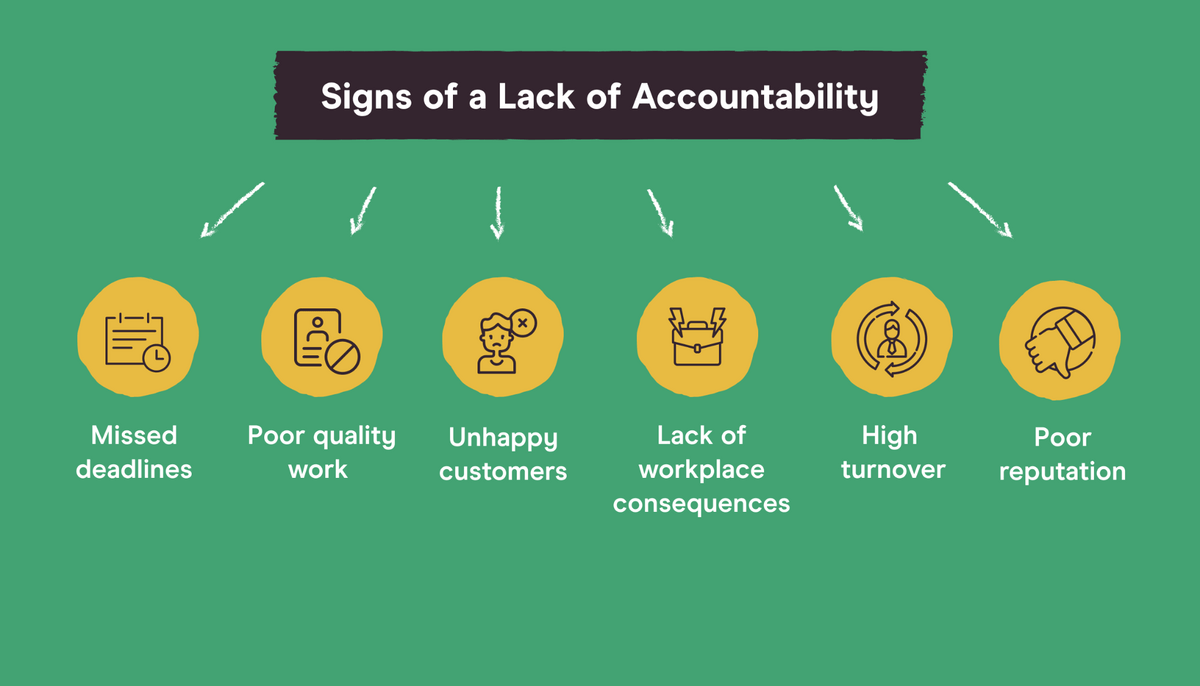
The Value of Holding Individuals Accountable
Any leader would be troubled by those numbers. After all, accountability is crucial to the success of your business.
1. Accountability strengthens the culture of your business
According to MCGB Properties Ltd.’s director and vice president of marketing, John Wright, “a lack of accountability can have a snowball effect throughout the team.” “When an organization’s culture is embedded in honesty and integrity, it enables people to acknowledge mistakes without fear of blame and to work with the team to reflect, learn, and move forward in a positively.” author Pete Lowe continues.
It’s true: When everyone, from the top to the bottom, keeps their word, doesn’t point the finger at others when things go wrong, and helps others reach their goals, an effective workplace culture is fostered. Because of this, productivity is increased and trust is fostered.
How do you accomplish this? By making accountability everyone’s responsibility, according to Wright, you can ingrain it. Before continuing, set relevant goals and gain support from the team. Establish trust by offering assistance and encouragement while exhibiting the conduct you expect from your coworkers. This will enable the team to celebrate victories as a whole while also empowering individual team members.
2. It raises each individual employee’s performance.
Making the most of your employees should be one of your top priorities as a business owner. What connection does this have to accountability?
First of all, accountability encourages ownership and involvement since everyone is crystal aware about their roles and obligations. This not only teaches your staff to value and be proud of their work, but it also clarifies how that job fits into a larger context. It demonstrates your trust in them by allowing them to operate how they desire. Additionally, because everyone on your team is aware of what they are expected to do each day, less time is spent deciding what to work on first and in what sequence.
All of this adds up to a staff that is more productive, engaged, and driven to produce higher-quality work. The best part is that you have a high-performing workforce that holds itself accountable without your help; when people are forced to face standards and accept them, there is minimal need for outside interference. They want to feel good about themselves.
3. Accountability promotes greater compliance with regulations.
Employee compliance with both existing and new firm policies, rules, regulations, and standards depends on accountability. People are more inclined to follow instructions if they are aware of the repercussions of not doing so, and groups that are aware of the importance of the standards will cooperate to uphold them.
When individuals within an organization are held accountable for their conduct, a healthier, happier, and safer workplace is produced where everyone can concentrate on their work instead of having to cope with the inappropriate activities or behavior of coworkers. This may also lessen the number of potential lawsuits or fines that your business may incur.
4. Your bottom line will benefit from accountability.
Accountability can also boost your financial performance. You and your team may focus more of your attention on the tasks driving your business forward when you aren’t wasting time looking for issues and making judgments. Additionally, everyone is motivated by accountability to surpass their objectives and enhance their performance since they are aware that they cannot let up.
And since they’re engaged, you’ll outperform your rivals – according to Gallup, highly engaged workforces outperform rivals and generate 21% more profit. Adding a healthy dose of accountability may keep “the ideas flowing and the execution happening,” as business consultant Jason Blumer puts it. That, in my opinion, is the simplest and most efficient way to expand your business.
Accountability is important, but it can be intimidating to think about. Determining what accountability means to you and your business, though, should be the first step. If people are not held accountable, what will happen? Where does creative and innovative freedom need to be allowed? Set specific objectives, criteria, and rules for everyone to abide by after that.
Most importantly, give your staff the keys. Let them work as they wish and figure out ways to handle issues. Of course, you have to lay out the rules for them, such expectations and deadlines. But having ownership won’t simply make employees more accountable; it will also make them happier and more productive, which will reduce expenses and increase your cash flow. And when they do make a mistake—not if—they will learn from it and advance.
Enforcing good habits can be challenging, but if you ignore accountability, everything else will become much more challenging. Holding yourself and your coworkers accountable for your actions is an investment. Your business will gain, as well as your relationships.

Case Study
In an interview with the RBL Group, Matt Holland, the president of Utah Valley University, speaks about how “individual and organizational accountability has brought sustainable results to the organization.”
10 instances of accountability at work
There are many ways to demonstrate accountability at work, such as these 10 instances:
1. Observe the small details
You may guarantee accurate and high-quality work by paying close attention to the specifics in your work. By paying attention, one assumes responsibility for locating the crucial components that guarantee a project’s success. Additionally, paying attention to the details makes it less likely that you will make crucial errors.
2. Recognize your errors and make the necessary corrections.
Accountability entails owning up to your faults and putting them right. While it may be simple to place the blame elsewhere, accountability requires that you own up to your mistakes and take the necessary corrective steps. Making mistakes is a crucial component of learning. You can go from responsibility to blame when you can look at your mistakes as a chance for improvement.
3. assist your coworkers
Being accountable in the workplace entails adopting a team-oriented perspective. Giving your colleagues a hand with their work makes the team as a whole more productive and successful. For instance, you may offer to stay late with a coworker to assist them finish a last-minute project or step in to cover for a coworker who is absent from work due to illness. Giving assistance after finishing your own tasks demonstrates cooperation, empathy, and responsibility for the group’s success.
4. Create a proactive strategy
You can take either a proactive or a reactive strategy when working. Being reactive is making decisions based on what has already occurred. For instance, a client has a grievance against a product you sell. You respond in a particular way based on the information you learn from the consumer because this is the first time you’ve heard about the problem. Although it’s a typical aspect of employment, this reactive behavior puts you in danger.
Being proactive means planning ahead to identify potential problems. You can develop workable ways to reduce or get rid of foreseeable issues by thinking forward. Being proactive is crucial to being held accountable. You can come up with approaches to enhance the system to lessen potential threats and difficulties.
5. Come across as a leader
No of your position, leadership is about being present and taking accountability for your group and organization. Since anyone can be a leader, management and supervision of others are different from leadership. As a leader, you provide an example for others to follow in order to fulfill tasks. In the workplace, leadership also entails encouraging initiative. Taking the recycling out by oneself, as opposed to passing by an overflowing pile of paper recycling, is an example of initiative.

6. Take a stand for what’s right.
Accountability can be demonstrated in the workplace by standing up for what is right. Sharing your thoughts and seeking a solution when something isn’t right are both part of being accountable to yourself and the people you work with. For instance, this can entail combating workplace bullying, promoting inclusion and diversity, or spotting unethical behavior. When there is an injustice or misconduct that is hurtful to others, saying nothing or doing nothing demonstrates a lack of accountability.
7. Gain better attendance
Being responsible entails being present at work each day. While personal time off, holidays, and sick days may occur, being dependable in your attendance demonstrates your commitment to your achievement and the success of your team. Make it a habit to get to work on time or a little early. Continue honing this skill by respecting other people’s time and showing up prepared to work at meetings and talks at the scheduled time. Increasing your punctuality and attendance demonstrates respect for the time of those around you.
8. Be open to receiving feedback.
Being responsible entails being prepared to accept encouraging feedback. Managers, colleagues, customers, or others who are under your supervision may offer criticism or feedback. In order to be responsible, you must be coachable and own your limitations. Accepting criticism might assist you in concentrating on personality traits or technical skills you can develop. Being coachable also entails listening to those around you and respecting their perspectives.
9. Present remedies as opposed to complaints
Offering solutions as opposed to complaints is a terrific method to promote accountability at work. When you anticipate negativity in meetings or conversations, this tactic is very useful. You become proactive when you handle issues by coming up with a solution rather than whining about them. You might begin to formulate ideas for a strategy.
Consider a situation when your team is dealing with a demanding client. Instead of venting to the other team members during the weekly staff meeting, present numerous options. Offer suggestions for how the team may better assist the client and anticipate that their demands will supply the necessary knowledge.
10. Apologize sincerely
Accountability entails making an honest apologies when you make a mistake at work. By expressing regret, you demonstrate that you are aware of your error and are accepting responsibility for your actions. The best type of apology is one that is sincere and heartfelt. Saying you’re sorry, for instance, demonstrates your responsibility to both yourself and those around you, whether you’re sad you neglected to finish a task or feel horrible about how a conversation ended.

Exercise 1.1: Accountability

Course Manual 2: Accountability Roadmap
The goal of this study is to assist your teams in determining how well they are prepared to engage in effective accountability, a crucial element of becoming a powerful team. The assessment’s questions are focused on the elements that support positive, future-oriented accountability, the kind utilized by high-performance groups like fighter squadrons and Navy SEALs. The more fundamental goal is to support your teams in making progress in these areas so they may reach their full potential and thrive in the face of disruption. to perform at their highest level despite the difficulties. In Debrief to Win: How America’s Top Guns Practice Accountable Leadership…and How You Can, Too! the important insights that guide this evaluation are briefly summarized in the pages that follow. Understanding the fundamental ideas will make it easier for you to comprehend the results presented on these pages and to act accordingly.
How We Have Been Configured To Adopt Positive, Forward-Focused Accountability
A team is a unique group of individuals. A team is defined as a “small group of people with complementary abilities who share commitment to a common purpose, performance goals, and a strategy for which they are accountable,” according to researchers Katzenbach and Smith. These six elements are supplemented by the following by VMax Group: alignment of values and beliefs, and submitting oneself to the needs of the team. Teams work by adhering to a standardized, ritualized lifecycle. For each tactical task they carry out, high-performance teams specifically follow the following lifecycle: They co-plan, communicate the plan before execution, carry out the plan, and, following the successful completion of the tactical mission, debrief the planning and execution phases. Plan – Brief – Execute – Debrief is how to wrap it up. Since World War I, fighter squadrons have followed this lifecycle.
The team utilizes each member’s unique skills to do its work. In turn, each team member supports the group by speaking up and resisting the propensity to “group-think.” The finest planning is done by teams that include individuals with a variety of perspectives. Execution involves changing course when necessary and acting in accordance with the current situation’s realities. Team members must be given the authority to act in order to execute. The most effective teams favor doing.
The team’s team accountability exercises take place during the debrief. Accountability is described by VMax Group as “taking absolute ownership for the results the team achieves.” In addition, the Debrief is described by VMax Group as “…the process of constructively evaluating the quality of the decisions taken by everyone on the team made from planning through execution, in relation to the objectives the team set out to achieve.”
Debriefings are crucial to understand because they never result in assigning blame. Shame is not among them. Debriefs are actually constructive, future-oriented activities intended to strengthen teams, support team members’ resilience, and foster trust. especially when the mood is intense. particularly after a team failure.
Unfortunately, most corporate teams don’t actually exercise accountability in this way. In a debrief situation, it’s natural for us as humans to look for errors, point out shortcomings, and criticize subpar performance. Even while the intentions are good, it rarely results in a positive end that serves the team as a whole.
The following elements of the Debrief to Win strategy are listed in the following section in order to develop positive, future-focused accountability.


Case Studies
Idea-Driven Meeting Culture
This style of meeting culture puts ideas first and encourages innovation and teamwork.
Not every meeting has to be a brainstorm just because the culture of the group is idea-driven. It’s about fostering an atmosphere where the best concept prevails, regardless of where it comes from.
Hugo has a concept he calls “Absolute Honesty” that combines meritocracy with culture. Employees engage in frequent back-and-forth exchanges of thoughtful disagreement in an effort to advance thinking and produce better conclusions. Conflict can be handled respectfully when there are clear rules for disagreeing.
Weighted voting are used at Hugo to shield ideas from democratic procedures that typically lower the bar. The final decision-maker is given three times as much weight as those who will be impacted by it, while the remainder are only given one.
Ideas are also served by Pixar gatherings. Senior managers might enter a meeting unprepared since moving projects forward is more important than power struggles.
“Dailies” are held by Pixar teams to discuss current projects. Its renowned Braintrusts enable teams to receive helpful criticism about their films from people working on other films, and the reverse. Pixar’s post-mortems, which include five things they would do again and five things they won’t, help the creative process.

Case Studies
Idea-Driven Meeting Culture
This style of meeting culture puts ideas first and encourages innovation and teamwork.
Not every meeting has to be a brainstorm just because the culture of the group is idea-driven. It’s about fostering an atmosphere where the best concept prevails, regardless of where it comes from.
Hugo has a concept he calls “Absolute Honesty” that combines meritocracy with culture. Employees engage in frequent back-and-forth exchanges of thoughtful disagreement in an effort to advance thinking and produce better conclusions. Conflict can be handled respectfully when there are clear rules for disagreeing.
Weighted voting are used at Hugo to shield ideas from democratic procedures that typically lower the bar. The final decision-maker is given three times as much weight as those who will be impacted by it, while the remainder are only given one.
Ideas are also served by Pixar gatherings. Senior managers might enter a meeting unprepared since moving projects forward is more important than power struggles.
“Dailies” are held by Pixar teams to discuss current projects. Its renowned Braintrusts enable teams to receive helpful criticism about their films from people working on other films, and the reverse. Pixar’s post-mortems, which include five things they would do again and five things they won’t, help the creative process.
We Do It Because…
The top teams everywhere aim to continuously learn. Both the causes of their achievement and the factors that led to their failure are something they want to comprehend. The greatest teams understand that the only way to learn is to thoroughly examine what occurred and why, so that the positive aspects can be reinforced and the problematic aspects can be avoided. The top teams are aware that debriefing to win is the most efficient approach to handle all of this.
Not only do military teams engage in debriefing. Debriefs are actually an integral element of the team lifecycle for a huge number of business teams across a huge range of industries. Retrospectives, After-Action Reviews, Lessons Learned, or Post-Mortems—whatever you want to call them—are how teams improve retention, ensure engagement, and drive performance.
And as if that weren’t enough, in 2013 two researchers—Tannenbaum and Cerasoli—published the findings of their meta-analysis on the efficacy of debriefs. “Organizations can improve individual and team performance by approximately 20% to 25% by using properly conducted debriefs,” they said in their conclusion.
Since learning occurs during debriefing, the greatest teams do it. Performance is driven from there. They receive the greatest benefit from and return on their time investment there.
How to Establish Roadmap Accountability with Your Team in 6 Steps
You’ve decided to buy your team a standardized roadmapping tool. That’s a fantastic beginning, but how can you make sure they actually update their roadmaps? The suggestions below will ensure roadmap accountability as you develop your roadmapping strategy with your team.
1. Designate a process champion.
Designating one or more people as accountable for the result is a crucial component of achieving accountability. This individual may be a process champion chosen by the team or an executive sponsor. The road mapping process needs to be successful, so the champion must establish the standards, objectives, and rules.
Early on in the process, expectations must be set. They will be ineffectual, though, without a champion to hold the squad accountable. The roadmapping process’s objectives can be regularly assessed by the champion to see if they are being met. If this is the case, champions have material to keep the squad motivated. Having a champion to spearhead a change in the process is essential if the team is not accomplishing its objectives.
2. Identify your “Why” first.
In actuality, few people enjoy being told to follow orders blindly. Communicating the motivation behind the roadmapping process is a crucial step in getting any team invested in it. Why does your team need to implement a new procedure, to begin with? What problems are you hoping to find solutions for the group? Next, go into the details. Why did you pick the tool that you’re asking the team to use? It could be useful to describe the standards your team was looking for and how the tool you chose stacked up if your team assessed several tools. Understanding the rationale behind introducing a new procedure or switching to a new technology is crucial to encouraging users to put in the necessary work.
I need to know a team’s “why” in order to manage a customer’s success, so to speak. Each team uses its road mapping method to try to accomplish a particular set of objectives. Setting these objectives early on in the process offers the team something to strive for and gives you and your customer success manager benchmarks to aim toward. How can I assist you achieve your goals if I don’t know what success looks like for you? Likewise, how can your team know that the effort they are exerting is worthwhile if they have no notion what success looks like?
3. Shared teamwide blueprint
Maintaining collaboration throughout the process is one of the most crucial techniques to guarantee the success of roadmapping. Encourage users to share their roadmaps immediately is one simple method to accomplish this. A user’s first instinct is frequently to keep the product plan secret until the final version. This might work for a PowerPoint slide that is static, but a living roadmap will never be finished. Since roadmaps are constantly changing, publishing yours early on will help your audience understand how it developed. Editors will be more likely to update their roadmap frequently rather than just before a large presentation if they are aware that it may be viewed at any time.
Working with a group that was completely new to roadmapping made the value of publishing roadmaps early on clear to me. A few weeks following this group’s first training, I planned a teleconference with all of the editors to make sure no questions remained and to hear how the roadmapping process was going. No one had touched their roadmaps since our previous session, so when we came on the phone, there was an awkward quiet to my inquiries. Users admitted not working on their roadmaps since they didn’t know when they were supposed to have them ready when I questioned them about it.
Since there is no notion of a roadmap deadline thanks to revealing your roadmap up front, updates continue to be a habit.
4. Establish a presentation cadence for the roadmap
A good strategy to encourage users to update their roadmaps is to set up a recurring roadmap meeting or set aside time in a pre-standing meeting for that purpose. In a perfect world, roadmap editors are always being updated as tasks advance or change. But regrettably, this is not always the case. A baseline cycle for updating the roadmap will be established by allocating a recurring time for its presentation.
Some of the larger businesses I work with set up biweekly roadmap forums where the team can gather and review their roadmaps, evaluate what’s working and what isn’t, and speak about process modifications. Because it made it easy to spot users who weren’t adhering to the rules as they presented their roadmaps, one champion told me that this was the key to achieving standards in their roadmapping process.
Pulling up your roadmap while in a meeting is simple thanks to an integrated presentation mode. For these meetings to stay engaged, we advise sharing your plan in real time. A dynamic roadmap allows you to present at various degrees of depth, delve deeper into any topics you desire more information on, and make adjustments as needed.
5. Make use of integrations
Making the procedure as straightforward as feasible will help editors stay motivated to update their roadmaps. Integrations are one of the most beneficial strategies to streamline the roadmapping process. Nobody wants to do extra work, thus the purpose of roadmap integrations is to make it simple to add information that has already been created somewhere else to your roadmap and to automatically keep it updated. There are more chances for information to go out-of-date the more places a user must update it. Why not only concern yourself with changing data once and having that apply to your roadmap?
6. Frequently reviewing your accounts with your customer success manager
I admit that I may be a little biased, but bear with me. It is your liaison’s responsibility to assist your team in establishing and maintaining an effective roadmapping process. Account reviews are the best way for us to continue assisting your team in being successful. These provide us a chance to communicate with the champions and check the account’s vital signs. The comments will let us know where the process is functioning and point out any areas that need improvement. We’ll urge the team leads to get feedback from both editors and roadmap visitors.
We’ll also examine the team’s performance against the champions in great detail. We’ll determine which features to employ or not as well as any usage patterns within teams. We’ll examine the overall account health together and evaluate how the existing procedure compares to the objectives. We will examine the rules established at the start of onboarding to determine whether they are being followed or not. It aids in the development of the subsequent training steps and provides the champion with specific usage metrics that they can share with the team to promote accountability.

Exercise 1.2: Dice Debrief


Course Manual 3: Pre-Assessment
Seven Inquiries To Assess Workplace Accountability
What does it actually mean when people say they desire highly accountable personnel and workplace environments, and why do we work toward it? Being responsible is being held responsible for actions that occur within one’s area of influence. Employees that have a feeling of accountability for their work and the results of their decisions are referred to as accountable within organizations.
Indeed, research has shown that the most successful and high-performing firms are those in which staff members feel empowered and have a voice in the work they undertake.
We are also aware that accountability has effects that reach beyond the individual. Only 45% of the employees we questioned at Culture Amp agreed or strongly agreed with the following statement: “When it is clear that someone is not delivering in their role, we do something about it.” Accordingly, more than half of workers doubt or don’t agree that others in their organizations are being held accountable.
Additionally, we’ve discovered that employees who answer unfavorably to the statement “We hold ourselves and our team members accountable for results” are 13% less engaged than those who believe their firms place a high value on accountability.
We’ll discuss how to use your employee engagement survey to gauge accountability in the remaining sections of this course manual, along with the specific queries you can use to elicit useful feedback.
First, we can include questions in our engagement surveys to gauge how accountable people feel at the departmental, organizational, and individual levels. You can determine whether particular departments or groups of employees are having accountability issues by using features like Culture Amp’s demographic filters and heatmap.
Second, surveys are a two-way form of communication. Through the questions we ask, we are inadvertently conveying the actions and results we desire. Inquiring into how employees feel about accountability can help us emphasize the kinds of actions that are crucial and essential to our workplace culture.
So, what kinds of inquiries can you use to gauge accountability within your company? View these seven hand-picked resources from our People Science team.
There are seven queries we can use to gauge accountability.
Since accountability is crucial for organizational success, we at Culture Amp have already incorporated two questions on it into our engagement survey template.
1. We hold each other and the members of our team responsible for the outcomes.
The degree to which employees view accountability across the organization is included in this statement. This is an accurate indicator of how much accountability is displayed at the overall organizational level. To reduce social desirability bias, the item was specifically designed using a “we” format.
We’ve already spoken about how most organizations claim to be looking for someone who is highly accountable, and we know that people tend to present themselves in ways that will fit in or please an audience. We are more likely to get accurate perceptions of the culture of accountability across the organization if we change this item from a “I” to a “we” approach.
2. I know how my job relates to the aims of [my organization].
This query deals with personal accountability. Do workers comprehend how their efforts support the objectives and priorities of the company? Less positive results in this area could be a sign that further investigation is needed to see whether employees believe they have enough control over their work to guarantee that it is in line with strategic priorities.
We also understand that you might wish to delve further into accountability measurement. The five extra questions listed below should be taken into account for your upcoming engagement survey.
3. I am pursuing a career strategy that I have in place.
4. I look for chances to learn skills related to my interests.
These two inquiries probe each employee’s motivation to keep growing and learning. Learning and development is a perfect illustration of something that everyone in the organization, not just the Learning and Development team, is responsible for. At the organizational level, it’s important to make sure our employees have the right chances and experiences, but they also need to put in the time and effort to take advantage of those opportunities. Therefore, by asking these kinds of questions, you can gauge how much each party is doing to promote the learning, development, and progress of your employees.
5. I regularly (weekly, for example) ask my manager for input.
6. I request the tools I require to make sure I can accomplish my objectives.
These two criteria evaluate one’s sense of ownership of their work. People who feel they can (and should) make decisions about their job are a big part of a highly accountable culture. This entails persistently asking managers (and others) for feedback and aggressively asking for the resources required to achieve expectations.
7. We hold our executives responsible for the success of the business.
This last item assesses how perceived leadership responsibility is. We are aware that accountability needs to be shown at all organizational levels. Employees of all levels are more inclined to hold themselves to account when firms demonstrate that even the highest levels of senior leadership are held accountable.
The most crucial thing is, at the end of the day, to define what accountability is within your business. Is it resilience? a want to keep learning new things? a strong sense of responsibility and ownership for one’s work? Or do you want your staff members to be open and honest when things don’t go as planned? You can use your engagement and performance evaluation tools to have a better understanding of how accountability is being handled at your business, whatever it may be.

Case Study: Accountability vs Responsibility
Alec Baldwin shot Halyna Hutchins on the set of the low-budget Western RUST on October 21st, 2021. But who bears ultimate responsibility for the shooting, and does that duty in any way lessen the producers’ accountability?
In the conversation, Alec Baldwin discusses the sad shooting deaths of Halyna Hutchins and Joel Souza on the set of his newest film, Rust, with ABC News correspondent George Stephanopoulos.
When asked about his involvement in the shooting, Baldwin says he doesn’t feel bad about what happened and that he understands someone is to blame, but it’s not him.
The distinction between accountability and responsibility is shown in this case study. You can delegate responsibility for tasks, projects, and even missions as a leader, but you still bear ultimate responsibility for the decisions made by the people you are in charge of and the results of those decisions.
Even if you might not have direct control over what your followers do, you are still accountable for their deeds, and it is your duty to make sure they have the training, expertise, and experience necessary for the tasks given to them. Additionally, you are in charge of creating the environment necessary for their tasks to be carried out successfully and safely.
As leaders, we must have faith that individuals to whom we delegate responsibilities will do them safely and in accordance with all applicable rules and guidelines. With the absence of willful negligence or sabotage, our followers’ behavior and how they carry out their tasks are directly related to how they perceive our expectations of them and how we permit them to behave.
This is particularly true of teams that are swiftly assembled for brief periods of very hazardous labor. The capacity to establish trust quickly is supported by knowledge of each team member’s abilities and background; it shouldn’t be reliant on presumed competency. The level of mutual trust that exists between a leader and their followers should be proportional to how well they know one another or should be based on independent verification of the leader’s abilities, reputation, and expertise.
We retain the duty to maintain oversight, make sure all necessary checks and balances are in place, and make sure due diligence is carried out, even though it is frequently appropriate and even necessary to use “Mission Command” and give our followers the autonomy to carry out their roles based on their abilities and experience.
We must make sure that our followers feel “psychologically safe” to voice their opinions and share their worries since only then can they be assured that they will be heard and taken seriously. As leaders, it is our responsibility to base choices on the most accurate and comprehensive information at the time. Too frequently, when things go wrong, leaders either downplay worries because they could not “see” them as substantial hazards, or followers choose not to voice concerns out of fear of ridicule, coming off as naive, or being alarmist. All leaders must be able to look backward, and to borrow a term from the late Stephen Covey, they must always “start with the end in mind.”
One of the most difficult aspects of becoming a successful leader is relinquishing control and assigning non-leadership tasks to your followers. Leaders cannot handle everything themselves. While you can give your followers authority and responsibility, you cannot abdicate your overall obligation because delegation does not imply abdication.

Exercise 1.3: Personal Accountability: 20 Questions To Determine If It’s Really a Core Value

Course Manual 4: Debriefs Explained
“Debrief” is defined as “to interrogate (as a pilot), usually upon return (after a mission) in order to gather important information” by Webster’s Collegiate College Dictionary. It’s essential to note that Webster’s chooses aviation as the foundation for its definition of the phrase, even though I don’t find it particularly satisfying (“useful information” is a terrible description of what we’re really acquiring). This is not to imply that debriefs are just used in aviation; many societies refer to the same fundamental procedure using various nomenclature. The Army uses the term “After-Action Review,” although the Marine Corps frequently uses “Lessons Learned Reports” or a closely comparable form. Retrospectives is the term used in the software development world, and there is a whole sector of the economy devoted to aiding this kind of debrief. But since the dawn of flight, pilots have been debriefing their missions, and fighter pilot debriefs—the kind I’ll be describing—come with a storied and extensive history.
Origins Debriefings for fighter pilots have existed at least since World War I. Maj. John P.H. Rayder analyzes Edward Mannock’s experience in “Armed for Success: External Factors of the World War I Aces,” a paper for the U.S. Army Command and General Staff College. While instructing the members of his flight, Mannock was “An exceptional commander” who “conducted detailed briefs and debriefs-stressing formation, aggression and tactical judgment.” In a broader sense, Rayder observes that “specialist pilot training was formed at the institutional level, taking form in an equivalent of today’s fighter weapons schools” in the latter stages of World War I. Prior to this, only members of the fighting units were in charge of providing pilot training. The aces had an impact on this front-row training opportunity. Additionally, “This training comprised of specific conditions, including preflight briefs, postflight debriefs, and devoted study and understanding of the tactics employed.” Finally, both parties applied this brief-debrief method. Early German squadron-level training programs that included thorough preflight briefings, postflight debriefs, and tactics analysis, according to Rayder, “laid the groundwork for the air combat success of some German pilots… Due to their training and the superiority of the Albatros [sic] fighter, the Germans held the upper hand in air warfare at the beginning of 1917.
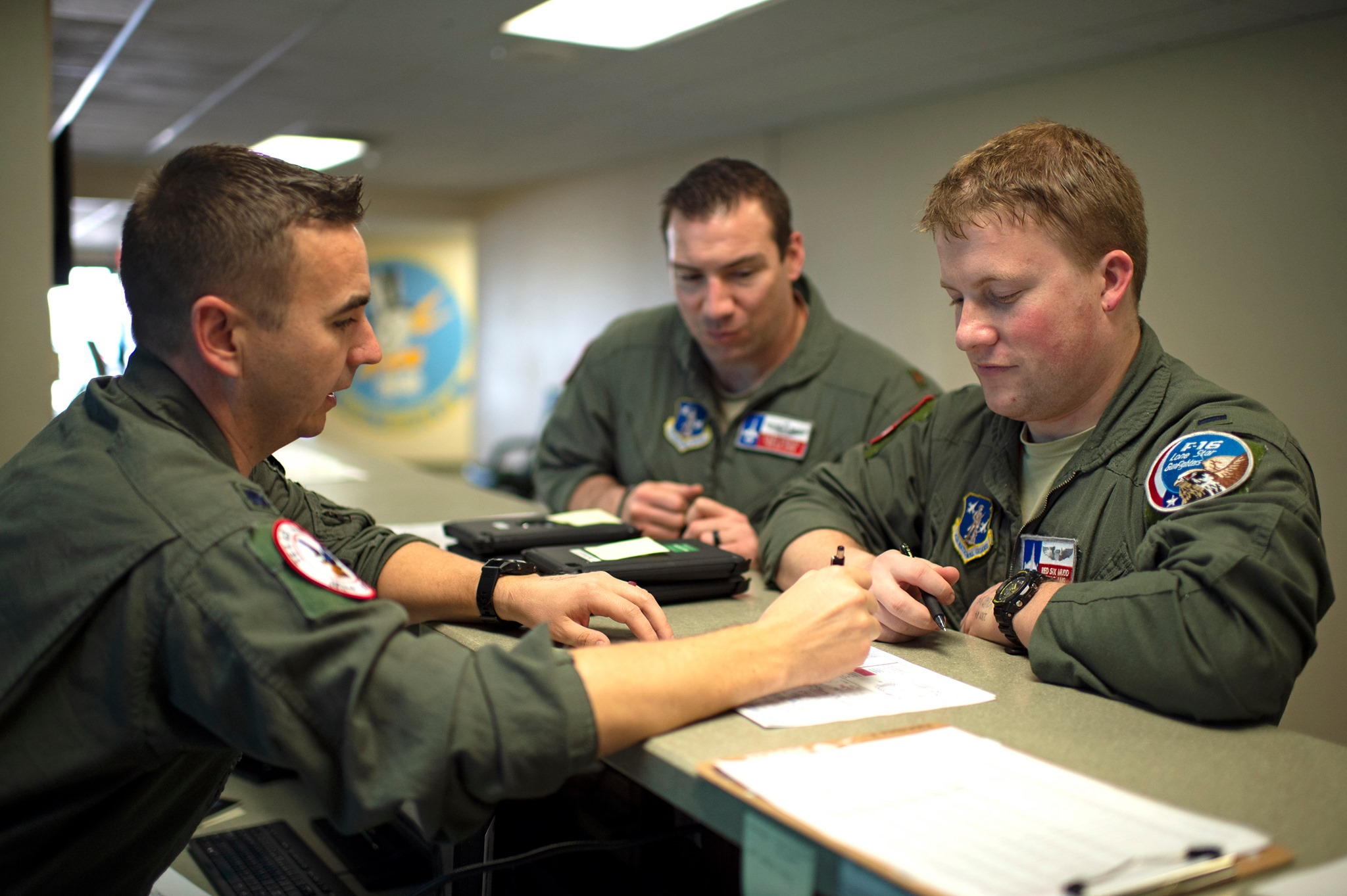
The nature of the organization that opted to employ this tool is the one thing that connects the fighter debriefs, which date back to World War I, and the numerous sorts of debriefs previously discussed. Debriefs are used by organizations that have a strong desire to succeed. Debriefs are a frequent, accepted practice on winning teams. The U.S. Navy SEALS, Army Rangers, and the Special Operations Community as a whole are a few examples of these kinds of teams. Professional and amateur sports teams both employ a version. For instance, the New York Giants held debriefings every one to two days following their games in 2011 to determine what worked and what didn’t. By chance, they eventually won the Super Bowl that year.
Numerous companies are attempting to take use of this potential because they are aware of this reality. Jim Collins writes in his book Good to Great that organizations that “Conduct autopsy, without blaming” have created cultures where the “truth is heard.” Those autopsies served as a debriefing. Collins continues, saying that “Leadership does not simply begin with vision. It starts with convincing individuals to face the harsh realities and take appropriate action. Ignoring the harsh facts of reality is one of the main methods to demotivate individuals.
Debriefs start with the harsh realities and utilize them to assess if the task was completed properly. Failure to do so could lead to a repeat of the failure, as Norman Kerth writes in his book Project Retrospectives: “By avoiding a review of a failed project, the community misses a precious opportunity to learn from its experience.”
Popular speakers and leadership trainers Jocko Willink and Leif Babin frequently discuss the consistency of their post-mission debriefs in their best-selling book Extreme Ownership. They particularly state, “The top SEAL groups do what we called a ‘post-operational debrief’ after each combat action. No matter how worn out from an operation or how busy planning for the following mission, time is made for this debrief since it is essential to the safety of the team and the success of upcoming missions. In a succinct manner, a post-operational debrief evaluates every stage of an operation, from preparation to execution. It discusses the following for the just concluded combat mission: What went well? What happened? How can we modify our strategies to be even more powerful and give us a bigger advantage over the opposition? This kind of self-analysis enables SEAL teams to assess what worked and what didn’t so they can continually improve. Any team in any firm that wants to succeed must follow suit and incorporate the modifications into their future plans in order to avoid making the same errors again.

Case Study
“My Definition of a Debrief A debrief is the process of constructively evaluating the quality of the decisions everyone on the team made from planning through execution, in relation to the objectives the team set out to achieve. Central to a properly-run debrief is the actual practice of Accountable Leadership. It’s an accountability practice because everyone on the team, both follower and leader alike, will be evaluated on the quality of the decisions they made from planning through execution. It’s a leadership skill because someone has to be in charge and actually lead. A debrief is a process that can, because of the nature of the human interactions involved, get intense and touchy.” – Excerpt from Debrief to Win
Importantly, a debrief is not a place for finger-pointing or shaming. In reality, the debrief is where we celebrate our successes and take away lessons from our mistakes. We carry out this in order to create dependable teams and advance. An effective debriefing is a gratifying experience. Future leaders are developed there as well.
The goal of this accountability process and good leadership is to create teams that engage in excellent Teamwork, which is distinct from Taskwork.
To be clear, taskwork is the “doing of things,” the portion that is typically simple and can be completed by lone workers, even if they are technically a part of a team. On the other hand, teamwork is the component that is necessary for a group of people to truly work as a team. The debrief helps the transformation of “Teams of Experts into Expert Teams,” as Dr. Eduardo Salas puts it. It is a team intervention activity created to address the difficulties people have in cooperating, in making choices that are supportive of group objectives, and in getting beyond obstacles. The factors that promote good teamwork, including as adequate communication, backup behavior, role clarity, and shared mental models, should be well understood by leaders. Good debriefs are essential to effective teamwork.

Case Study: NY Giants
After each game in 2011, the year the NY Giants won the Super Bowl, they had debriefings to analyze what worked and what didn’t.
After a 4-2 start, the team’s director of player development Charles Way invited fighter pilots from the corporate training firm Afterburner Inc. to speak to the group about the need of “debriefing” sessions during the team’s bye week. The process of sitting in a room together without knowing each other’s names or ranks and speaking candidly about mistakes they both made on the mission helps pilots who have just returned from missions to develop trust. Players also received a copy of a book written by James D. Murphy, one of the pilots, whose title perfectly captured the ultimate objective: Flawless Execution.
Soon, Manning and Tuck were in charge of the offensive and defensive post-game debriefings. There were no coaches present. Meetings lasted somewhere from 20 and an hour. Manning claims, “I wasn’t coaching anybody. “I was just coaching myself, looking at what I needed to do better and telling everybody. Then everybody would talk about what they needed to do to improve.”
Linebacker Mathias Kiwanuka claims: “There was a time there when we needed every single minute of [debriefing]. It wasn’t about calling people out. It was an opportunity to see everybody hold themselves accountable. The big part of why we’re here is that fingers don’t get pointed. These kind of teams don’t come along very often.”
If responsibility and execution were the hallmarks of New York’s unbeaten streak from 7–7, they served as guiding principles during the Super Bowl.

Exercise 1.4: Survival Leadership Activities

Course manual 5: Mission Command
Why companies might use Mission Command as their operating system
The world is becoming a more varied, connected, but scattered location to conduct business. Businesses are becoming more decentralized as new working methods are made possible by technology. Along with the expansion of multinational corporations working in a globalized environment, nationalistic policies in the US and the UK have the opposite effect and will make it worse for companies to be cut off from their divisions. These problems obviously cause conflict inside organizations, but they also present fantastic opportunities for creative development. This article will look at how the military conducts operations (i.e., when deployed) and consider whether or not corporations ought to embrace or modify the idea of “Mission Command.” It is not meant to be a panacea, but rather to spark discussion about how business may address the problems and opportunities mentioned above.
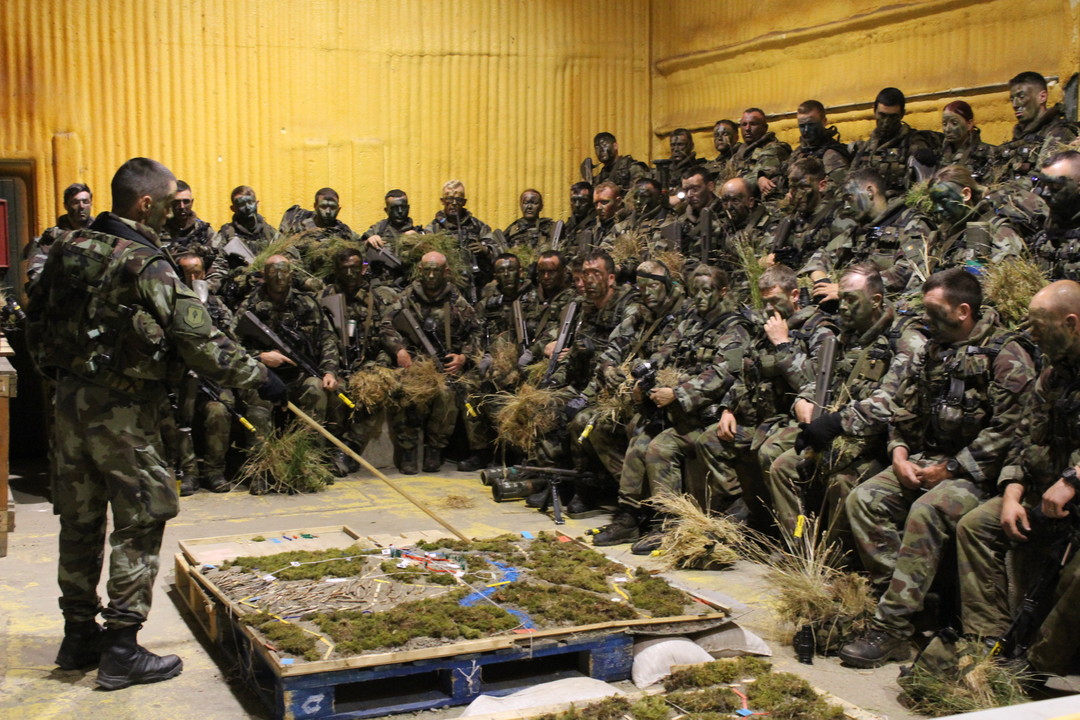
The British Army’s command philosophy is called Mission Command. It is intended to encourage initiative and freedom of action while empowering leadership at all levels. This is accomplished by concentrating on results, aims, and consequences rather than outlining the specific methods by which these are to be accomplished. It is supported by establishing a focus on reaching a greater intent, therefore it depends on senior leaders communicating their vision without stifling their team’s innovation. It is utilized at all ranks of the British Army, from general to lance corporal, and is considered important because it is both a culture and a doctrine. There is a guiding premise and five additional principles to implement Mission Command:
Overarching Principle. To take action in order to fulfill the higher commander’s goal is your sole obligation.
Oneness of Purpose. The senior leader’s capacity to communicate a clear objective (vision) and mission statement (tasks and unifying purpose), a consistent language (professional phraseology), the identification of priorities, and a “Main Effort” is what results in this.
Leaders at all levels will offer their own direction and resource their plans two levels down, and they will nest their plans with the intent of superiors at least two levels up. Along with this “vertical integration,” there is also “horizontal integration,” in which executives comprehend what their colleagues are accomplishing and how it ties in with the overall strategy. Thus, personal goals are avoided.
Leaders will announce a “Main Effort” in support of teamwork, which is interesting to explore. The mission’s success depends on this effort, according to the leader. Even though they are not a member of it, they may lose resources to it and are required to assist it without additional instruction. It draws resources and has relevance for all subordinates. In the world of product and/or business development, there is clear overlap here.
Action Freedom. This stems from the necessity to beat the decision-action cycle of the competition. It is expected of subordinates that they take initiative to make wise decisions and that they quickly modify their plans in response to changing conditions. It goes hand in hand with an awareness of motives and a drive to triumph. Decentralized execution is made possible by leaders giving their subordinates enough resources and decision-making authority so they can function independently of management.
Trust. This is a requirement for all levels of command. It is reciprocal but derives from the acknowledgement of a justifiable failure to promote learning. It also relies on a variety of personal traits, including leadership by example, ethics, skill, and attention to detail.
Mutual comprehension Typically, this is built through time by using concepts and common doctrine (MO). It also depends on leaders at all levels acquiring professional expertise so they can comprehend the requirements of their superiors and foresee what is expected of them. Of course, the senior leader’s intention links everything together.
We can keep ahead of the decision-action cycle of the competition by making decisions quickly and effectively. In the military, this entails taking action faster than the opposition and not waiting for the ideal decision. Being the first to market in a competitive industry with an adequate good or service can help you gain market share. It can be dangerous and requires sound judgment. It is important to know when to take action.
The use of mission command
a. Commanders make sure that their troops are aware of the mission, their own contributions, and the environment in which they are to operate.
b. While maintaining accountability for their actions, commanders exercise minimal control over their subordinates in accordance with the context and nature of the mission as well as the expertise and aptitude of the subordinates.
c. The outcome, the impact, and the reasoning behind it are all communicated to subordinates.
d. Ample funding is given to subordinates so they can do their tasks.
e. The best way for subordinates to carry out their superior’s wishes is up to them.
Here, there is a direct connection to the corporate world. Decentralized decision-making would be made possible by Mission Command as a MO in order to remain competitive. It gives less seasoned team members more responsibility, which benefits the organization as a whole since it helps them grow into more valuable employees as they advance up the corporate ladder. Additionally, it makes use of the inherent talent present at all organizational levels to ensure that decisions are made in line with the company’s vision and strategic direction.
There are undoubtedly problems, thus a business will need to create a doctrine to promote that common understanding. At all levels, it will need to nurture talent and leaders. How will those individuals understand the philosophy if it employs direct hiring at all levels (as do the majority of businesses)?
An enormously helpful way of working that maximizes skill and promotes quick decision-making is mission command. This essay’s goals were to describe it, suggest it as a potential remedy for the problems and chances that face business, and to promote discussion.

Case Study: Mission Command In Action
”Back in October of 2001, I had just landed from leading a combat mission over Iraq and was getting ready to debrief when I received a message to call my former commander at the Combined Air Operations Center (CAOC). I was exhausted after a long day of mission planning, not much sleep, the adrenaline rush of flying over hostile territory for 4+ hours on a 6.5-hour mission, and then leading the post-mission debrief. As soon as the debrief was complete, I called the number and my former commander let me know that he needed my help in the CAOC—immediately. Excited for a change of pace, I raced over to a massive facility I had never been in before. I had no idea I was about to work an additional 12 or so hours that night in support of our just-started operations in Afghanistan.
The CAOC is where we develop the Air Tasking Order— the document delivered to the Mission Commander that enables him or her to craft the execution plan for the following day. This is the plan that facilitates the continued progress towards the commander’s End State. The progress is incremental; in other words, it may take months or even years to achieve the ultimate End State. And because of the complex nature of the battlefield, progress is achieved and measured in smaller chunks.
That facility was where we transformed strategy into the practical directions needed at the tactical level. Our commander, a three-star general, worked with his staff to develop his vision of the future and craft his Intent such that tactical experts like myself—who operated at the front-lines of the battlespace—could then construct the tactical plans necessary to help him achieve his Ends. His staff worked hard to ensure that every mission we launched brought our collective team a step closer to the end goal, and that we achieved our goals as quickly as possible. The CAOC is where our commander worked to push forth his Intent along with the rest of the details we needed to plan and execute our daily missions. I was fortunate to have this real-time opportunity to witness battle planning in action, an opportunity that made an impression on me at an early stage in my professional development.”
Source: Excerpt from ‘Debrief To Win’
The advantages of embracing a Mission Command mindset.
First off, by delegating authority lower, key decisions in urgent situations can be made faster without having to constantly check in with higher HQ. A section commander, for instance, might be given the authority to lead a section attack without first obtaining approval from his or her platoon commander (and, ultimately, from the company commander) and asking for guidance on how to execute the attack precisely. As a result, junior leaders can task and launch men more quickly than the opposition, taking advantage of tactical shifts and opportunities. Second, giving NCOs and junior officers authority and responsibility will accelerate their professional growth, resulting in their commitment to the mission and development as leaders. In such a situation, the capacity to lead is put to the test, and NCOs and lieutenants should train their soldiers in the most important TTPs to preserve any confidence they may have built up with the commander. Thirdly, the commander’s workload should be reduced as decision-making is delegated to subordinates. This allows commanders to concentrate on higher level tasks that could be crucial to a mission’s success.
Challenges facing Mission Command.
The effective application of this ideology has some challenges, which originate from both the bottom up and the top down. A high degree of professionalism in terms of tactics, methods, and procedures (TTPs) that will foster trust is required on the part of the subordinates. To provide their subordinates freedom of action, higher commanders must be prepared to “let go of the reins” and give up some of their authority. Practically speaking, this means that the commanders must have the courage to relax their hold after the junior leaders have proven their professionalism and competence in their roles.
How can I make Mission Command easier?
The widespread adoption of Mission Command depends on NCOs. The entire organization will gain from the empowerment of NCOs and commanders’ deliberate efforts to eschew micromanagement. Trust will be built by NCOs and junior officers who demand the highest level of professionalism from the men under their leadership. Then, commanders should reciprocate by giving junior leaders as much authority as is practical while making sure that a very clear intent and precise parameters are issued. Delivering a set of instructions to your subordinates with the emphasis on the results you want them to achieve rather than on how they should achieve them is a fairly simple method to implement Mission Command on the next field training exercise in which your unit participates. This is made easier by the effects-based approach to operations, in which the main focus of the orders is the “impact” that the commander intends to accomplish, rather than an excessively prescriptive and intricately detailed Scheme of Manoeuvre. Junior leaders in units should actively seek out mission instructions that emphasize outcome-focused language and effects-based language. The empowerment of younger leaders and speedier decision-making at crucial moments will eventually come from this bottom-up and top-down approach to mission orders and Mission Command. If you successfully implement mission command in your organization, your employees will become active leaders rather than obedient followers.
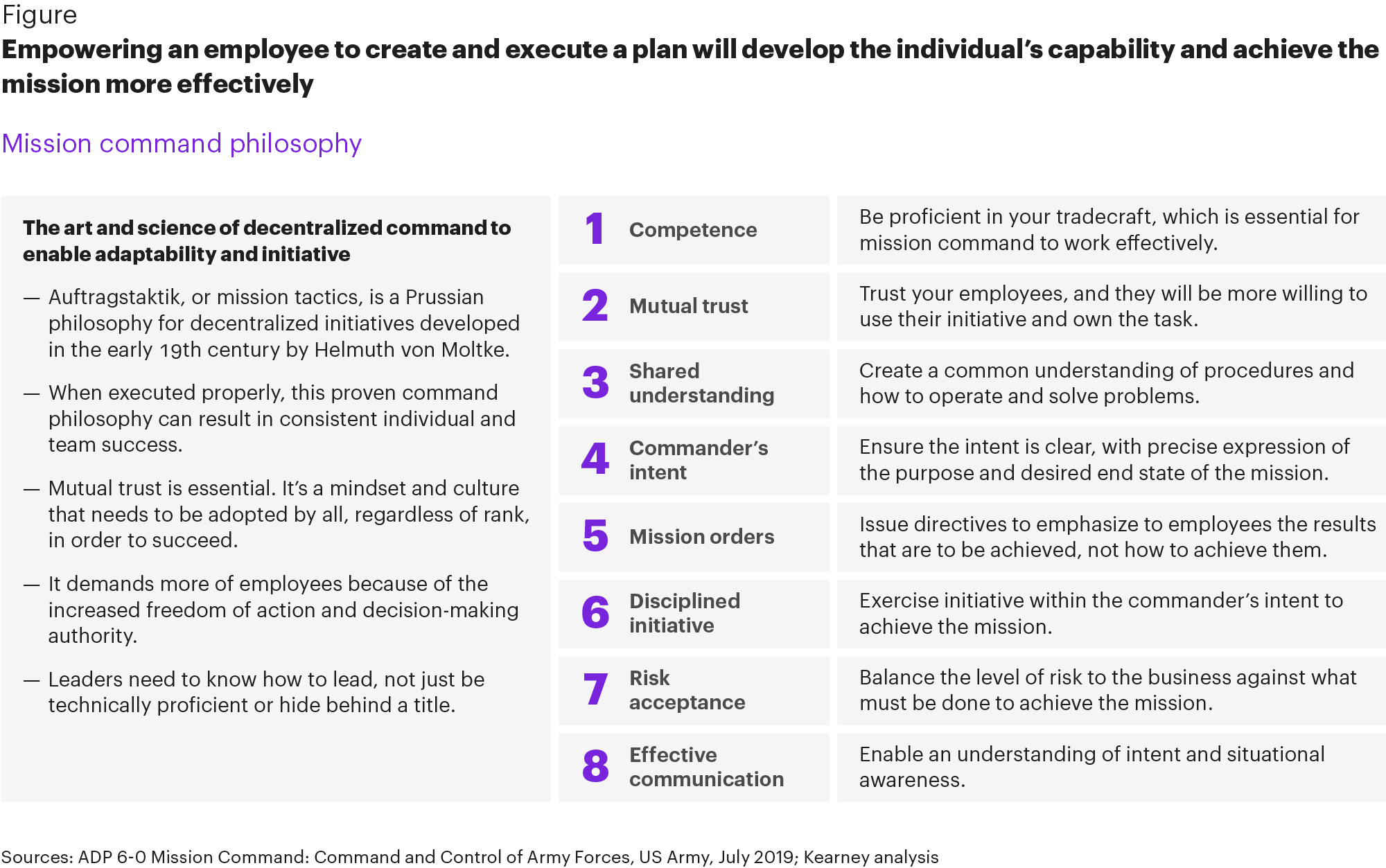

Exercise 1.5: Move the Egg

Course Manual 6: Commander’s Intent. Title
How Well Do You Express Your “Commander’s Intent”? How to Maintain Progress for Your Team
You’ve probably experienced this stage in your professional (and personal) life at some point where you feel overwhelmed and understand that you need to go from working in the business to working on the business. In other words, you can’t always “do” everything, put out every fire, and get bogged down in the minutiae of daily work. Simply said, there is too much to do. The big-picture thinking also needs to be done by someone, and as you glance around, you realize that someone needs to be you.
If you identify with that situation, you are probably in the perilous position of trying to find methods to encourage your team (or possibly your kids) to do more of the routine tasks so you can spend your time on the things “only you can do.” It follows that the question, “How do I make that change and, more importantly, how do I get others to make that journey with me?” is an obvious one. Have you expressed your commander’s intent at this point, we typically ask our clients?
What Does the Commander’s Intent Mean?
When a mission is given to someone, it must be finished because of the commander’s intent. Infusing meaning into a task is essential for increasing your team’s willingness to execute things correctly and effectively because humans are essentially purpose-driven.
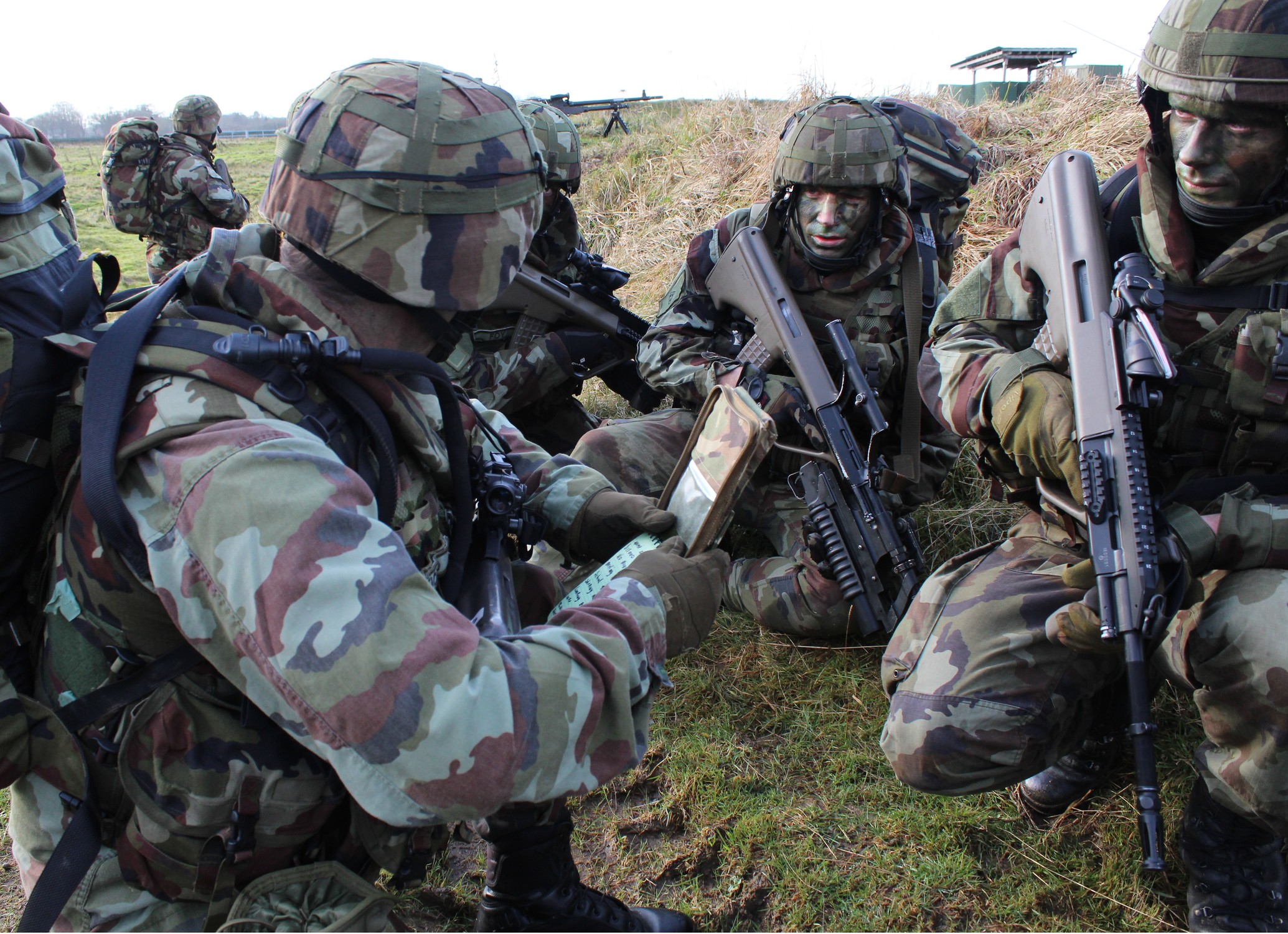
Intent of the Commander: Why, What, and When
The US Army understood after the Iraq War that it could no longer operate by top-down orders as it had in the past. They came to the conclusion that the world had become “V.U.C.A.,” or volatile, uncertain, complex, and ambiguous, in the words of the U.S. military. There were so many variables in a particular situation that there was very little chance of predicting how a military event would play out. They were no longer able to prepare a precise plan for how to practice battle. The military created a new command structure they named “Commander’s Intent” in response. The commanding officer now meets with their direct reports and their direct reports’ direct reports, who are two levels below the commander, anytime there is a new mission or objective. The mission’s “Commander’s Intent,” which is made up of three essential components, is announced by the commander during the meeting.
1. The mission’s “Why”: Why is this goal ours? Why is this mission something we must undertake?
2. The mission’s objectives: What should be done? What crucial occurrences are required for us to declare the mission successful?
3. The mission’s “When”: By what date or timeframe must something be completed?
yet not “How”
You’ll see that the word “how” is absent from the commander’s intention. This is due to the inherent understanding that there are simply too many unknowns on the battlefield to be able to specify how the task should be carried out precisely. Instead, the Army has faith that those already in place are qualified players who can grasp the mission’s goal and carry it out appropriately. In a similar vein, I counsel my clients to show their staff they have their trust by allowing them figure out the how. When we concentrate on the specifics of how our teams work, we are not acting as leaders but as micromanagers. Once a capable team is in place, you should give them the flexibility to complete the task utilizing their own recognized abilities. (As a side note, the only circumstances in which you might manage the how of your team are if you have a young or inexperienced group in place that needs to learn; in those cases, it is your responsibility to demonstrate what needs to be done. That topic will be covered in a later post.)
Pay attention to “Who”
Who receives the message is an important aspect of the commander’s intent. The colonel made it abundantly clear that it was crucial that the message reached two levels of leadership. When the message is not watered down—when as many people as possible have heard it and experienced the details—it is most effective. You need your team to be on board, and the easiest way to do so is to deliver the word to them directly.That’s it. Commander’s Intent: aligning the key players and team members on
How to Win Your Team Over to Your Ideas: The Commander’s Intent
The most effective leaders go beyond simply giving directions to their staff. They encourage them to comply with directives.
Anyone who has managed a team, though, is aware that inspiring that degree of fervor is far easier said than done. In the commercial world, morale always appears to be in short supply. In fact, only 34% of American workers, according to Gallup, feel devoted to, excited about, and active in their jobs and workplaces.
Fortunately, there is a straightforward yet effective communication principle that can raise the spirits on your team and convince them to fully support your ideas. The phrase is “Commander’s Intent.”

Case Study: Utilizing the Commander’s Intent
The “why” behind your work motivates your team to finish it. However, how you explain the aim of your assignment to your team may be just as crucial.
In order to determine when people are most likely to heed a doctor’s advice, two ER doctors did a study in 2019 where they created a fictitious medical scenario.
They informed the subjects they had a fictitious ailment at the start of the trial that caused a painful throat to last for three days and made swallowing difficult. They also informed them that they had a 50% risk of having strep throat.
The following step was to examine whether the sequence in which the information in the recommendation was presented affected the participants’ behavior by dividing the participants into four groups:
• Without providing any explanation, Group 1 received a doctor’s advice not to take the antibiotics.
• Without a specific suggestion, Group 2 was informed of the health hazards associated with the antibiotics.
• Group 3 initially heard the admonition not to take the antibiotics before learning the justification (the health hazards of the medications).
• Group 4 was informed of the potential health hazards associated with taking antibiotics and was subsequently advised against doing so.
At the conclusion of the trial, the doctors found that Group 4 had the highest rate of adherence to their advice. Group 3, Group 2, and Group 1 were the next highest groups.
In conclusion, the majority of patients listened to the doctor’s advice when they were told about the health hazards associated with a particular drug and were advised not to take it.
According to this study, the best strategy for getting your team to support your ideas in the workplace is to first communicate the details that guided your choice—such as its purpose or goal—before making your request.

Utilize the commander’s intent to manage uncertainty
How does your group react when a plan is altered? Does everyone appear to know what to do, or are there signs of confusion, a lack of worthwhile activity, or idle individuals waiting to be instructed? Planning is challenging in both the military and business. Commander’s Intent is a crucial component used by military planners to keep a plan relevant and implementable in a chaotic, dynamic, and resource-limited situation.
The description and definition of a successful mission are found in the commander’s intent. The mission statement, or “5 Ws,” which outlines the who, what, when, where, and why of a mission’s execution, serves as the starting point for military planning. The Commander’s Intent outlines how the CEO (i.e., the commander) sees the battlefield when the mission is complete. It exemplifies what happiness looks like. Commander’s Intent is well aware of the turmoil, incomplete information, shifting adversary conditions, and other important circumstances that could render a plan partially or entirely obsolete when it is put into action. In order for subordinates to adjust the plan to the altered battlefield environment, the commander’s intent must empower them and direct their initiative and improvisation. By defining what a good ending looks like, Commander’s Intent encourages initiative, improvisation, and flexibility. In demanding, dynamic, and chaotic circumstances, the commander’s intent is essential.

Case Study: Example of a Commander’s Intent on the Battlefield
The invasion of France by sea and air on June 6, 1944, known as D-Day, was planned for years during World War II. In order to seize bridges, road intersections, and other strategically important terrain, British, Canadian, and American airborne forces meticulously planned and practiced a succession of glider and parachute landings for months. This would allow the ground invasion forces to march quickly inland. Months of preparation seemed to vanish in an instant when the airborne invasion forces took off from England. Thousands of soldiers from various groups were mingled together in the darkness as parachutists descended into unmarked landing zones, gliders made incorrect landings, and gliders landed in the wrong locations. It seemed like a military catastrophe had taken place. However, only a few hours later, impromptu battalions that encountered much stiffer German resistance managed to achieve the initial military goals. The day had been salvaged by Commander’s Intent. No matter where they landed, leaders and men at all levels recognized that they had to organize into units and seize the bridges and strategic territory. The strategy didn’t work, but the commander’s good intentions and excellent training enabled initiative and improvisation to rescue the mission.

Case Study: Hypothetical CEO Intent Business Example
Planning is crucial at FedEx, which is run by Fred Smith (a former U.S. Marine Corps officer). The first step in a FedEx operation is package pickup at the customer’s location, after which the packages enter a sizable consolidation facility before being transported to their final destination. Once at the destination, parcels are unloaded, brought into the sorting area, and given to a driver to transport to the final address. When you include in traffic, weather, client preferences, financial considerations, safety, customs clearance, and package handling regulations, this procedure that seems so easy becomes really difficult. Therefore, the FedEx plan must change if a snowstorm stops the highways between Denver and Kansas City. The FedEx CEO’s goal is to deliver all packages in a cost-effective, safe manner within the customer-specified shipping window. FedEx officials begin rerouting drivers from Denver to Oklahoma City, adding planes to the schedule in Memphis, acquiring additional truck trailers in Saint Louis, and modifying sorting timetables in Kansas City. FedEx takes the initiative and improvises to modify the schedule in order to fulfill the CEO’s intention of making deliveries on time despite the snowstorm. Similar to a military commander’s intent, CEO intent guarantees a good outcome when business circumstances change.
Military soldiers and employees who are well-trained, self-assured, and committed will help the commander or CEO achieve their goals. To guarantee that the Commander’s Intent is carried out, employees must be aware of the plan and when they must veer from it. When carrying out a commander’s intent, military personnel must use a “Spectrum of Improvisation.” They do not want to alter tried-and-true procedures or other everyday work practices that are a component of the plan and improve operational outcomes while they modify it to fulfill the Commander’s Intent. Business executives should only modify the parts of a plan that need changing; the plan itself is frequently a source of strength. Retaining procedures and frameworks that promote mission excellence while modifying only what is absolutely necessary is the Spectrum of Improvisation.
The development of initiative and improvisational skills is necessary to have a workforce that can carry out the commander’s intent. The training concepts and ideas listed below can help develop an employee’s capability for Commander’s Intent.
1. After-action reviews and simulation training. Businesses need to figure out a means to let staff members practice new product launches, competitor analyses, and shop openings. These simulations can include dynamic changes to the core business environment that will require staff members to adjust individually and collectively to new situations in order to accomplish current business goals.
2. Little Projects. Giving a subordinate or team the authority to try a new project or enter a small, untested market carries low risk to the core business and is a great way to test out confidence, improvisation, and a solid personnel base.
3. Current events, business history, and military history. A thorough knowledge of historical developments offers context, inspiration, and a viewpoint on the importance of improvisation in both history and business.
The definition and outline of what a successful operation will produce is the commander’s intent. Through the use of improvisation, initiative, and adaptation, teams and employees are given the freedom to modify the plan in order to accomplish the original plan’s goals.

Exercise 1.6: Grab bag of inspiration

Course Manual 7: Building Teams
Creating And Assembling Productive TeamS
Although the lone-wolf entrepreneur is revered in history (and in Ayn Rand’s novels), outstanding teams are just as crucial to the success of contemporary corporations. To really grasp this, consider Google, Ford Motor Company, or Walt Disney. Building high-performing teams has grown more crucial for businesses as a result of how digital technologies are changing workplaces.
One of the best models for high-performing teams
The high-performing team model shown in the graph below is taken from Pat MacMillan’s book Performance Factor, where he is the CEO and Founding Partner of Triaxia Partners. One of the better graphical depictions of a high performance team’s model can be seen here. The model has the appearance of a circle, and each element is connected to the others to demonstrate how each is equally important in generating the necessary solutions and getting the greatest possible business results.
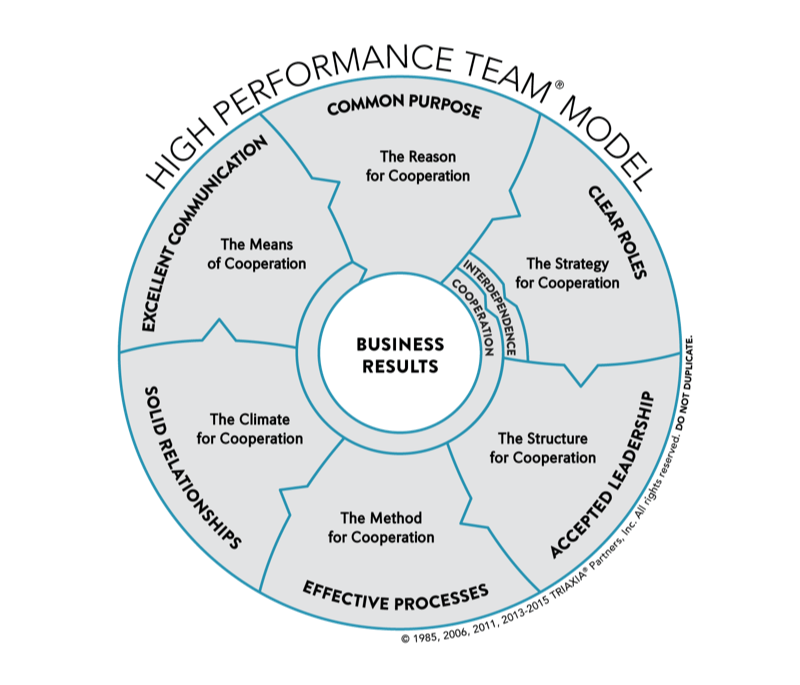
Creating High Performance Teams
According to Reid Hoffman, co-founder of LinkedIn, “No no matter how brilliant your mind or strategy, if you’re playing a solo game, you’ll always lose out to a team.” Building a high performing team is a challenge, even though investors and tech titan executives respect them. This is especially true in a day where technology is constantly changing workplaces.
Here are some pointers for you as a team leader if you want to inspire your group to greater heights and boost worker productivity:
Build a Reliable Team
The basic core of creating effective teams, according to a McKinsey essay by senior partners Scott Keller and Mary Meaney on tested methods to create high-performance teams, is team makeup. They believe that small, high-performance teams are preferable since they are “likely to result in poorer decisions because of a lack of diversity, and slower decision making because of a lack of bandwidth,” but they also warn against making them too tiny.
However, Keller and Meany contend that large teams—those with more than 10 members—are less effective because subteams begin to emerge and foster conflict. The authors emphasize that, in addition to team size, IT team leaders and CEOs should focus on each team member’s complimentary abilities and pro-team attitude as these qualities are crucial to creating and sustaining a high-performance team.
In his article, reputable and credentialed scrum trainer Mike Levison underlines the value of building a solid team. He argued that a stable team should be hand-picked, and once the team is put together, every effort should be made to keep it steady.
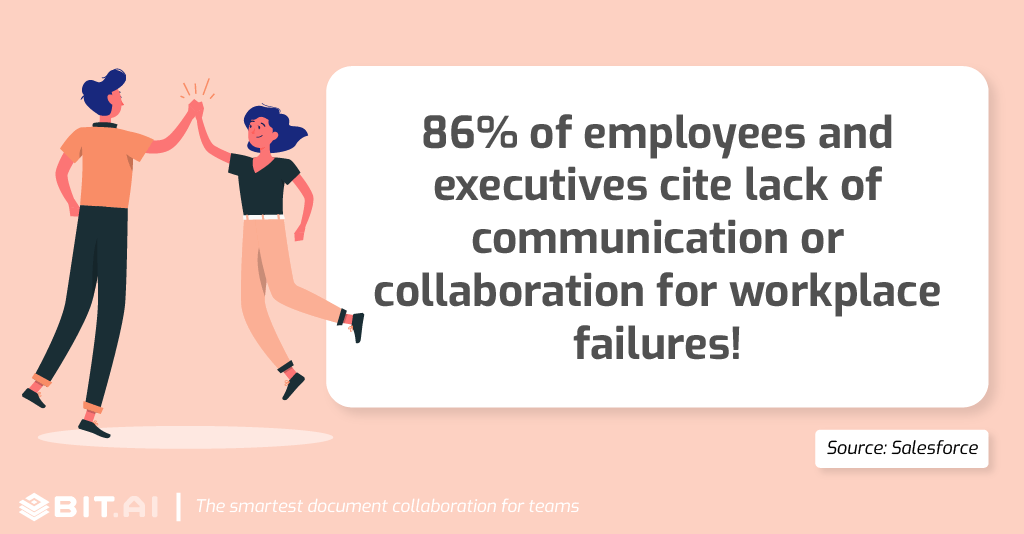
Create a Team Dynamics that is Cohesive and Value Aligned
Francine Katsoudas, chief people officer for Cisco, a company known for its growth and innovation, elaborates on the success elements that motivated a group of high performance teams by stating that “Teams with similar beliefs in where they are headed perform better.”
It is crucial to have a team where everyone gets along and can communicate openly. This occurs when they share the team leader’s values and cooperate to accomplish a common objective. Team members produce more when they begin to think that they can succeed as a unit. The characteristics of a cohesive team—shared ideals, active participation, and mutual trust—increase productivity significantly.
While a cohesive team can produce more and more quickly than other teams, Mike Levison cautions that this team type also runs the risk of being “over-cohesive and vulnerable to group-think.”
If this is let to happen unchecked, it could lead the team to make incorrect conclusions.
In addressing this, the role of the leader is indisputable. Joseph Folkman, author and co-author of 13 books on leadership techniques, emphasizes the value of leaders encouraging team members to stay focused on the vision through continual communication in his Forbes piece on how to create high-performance teams. Be like a “broken record,” he counsels the team’s leaders, and lead them in the right direction.
Encourage an Open Communication Environment
Members of the team frequently hold themselves back from speaking up during meetings because they feel too exposed to do so. As a result of this lack of psychological safety, managers should take care to create an environment that encourages social risk-taking. This kind of team culture will inspire workers, promote creativity, and aid in the advancement of fresh concepts.
Leaders should also be aware of and assess each team member’s individual working style in order to improve the efficiency of a high performance team. To better understand team members’ behavior, personalities, and thought processes, many leaders use team-building indicators like the Herrmann Brain Dominance Instrument, the Myers-Briggs Type Indicator, the Belbin High Performing Teams, etc.
Insist on the Value of Learning
Building a high-performance team requires fostering a culture of continuous learning to deal with the problems of skill shortages and various digital transformations. Emerging technologies in particular are constantly evolving. As a result, corporations place a high value on their staff’ capacity for rapid learning and ongoing skill development. Although there is a lot of learning that happens within a team, improving a team’s skills through training and documentation tools is equally important in creating a high-performance team.
Enterprises are making learning a priority, and many of them are using online learning tools like Simplilearn to give their staff specialized training in cutting-edge technologies. These online training platforms offer courses that are industry-recognized and certified on the most recent and pertinent subjects, assisting both new hires and seasoned IT staff in quickly ramping up. Reputable online education providers that offer corporate training frequently customize their upskilling and training curricula to fit with the business development strategies. These interactive, hands-on learning programs are probably more efficient than simply reading or watching course material on business websites or knowledge bases.
Create a culture that values ongoing learning and development if you want to achieve consistently excellent results. Teams that perform well are intrigued. They enquire, investigate options, and make adjustments in light of what they discover. Teams are more productive, efficient, and innovative when they are constantly expanding their knowledge and learning from their past failures.
Invest in your employees’ personal and professional development to boost team effectiveness. Find appropriate development opportunities that emphasize the requirements and priorities of the team as well as the objectives of the individual. Opportunities for employee development give workers a sense of empowerment, motivation, and improved competence in their work.
The process of creating a high-performing team takes time and effort. The result, however, will be worthwhile if you put together the proper combination of abilities and knowledge and foster these essential traits of a high-performing team.
Set Measurable Objectives
Creating a high-performance team requires setting quantifiable, practical goals with a clear purpose. High performing team members are more motivated, energised, and innovative when they have a clear objective to attain. Their shared goals connect with the defining quality of any high-performance team: getting more done in less time. Such teams maintain a positive and productive atmosphere by providing rewards and acknowledgment for successful work.
Establish a feeling of purpose that everyone shares.
Employees require a common goal in order to feel a part of a team. Here, having clear objectives and a cohesive team are important.
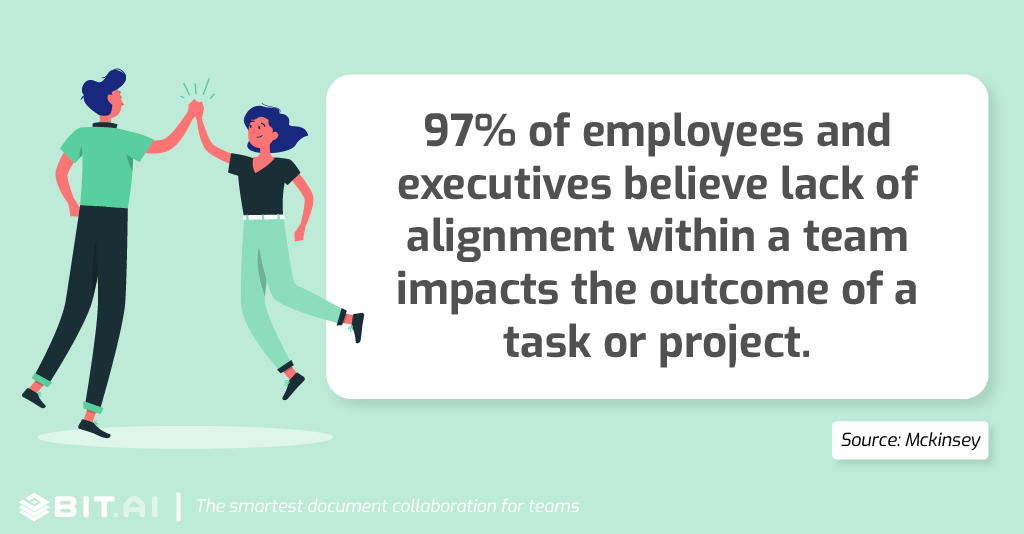
Priorities and team goals are constantly being assessed by managers of high-performing teams to make sure they are efficient and congruent. By often communicating and tying the team’s work to the organization’s goals, you may keep them in the forefront of your mind.
Utilize one-on-one meetings to check in on team members’ progress, identify top priorities, and make sure their work is in line with the team’s overall objectives. This promotes a sense of unity among the team members and guarantees that they are working toward the same goals in order to improve performance.
Improve communication
Teams that function well must be agile and focused, therefore effective communication is crucial. Establish clear communication expectations and procedures to keep everyone on the same page.
Teams might, for instance, use Slack channels for water cooler conversations and team updates but depend on project management solutions like Asana to store project data, specify roles, and monitor assignments and progress.
Establishing clear communication procedures helps avoid conflict and guarantees that important information is communicated with the appropriate individuals, assignments and responsibilities are understood, and nothing is overlooked.

Case Study: 3 Companies With High-Performing Virtual Teams
Here are three companies that have gotten it right.
1. SAP
SAP holds the title of the world’s largest inter-enterprise software company. With more than 30,000 employees in 60 countries, virtual team collaboration is critical to the company’s success. The company has structured itself in a strategic way, with global headquarters in Germany and large R&D centers in India, China, Israel and the United States. Each center has a specific area of expertise it shares with the entire company, which reduces costs. Managers can assemble virtual teams that include employees from each of these specialty groups, making each team more well-rounded.
SAP holds the title of the world’s largest inter-enterprise software company. With more than 30,000 employees in 60 countries, virtual team collaboration is critical to the company’s success. The company has structured itself in a strategic way, with global headquarters in Germany and large R&D centers in India, China, Israel and the United States. Each center has a specific area of expertise it shares with the entire company, which reduces costs. Managers can assemble virtual teams that include employees from each of these specialty groups, making each team more well-rounded.
SAP has also enhanced its virtual team performance by creating an ongoing team-building initiative with the help of an organizational development consulting company.
This initiative began with a training program in which teams worked together to build a community through a blend of online learning, conference calls, briefings, and coaching sessions.
2. IBM
IBM employs more than 200,000 people from different countries and backgrounds. One of the major challenges within a global company of this size is managing time zones.
IBM employs more than 200,000 people from different countries and backgrounds. One of the major challenges within a global company of this size is managing time zones.
Allowing people to work at the hours when they are naturally most productive can boost performance and morale. That’s why IBM reinvented itself to use a Results Oriented Work Environment (ROWE). Employees can live where they want and work in virtual teams based on their own schedules. What holds the workforce together is the use of collaborative software to help workers build trust and enhance communication among team members. IBM uses virtual meeting software and chat tools to enable more collaboration, even as team members work more autonomously during the hours that work best for them.

Exercise 1.7: Moonshot Drill
Elevated impact, a shared vision of influence, aspirational goals, and reasons to believe are all included.
We now provide the Moonshot Drill.
Have Wrong Thinkers come up with the most incredible thing they could possibly do to tackle the problem.
Give each Wrong Thinker three dots. Place dots on the three moonshots that the Wrong Thinkers find most intriguing.
Move the moonshot that received the most votes to the box labeled “The One Amazing Thing We Might Do Together.”
Have Wrong Thinkers explain to people why they will perceive them as crazy for pursuing the advertised moonshot.
Ask Wrong Thinkers to disclose whatever information they have regarding their chances of success that others are unaware of.
Teams may find it difficult to break free of the norm in order to set objectives and envision moonshots. As each team is coming up with moonshot ideas, stop by and give them advice on how to be as ambitious as possible.

Course Manual 8: High-Performance Teams Title
Overview
A group of people with specific knowledge and complementary abilities who are goal-focused, cooperate, innovate, and regularly create superior results is referred to as a “high-performance work team.” Through shared objectives, shared leadership, teamwork, open communication, defined role expectations and group operating guidelines, early conflict resolution, and a strong feeling of accountability and trust among its members, the group constantly pursues performance excellence.
This course manual looks at:
• essential elements for a high-performing work team.
• common phases of team growth.
• causes of dysfunction on a team.
• Primary team types that businesses set up to accomplish particular job objectives.
The paper also makes recommendations for how HR may support teams in achieving high performance. These include selecting the best team members, providing appropriate training, resolving disputes, conducting assessments and outcomes facilitation, and providing compensation and incentives. The article doesn’t address topics like employee involvement and staffing, which are dealt with in the Staffing Management Discipline, or retention-related problems, which are dealt with in the Employee Relations Discipline.
Background
The foundation of modern work life are work teams. Corporations are run by executive teams. New goods and services are produced by project teams. The development of everything from drugs to the provision of services in consulting businesses and nonprofit organizations is assisted by matrix teams. Teams in sales and marketing provide clients with goods and services. The majority of firms must structure and conduct their work using high-performance work teams in order to achieve superior performance, which results in a sizable competitive advantage.
A team is any collection of individuals that cooperate to pursue goals that go beyond their own self-interests; however, not all organizations are teams. The Wisdom of Teams: Creating the High-Performance Organization by Jon R. Katzenbach and Douglas K. Smith provides a brief but clear definition of what “a team” is. A team is defined as “a small group of individuals with complementary abilities who are devoted to a single purpose, performance goals, and methodology, and for which they hold each other accountable.”
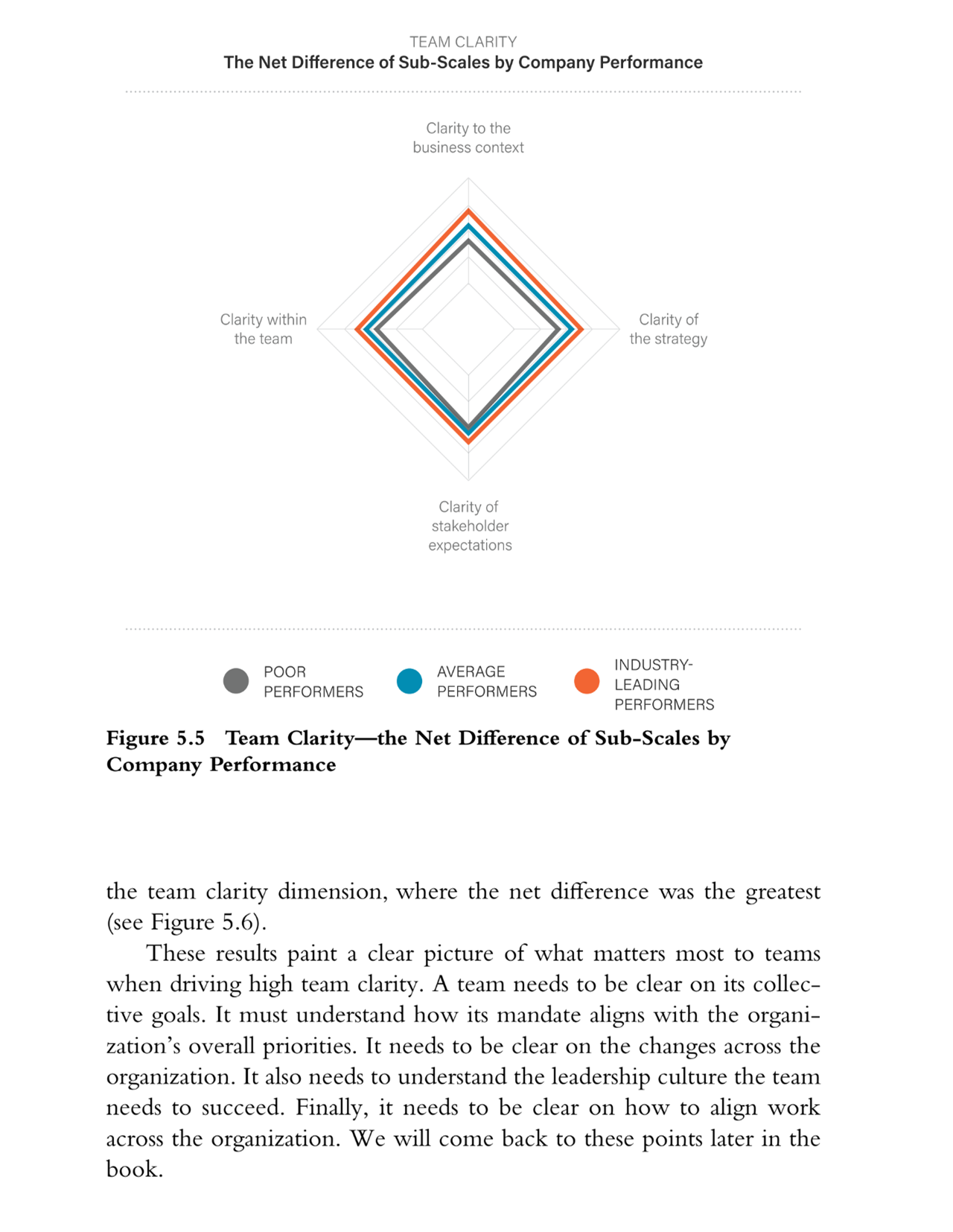
High-performance teams differ from other groups in that they are made up of individuals who go above and beyond the call of duty. In order to work well, a high-performance team also requires:
• a strong feeling of mission and dedication to the team’s members and the goal.
• comparatively loftier performance targets than normal teams.
• Mutual accountability and an understanding of each member’s duties both to the team and personally.
• a broad breadth of experience that enhances the skills of other team members.
• members’ interdependence and mutual trust.
Work teams are frequently utilized in all different kinds of enterprises around the world, and for good reason. Because each team member can contribute unique skills, ideas, and perspectives, high-performance work teams are advantageous over individual projects. High-performance work teams are also empowered, accountable for their functional activity, and responsible for executing strategy, meeting targets, and requiring minimum managerial oversight. The achievement of team and individual goals is typically linked to compensation and incentives, with a stronger focus on collective team performance. These teams do not tolerate marginal and poor individual contributions since excellent team performance is so highly valued.
Enterprise Case
As a result of technology advancements and competitive obstacles, teamwork has drastically increased. Team structures enable the application of a variety of abilities, opinions, and experiences that are best suitable for projects requiring a variety of specializations and problem-solving abilities. Teams are more capable than individuals of carrying out tasks faster, making superior decisions, resolving complicated problems, and doing more to foster creativity and develop abilities. Additionally, using them boosts morale and productivity; effective teams can outperform individuals and even other kinds of working groups.
Teams succeed for the following four main reasons:
• A group of people can do more than one person can alone because of their complementary skills and expertise.
• Teams are more adaptable and sensitive to shifting needs and promote real-time problem-solving.
• Teams offer a special social component to work that improves the financial and administrative facets of it.
• In general, high-performing teams and individuals like their jobs more than those who perform less well.

5 Differentiating Practices of High-Performing Teams
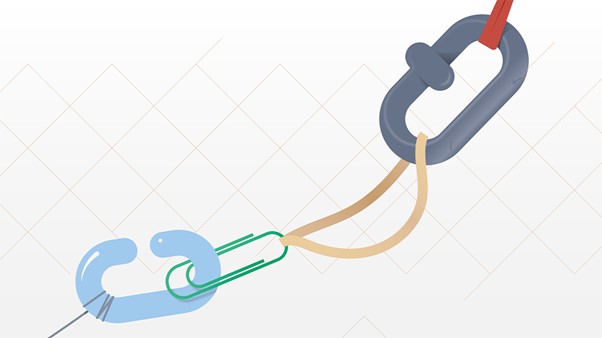
Researchers have long recognized the importance of three psychological needs: autonomy, competence, and relatedness when it comes to creating exceptional workplaces and high-performing teams. Numerous studies throughout the years have shown that people tend to be healthier, happier, and more successful when they feel mentally fulfilled.
The hardest need for organizations to foster is relatedness, or the need to feel linked to others, out of the three basic wants. Finding competent staff is one thing, but how can you get them to get along with one another?
Fostering relatedness has become more challenging as a result of Covid. While being able to work from home has increased personal freedom and given many people more control over their schedules, it has also made it much harder to form intimate relationships with coworkers.
But according to recent studies, the most successful teams have discovered cunning methods to use social relationships throughout the pandemic to their advantage. The results provide crucial information on how any firm may promote stronger connectivity, even in a remote or hybrid work environment, to create teams that perform better.
The team at ignite80 collaborated with Front, a provider of communication software, to conduct a summertime study of 1,106 office workers in the United States. Finding out what high-performing teams do differently was our straightforward objective.
They asked respondents to (1) rate the efficacy of their team and (2) compare the performance of their team to other teams in their industry in order to identify members of high-performing teams. To enable everybody to compare their actions to those of other employees, they classified workers who scored their team a 10 on both items as belonging to high-performing teams.
So what are the differences between high-performing teams? Five significant differences emerged from our study, all of which emphasize the critical importance of intimate relationships among coworkers as a driver of team performance.
High-Performing Teams Are Not Averse to Making Calls
Despite the fact that phone conversations are becoming less frequent in the workplace overall, this is not true of high-performing teams. According to our research, they tend to communicate more frequently overall and are much more likely to call their coworkers than their less successful peers (10.1 vs. 6.1 calls per day on average).
This is logical. According to recent surveys, the majority of people make the mistaken assumption that phone calls will be awkward and uncomfortable. Phone conversations not only don’t make practice any less awkward, but they also often help teams build stronger bonds and avoid misunderstandings, resulting in more productive interactions.
High-Performing Teams Have Meetings That Are More Strategically Planned
It goes without saying that poorly handled meetings decrease productivity, eat up cognitive resources, and lose businesses billions of dollars.
According to our research, high-performing teams adopt strategies that have been proven to promote more fruitful meetings in order to avoid the frequent pitfalls of ineffectively organized meetings. In particular, they are much more likely to introduce an agenda (26% more likely), demand prework from participants (39% more likely), and start with a check-in that keeps team members updated on one another’s progress.
High-performing teams make greater use of their meetings by making sure that time spent together is productive and collaborative. They also create the conditions for more beneficial interactions, which improve relationships.
Teams who do well Spend time interacting on topics other than work.
From a managerial perspective, it’s simple to disapprove of office chats that are unrelated to work. After all, what benefit can be gained from staff members wasting important office time discussing a big athletic event or hit movie?
However, research indicates that talking about subjects unrelated to work has significant benefits. That’s because we discover shared interests in interpersonal interactions, which promotes stronger liking and sincere connections.
In our study, we discovered that high-performing team members are notably more likely to spend time at the workplace talking with their coworkers about things other than work (25% more frequently), including things like sports, novels, and family. Additionally, they had a considerably higher likelihood of having met their coworkers in the prior six months for coffee, tea, or alcohol.
In other words, the greatest teams aren’t better at their jobs just because they work harder. On the contrary, they take the time to engage in meaningful conversation, which leads to later on tighter friendships and improved teamwork.
High-performing teams are more likely to express and receive gratitude.
Because it makes us feel valued, appreciated, and respected by others whose perspectives we value, the urge for relatedness helps us perform better at work. This is why praise frequently serves as a stronger motivator than monetary rewards.
Members of high-performing teams in our survey stated that they experienced more regular recognition at work, including 72% more from their coworkers and 79% more from their superiors. Critically, they also mentioned that they thanked their coworkers more often (44% more), which suggests that in the greatest teams, gratitude doesn’t come from the top down. It is a social custom that is evident in peer interactions.
Teams with High Performance Show More Authenticity at Work
Participants in our study were substantially more likely to share good sentiments with their coworkers when they were on high-performing teams. They claimed to be more inclined to make fun of, compliment, and taunt their teammates. They tended to utilize exclamation points, emojis, and GIFs more frequently in emails.
They were, strangely enough, also more prone to express unfavorable feelings at work. We discovered that they had a higher propensity to complain, yell, and use sarcasm around their teammates.
Why might expressing anger at work result in better job output? It’s because suppressing negative emotions, which is the alternative to expressing them, costs cognitive resources. It entails using up vital cognitive resources in an effort to conceal one’s feelings from others, which leaves less mental energy for working.
Previous research has demonstrated that honesty improves individual performance and workplace wellbeing. According to our research, it also improves team performance.
It goes without saying that there are instances when venting angry feelings at work is neither appropriate nor useful. This research shows that team performance tends to improve to the extent that team members feel psychologically safe to express the entire spectrum of their emotions with their coworkers.
In conclusion, our study’s results indicate that establishing a high-performing workplace requires more than just selecting the best candidates and giving them the tools they need to complete their jobs. It calls for the development of opportunity for real, true interactions.
Creating strong bonds between colleagues doesn’t have to be expensive or time-consuming. Every business has the capacity to feed people’s fundamental psychological need for relatedness and improve team performance by implementing straightforward, evidence-based strategies that result in improved communication, more fruitful meetings, and stronger friendships.

Case Study – The “All Blacks” as a High Performing Team
New Zealand’s national sport is rugby union, also known as rugby in much of the world. The “All Blacks” have won 77.21% of their 566 Test matches, making them the most successful international men’s team of all time (1903- 2017). Rugby has been a professional sport for 20 years (1997–2017), during which time its victory rate increased to 84%. And it increased to 93% during the course of the last four years (2013–17). In October 2003, World Rugby instituted a rating system, and the All Blacks have occupied the top spot ever since. The team won the title of “World Rugby’s Team of the Year” seven times in a row from 2010 to 2016.
Rugby and non-rugby fans alike are familiar with their moniker and distinctive all-black playing uniform. The majority of young people in New Zealand want to play for the All Blacks. In recent years, the All Blacks have been the subject of in-depth research as a High-Performance Team.
On Key Turning Points, Capitalize
Their coach from 2004 to 2011 Graham Henry discussed the value of learning from failure and prior mistakes. These possibilities offer chances to define your individual and group philosophies. Asking two important questions is a simple approach for a team to learn from previous errors:
• What could we have done more effectively?
• What would we change if we could?
Any team’s goals and plans will be made evident by the responses to these questions.
Justify Your Actions
The New Zealand team’s players are urged to take accountability. This is directly related to the principles of “dual management” and “better people make better All Blacks” that we previously discussed. Players feel empowered and take control thanks to this sense of duty.

Exercise 1.8: Shape-Shifting

Course Manual 9: Common Barriers Title
Common Barriers High-Performance Work Teams Face
Common Debriefing errors
During a Debrief
The groundwork for a strong debrief is laid when these prerequisites are satisfied. What must take place during the debrief, then, to optimize its impact? We have studied the debriefing literature and observed a lot of debriefing sessions. Unfortunately, having strong interpersonal abilities and technical proficiency alone are not enough to make someone a successful debrief leader. The success of the debrief depends on how it is organized and facilitated. The best practices listed below can be useful.
Avoid these five typical debriefing traps. A debrief can go off course if it falls into one of a few basic traps. Therefore, it is crucial to avoid the five frequent errors listed below while conducting a debrief.
a) An excessive emphasis on “task work.” Almost every team debrief, when left to its own devices and without direction, tends to focus on a discussion of “task work.” Military strategists concentrate on the capabilities of weapon systems, doctors discuss sickness signs, and programmers discuss coding issues. They don’t naturally mention the challenges with teamwork, which may be the root of some of the taskwork concerns. It’s crucial to remember that leaders are frequently elevated to their positions due to their task-specific knowledge, thus they could feel more awkward discussing teamwork-related difficulties than task-related ones.
Giving the team leader a list of teamwork-related topics to cover during a team debrief is one easy method to address this.
b) Telling rather than debating. We’ve encountered this trap much too frequently. Before asking for the team’s opinions, a leader first shares with the team what he thinks the team has accomplished successfully and the faults the team has made. He doesn’t involve the team in assessing team effectiveness or creating plans of action. Team members are less likely to “own” and commit to those action plans when a leader just informs them of their conclusions and what “has to be done,” and they are also less willing to share any perceptions that differ from what the leader stated.
According to research, learners who are helped to discover who they are have better developmental experiences than those who are just given the right answers.
Ironically, the more knowledgeable the debrief leader is, the more likely they may be to “speak at” the team. If you are leading a debrief, start by posing questions rather than offering solutions. After the team has had a chance to give their perspective, chime in if you come to have a different opinion.
c) Incorrect or insufficient attention. Teams have been known to discuss about uninteresting, “safe,” or non-actionable subjects for 90% of an unstructured debrief. Participating in this type of debrief may be very frustrating, which deters team members from wanting to debrief in the future. Then, in the last few minutes, the critical issues start to surface and the team says something like, “we don’t have time to discuss that today, maybe next time.” Make sure your debrief has “enough” structure, and if the team is beginning to linger on a pointless or “non-negotiable,” assist them in moving on by posing a question regarding an important team issue.
d) A good glance in the past, but no clear look ahead. Some groups have really good conversations on the past while considering a recent event. But because they never switched from looking past to looking forward, the debrief didn’t help them adjust. While reflecting on the past can be intriguing, it’s vital to ask ourselves: “Should we be doing anything different going forward?” at some point. Let’s be explicit about the what, who, when, and how if that’s the case. If not, it’s okay; at that point, it’s usually time to look into a different problem.
e) Too judgmental or frightening. Inadvertently, some leaders turn their debriefing sessions into performance reviews (or court hearings) rather than an opportunity to learn and make quick, informal improvements.They’re more inclined to become defensive, find reasons to justify their actions, and try to explain things away if they think a debrief would be a time for evaluation and judgment (or avoid talking about them). They’re also less inclined to express their opinions and express their concerns. According to research, the accuracy and acceptability of feedback are significantly influenced by the perceived intent of the feedback (developmental or critical).
Therefore, make sure that your debriefings have a developmental tone rather than a critical or evaluative one (let’s figure out who’s to blame for our problems).
Six mistakes that come from a lack of accountability at work
Positive accountability fosters a culture of trust, engagement, and extraordinary performance, as great leaders are aware. When team members can rely on one another, they become committed in the success of the business and feel rewarded for their efforts. Accountability, in other words, is essential for a more productive and content workforce. So how can a company’s performance suffer from a lack of accountability at work?
Unfortunately, your organization will struggle without a strong culture of accountability. Unsure of how to recognize the warning signs? Here are the six signs that your workplace needs more positive accountability:
1. Poor spirit.
Lack of accountability can show itself in a number of ways, but generally speaking, poor and ineffective communication is the root cause of low morale.
The Solution: SPEAK UP. Employees frequently don’t know if their contributions are valued or not, and their managers’ silence on the matter does little to change this. “Chatting it up” fosters a more genuine and collaborative work environment where staff members are treated with respect. Improve your communication skills and frequency. Systematically approach communication by planning check-ins and evaluations. Keep in mind that effective communication fosters a positive attitude about work.
2. undefined priorities
Imagine working on a project and then hearing from your manager that the company’s priorities have changed. You then go back to your project to make changes, only to find out later that management has again changed its priorities. This situation is more typical than you might imagine, despite how irritating and avoidable it is.
The Solution: BE CLEAR. We discovered that “85% of survey participants claimed they weren’t sure what their firms were seeking to achieve” in our Workplace Accountability Study. Successful businesses, in contrast, have two things: (1) a small number of key goals, or Key Results; and (2) a standard by which they hold themselves accountable for consistently achieving these Key Results.
For the entire organization, leaders must choose three to four memorable, measurable Key Results. Every employee in your company should be completely familiar with them so that all priorities and efforts are defined in terms of those outcomes. Avoiding a lack of accountability and being clear work best when everyone is aware of the goal they are always pursuing.
3. declining engagement
It’s essential to reaffirm a sense of purpose if engagement levels are declining, individuals don’t appear invested in their work, or they are disengaging from their teams and colleagues.
The Solution: JOIN THE DOTS. The organization’s employees’ failure to link their daily, individual work with the company’s Key Results is the root of the issue. Make an effort to draw the dots by providing consistent feedback and educating staff about the quantifiable ways in which their work has a genuine impact. A series of ground-breaking new digital tools from Partners In Leadership will shortly be released, enabling employees to measure and understand their actual influence on attaining Key Results and fostering deeper engagement.
4. Execution that is inefficient.
If you aren’t successfully achieving your goals, whether on an individual, team, or organizational level, you undoubtedly have a lack of accountability problem.
Fix: BELIEVE THE GAP. Do you see a discrepancy between expected and actual team- or organization-wide results? Integrate positive accountability to close the gap. First, demand a fundamental rethinking of what accountability actually entails. Accountability is “a personal choice to rise above one’s circumstances and to exhibit the ownership necessary for accomplishing Key Results,” according to the best-selling book The Oz Principle. Positive accountability promotes people and teams, praising them for their accomplishments and motivating everyone to cooperate in order to meet performance goals rather than using punitive or reactive measures.
5. A lack of trust
Negative connections among coworkers and throughout the entire organization are influenced by a lack of trust. Additionally, it could encourage defensive, counterproductive behaviors in workers.
The Solution: MAKE THE WALK. When team members don’t follow through on their commitments, trust is lost. As a result, keep your word and expect others to do the same. Encourage a culture of accountability where each person accepts personal responsibility. High levels of trust are correlated with high levels of positive accountability, and vice versa.

Case Study
Buffer
Social media management platform Buffer’s value statement says that their employees at every level should “default to transparency.’’
Technology plays a big role in keeping their entirely remote organization connected and establishing that level of trust. For example, they use Slack to make real-time communications easy and to streamline workflow.
Slack simplifies communication by providing channels that allow employees to organize all of their conversations. It’s a great tool to keep employees engaged, even when they’re off-site.
Buffer also uses a transparent email system. Every employee can see their co-workers’ emails, which keeps everyone in the loop.
Employees create various internal email lists that are specific to their teams, and every email sent is distributed to all relevant list recipients. This way, any employee, even if they’re not directly looped into the conversation, can search with keywords through lists to find any other applicable conversation.
To avoid an overflowing inbox, they use Gmail’s advanced filter options and labeling. This allows them to block irrelevant messages and optimally organize conversations.
This system holds everyone to a higher standard of honesty and productivity. Every team member can see where projects are tied up and who is moving processes along seamlessly. It also creates a culture where helping out is the norm because it enables everyone to work together.
Let’s say an employee needs to leave for a family emergency. A colleague can easily jump in to help with a time-sensitive project. They have chains of emails to access, making it easy to pick up on where the project is and what is needed to complete it.
Leadership even offers free, unlimited Kindle books and hosts monthly book clubs through Zoom, a video conferencing tool. This allows employees to build rapport and share ideas. And when your staff connects on a deep level, they’re more likely to trust one another.
Many employees praise Buffer’s transparent workplace culture, which is why their Glassdoor page shows a 4.5-star rating. But this is a much higher level of transparency than most companies use.
Their extreme transparency policy shows that their leadership team wants their employees to trust them and their colleagues, and it is the cornerstone of their strong workplace culture.
Having a team that is fully remote requires technology to drive business results. Buffer takes it one step farther—they use technology to intentionally connect with one another on a human level. They achieve this through practices like video chatting and internal newsletters that share fun facts about employees.
They also use technology is used to encourage autonomy, not micromanagement. As Hailley Griffis wrote on the Buffer blog, “Everyone at Buffer has to deliver on their goals according to what needs each team has. Their output is a sign of their work, and consistent output increases trust with managers.”
6. High turnover
Last but not least, but undoubtedly important, high turnover rates are frequently brought on by ambiguous expectations and a general feeling of tension between management and workers.
The key message is that while you can’t always change bad circumstances, you can always change who you are. You can rise Above The Lin” into a different attitude by proactively taking the steps to positive responsibility – See It, Own It, Solve It, Do It.

Exercise 1.9: Blind Drawing

Course Manual 10: Creating Culture
Mission command is much more than a way of thinking or a role in combat. Every facet of organizational activity, from regular staff meetings and field training to actual combat operations, is infused with this culture. This culture’s foundation is a contract of trust and respect between superiors and followers. There is no gray area; a unit must either have this contract or it must not. Specific duties are owed by leaders and those they are in charge of to one another and the group as a whole. A atmosphere of trust where sensible risk-taking and experimentation are encouraged and decentralized execution is the norm comes at a price that all stakeholders must be willing to pay. Although the arrangement is frequently chaotic, it is essential for a unit to develop and preserve a mission-command culture.
Mission command is described in Army doctrine both as a concept and as a distinct warfighting function, yet neither of these terms is sufficient on its own. A philosophy is often thought of as a theoretical pursuit that focuses on a person’s innermost motives and style of thinking. While having the proper attitude is crucial for mission leadership, there must be a clear connection between a leader’s thoughts and his outward behavior. Despite the sophisticated terminology employed in its definition, calling mission command a warfighting function misses the mark because it implies that some tasks fall under the purview of mission command while others do not. What the Army truly wants to accomplish is the dissemination of mission-command concepts in personal attitudes, behavior, and organizational standards. In essence, a culture of mission command is what the Army really wants.

A requirement is trust.
A relationship of mutual trust between superiors and followers must exist for such a culture to develop. This trust can only be earned over time by an organization’s clear and consistent demonstration of its commitment to mission command principles in all that it does. Subordinates will be less likely to have a high degree of faith in a leader if these principles don’t appear to be being applied to even one type of organizational activity. Mission command is therefore an all-or-nothing situation. For instance, it is unrealistic to expect subordinates to act with disciplined initiative in the field from a superior who micromanages the unit while in garrison. Half-measures are immediately detected by subordinates, and they change their behavior accordingly.
Zeal, however, cannot trump good reason. A dedication to mission command does not imply a hesitation to issue specific instructions when necessary. The most effective decentralized operations practitioner is aware of when more detailed instructions are necessary, and a smart leader is not afraid to give them. A leader who is dedicated to mission command, however, understands that these circumstances are the exception rather than the rule. As a result, the leader spends time explaining to subordinates why they are departing from missioncommand principles in the particular circumstance. Such justifications—along with a prompt restoration to regular operations—ensure that the trust relationship is maintained.
Think of a two-part contract between leaders and subordinates to comprehend what mission-command culture is and what accomplishing it entails (Figure 1). This concept was first put forth by William S. Lind, author of the Maneuver Warfare Handbook, as a means of comprehending the particulars of mission orders. But when his idea of a contract between superiors and followers is applied to an entire unit’s organizational culture, it becomes more useful. Like other contracts, this one is a voluntary agreement with very clear fees and obligations. Leaders and their subordinates will not be able to function within (or contribute to) a mission-command culture if they are unwilling or unable to fulfill these commitments or to cover the accompanying expenditures.

By defining how the parties engaged are required to regard themselves, other members of the team, and their place within the business, the first section of this contract establishes the long-term context. Leaders must remember that they are only the current custodians of a group that has a proud history that predated them and will live on long after they are gone. This promotes self-awareness and the desire to make a good impact on the history of the unit. By treating subordinates as “apprentices” for roles with greater responsibility, you can make a contribution. Just preparing them for their existing responsibilities is insufficient. As a legacy for the future, the leader must instead assist in the professional and personal development of each member of his team. To match what the leader is investing in him, the subordinate is required to devote to his own self-development.
The immediate and concrete representation of the long-term agreements previously outlined is fulfilling the short-term requirements of the mission-command contract. Success depends on the leader’s ability to provide subordinates valuable instructions that they can utilize to create their own plans for completing the objective and to make quick judgments when the circumstance demands it. The bare minimum of instructions on how to perform tasks must be given by leaders, who want their followers to display disciplined initiative and creativity while adhering to their intentions. It’s important to accept genuine mistakes made along the way as long as people learn from them and develop as a result. Such top-cover does not include transgressions of the law, morality, or ethics. Errors committed with good intent and in the sincere pursuit of the assigned goal are a natural price of creating and upholding a mission-command culture.
This contract carries risk inherently. Leaders must be willing to embrace the possibility that subordinates will make errors that cause temporary setbacks. These failures might temporarily cost the leader (and possibly the unit) some respect, but the long-term benefits are well worth it. These benefits include empowered subordinates who respect their leaders and perform well in environments that call for self-disciplined initiative and decentralized management. Leaders who have not defined success as producing the next generation of adaptable Soldiers, noncommissioned officers (NCOs), and officers are inappropriate for their positions because they lack a zero-defect mentality or a motivation for personal promotion. Even if they observe a peer making more choices centrally and punishing others who experiment in an effort to take advantage of an opportunity, leaders must avoid the urge to break the agreement.
Results obtained by micromanagement or toxic leadership techniques are almost always fleeting and harmful to the team’s morale and long-term health. They undermine trust and do not establish the environment necessary to encourage the initiative required to defeat a thinking enemy at the point of contact. Similar to this, a subordinate who has the guts to take initiative won’t be able to fully win over his superiors. Team members must acknowledge that short-term failures will ultimately lead to greater success because of the lessons learned and the resulting professional development.

It is challenging to determine the precise details of how to carry out this deal. Because every scenario is different, there is no one “correct” response to developing a mission-command culture. However, focusing on observable signs makes it possible to evaluate progress (Figure 2). The majority of these indicators are “outputs,” i.e., actions or orders imposed by higher headquarters, but almost none of them are. Instead, they are descriptive results that anyone with the desire to look and listen may see at all levels. A leader has access to a variety of instruments to aid with evaluations, but for the majority of these indicators, all that is needed are the leader’s eyes and ears. More information will be revealed by asking targeted questions to the right person or group at the appropriate time than by even the most thorough PowerPoint lecture. Seeking direct touch with the Soldiers, NCOs, and junior officers within those units is the only way to learn the truth about what is taking place inside subordinate formations. When building a mission-command culture, unscripted encounters and concentrated observation are the keys to figuring out where a unit really stands.
The Promotion of Accountability
The ideal culture is one in which individuals take great ownership in thinking and acting in ways that will help the organization achieve its goals. This type of culture is distinguished by its emphasis on voluntary individual accountability. They eagerly take responsibility upon themselves rather than having it thrust upon them.
That’s true, they are neither required to answer for their activities nor are they monitored until they are “called to account” for them. People at every level of the organization are individually committed to accomplishing the main outcomes intended by the team or organization in a culture of accountability, and they never wait to be asked for a status update or a follow-up plan. Instead, because they have internalized their commitment to attaining achievements, they report proactively, follow up frequently, and meticulously assess their own progress. Their guiding principle, “What else can I do to attain the desired results?” inspires them to constantly seek out solutions, create them, surmount challenges, and win over any adversity that may arise. And as you can anticipate, everyone is liable for the outcomes.
Because people continually drive organizational success, individual fulfillment, and the development of true value, fostering an environment of accountability will have a significant impact on outcomes. However, getting there is more of a continuous trip than a final destination. To develop and preserve such a culture, leaders must continuously work with everyone else in the organization. Take into account this story from one of our clients about their efforts to create a culture of accountability. Every year, the “Women’s Boutique,” a nationally known chain, held a women’s suit contest, a four-week sales promotion with an internal competition. Because neither Susan nor her supporters thought they could sell suits in Nevada, let alone in this economy, their district, which consisted of ten retail businesses, had consistently placed last in the competition. Susan finally awoke when a new regional manager informed her that district managers may be classified as either “owners” or “renters,” and that she was a “renter.” She came to the conclusion that her inability and unwillingness to persuade the residents of her area to accept responsibility for obtaining the intended results had contributed to her failure to live up to expectations. She persuaded her store managers that their collective justifications were keeping them from attaining better results by committing to greater personal accountability. They made a joint commitment to accepting and practicing the Four Steps to Accountability: See It, Own It, Solve It, and Do It.

Case Study
Targeting the annual women’s suit contest as a sales event they all needed to own, Susan and her store managers became relentless in asking, “What else can I do to get the result?” Susan visited each store to provide coaching and assis¬tance as store managers hosted VIP parties to get their people and preferred customers excited about the contest. They installed “Think Boxes” in every store, giving people a way to share their ideas about what else could be done to increase sales. People throughout the district quickly became engaged in thinking up new ways to draw more cus¬tomers into the excitement, coming up with ideas such as offering customers the opportunity to win a Fossil Watch or a second suit for a penny. As Susan continued to meet one-on¬-one with her store managers, they became more accountable for results. Four weeks later, when the suit contest ended, Susan’s district finished in first place. Her regional manager congratulated her on making the move from an entrenched “renter” to a solid “owner” of the business. She was even invited her to speak at a companywide conference about the transformation she had engineered in her district, “A lot of you know me. I’ve been with the company for twelve years and I have never been the number one district in anything before. What changed for me this year was I applied what I learned about how to help people take accountability, and it totally changed my life.” During the next three years, Susan’s district rose from the bottom 20% of the company’s 90 districts to the top 20%–further evidence that a Culture of Accountability is the best kind of culture for creating sustained results.

Exercise 1.10: Hold The Rope

Course Manual 11: Accountable Leaders Title
The Demand For Accountable Leadership Is Imperative
“It’s Not About You,” – Burg and Mann
Success in business depends on accountability in leadership, but many leadership teams recognize that they still have a long way to go in this area.
72% of company executives and HR experts think that responsibility is essential for corporate success, according to a global study coordinated by leadership accountability specialist Vince Molinaro. Only 31% of respondents are content with the degree of leadership accountability they observe in their own businesses, though.
Why is leadership responsibility so critical to the success of the company, and why do so many leaders find it so difficult to uphold accountability?
The remainder of the organization will follow the example that the leaders set. Employees feel helpless and lost without responsibility from top-level leaders and middle managers. In order to promote team performance, it is essential for leaders to develop responsibility, alignment, and focus throughout their teams.
However, a lot of businesses lack the cultural framework needed to clearly define what is expected of leaders. Individuals in leadership positions lack a leadership model to which they may be held responsible if the company’s expectations for leadership are not clearly stated. At a time when alignment is more crucial than ever for company success, this leads to fragmented leadership.
To close the loop between strategy, people, and results, businesses require great leadership. Here’s how your business can embrace leadership accountability.
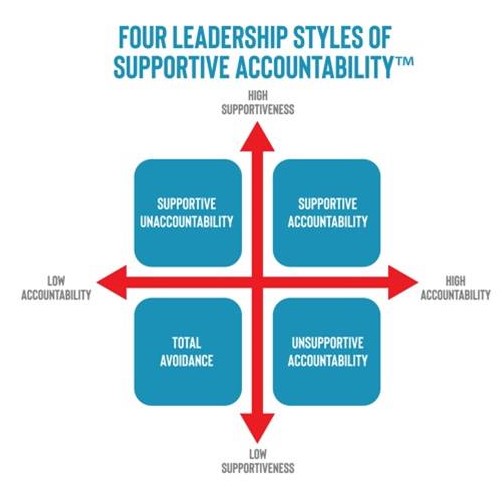
What Exactly Does It Mean for a Leader to Be Accountable?
The importance of leadership accountability in the workplace is often undervalued yet is a vital part of a positive culture. However, what exactly is an accountable leader and how can they influence company outcomes?
The word “accountability” implies that managers must answer to someone or something. Accountability is measured in a variety of ways. The first is business performance, which is what most businesses value most. However, in addition to being answerable to the workforce, leaders must also be accountable to the corporate culture (defined goal, vision, values, and purpose).
Leaders must be dedicated to the company and its employees in order to be held accountable. In order to foster trust among team members, they must take their responsibility as people leaders seriously. Accountable leaders make their teams aware of their goals, objectives, and key outcomes (OKRs) in a clear and concise manner to promote team focus and alignment. When something goes wrong, they take responsibility for it and give success its due credit.
Accountable leaders also evaluate the amount of accountability in those beneath them. For instance, top-level leadership must hold middle managers responsible for their own dedication to the company’s operations, employees, and corporate culture. By dealing with unaccountable executives, they establish expectations for accountable leadership inside the organization.
By training teams to think critically about the needs of the firm and how they may maximize their contributions, accountable leaders help promote team accountability. Owning mistakes is a crucial component of accountability and the first step in continuing to move forward while learning from inevitable missteps.
What Justifies Accountability in Leadership?
For businesses to stay on course, especially in a volatile and uncertain work environment, leadership responsibility is essential. To maintain staff alignment with the corporate plan across the board, there must be strong accountability at the top.
Accountability for both people and culture is crucial since they both play crucial roles in generating company results. The entire corporate culture suffers from a lack of responsibility, which lowers employee morale and deters them from working hard.
Employees may feel detached and feel like leaders are only there in name. If people notice that leaders are getting paid more while failing to keep their teams united and going in the correct direction, they could grow resentful.
A well defined set of roles and responsibilities should accompany becoming a leader at your organization. Utilize leadership mentorship programs to increase responsibility. To assist keep them on track, middle managers should have a mentor in a higher-level leadership position. Top executives should have a mentor or executive coach to help their personal development.
Your company can only advance when all of its leaders are accountable and in alignment.
Three Components of an Accountability Culture
Culture has a significant impact on how leadership is defined and how accountability expectations are established. Strong leadership cultures that promote accountability must be fostered by leaders. This aids in establishing leadership development expectations.
Here are three crucial components of an accountability culture that you can promote in your business.
solid corporate values
All employees should base their decisions on your company’s ideals. Ensure that staff members are aware of your company’s values and how they apply to their particular roles. To establish and maintain an environment of responsibility, everyone must understand and uphold the company’s principles, not just the executives.
Leaders will feel more pressure to act in accordance with those values if all employees can see those values being lived out, or when they are not.
a clear leadership paradigm
Although many businesses fail to establish clear expectations, leaders need a defined leadership model to which they may be held accountable. They instead anticipate that people will pick up on hidden leadership expectations. However, this frequently leaves leaders to fill in the gaps with their own personal experiences, leading to a number of conflicting conceptions of what constitutes strong leadership within your organization.
Programs for developing leaders should outline what constitutes leadership inside the organization and establish standards for conduct.
Team responsibility
By definition, team accountability depends on establishing clear expectations for team members in terms of workflows, procedures, and output. People are more likely to fulfill or surpass deadlines and improve overall performance for the company when they feel held accountable to others.
High performance will result from accountability exercises inside the team, such as clearly defining expectations.
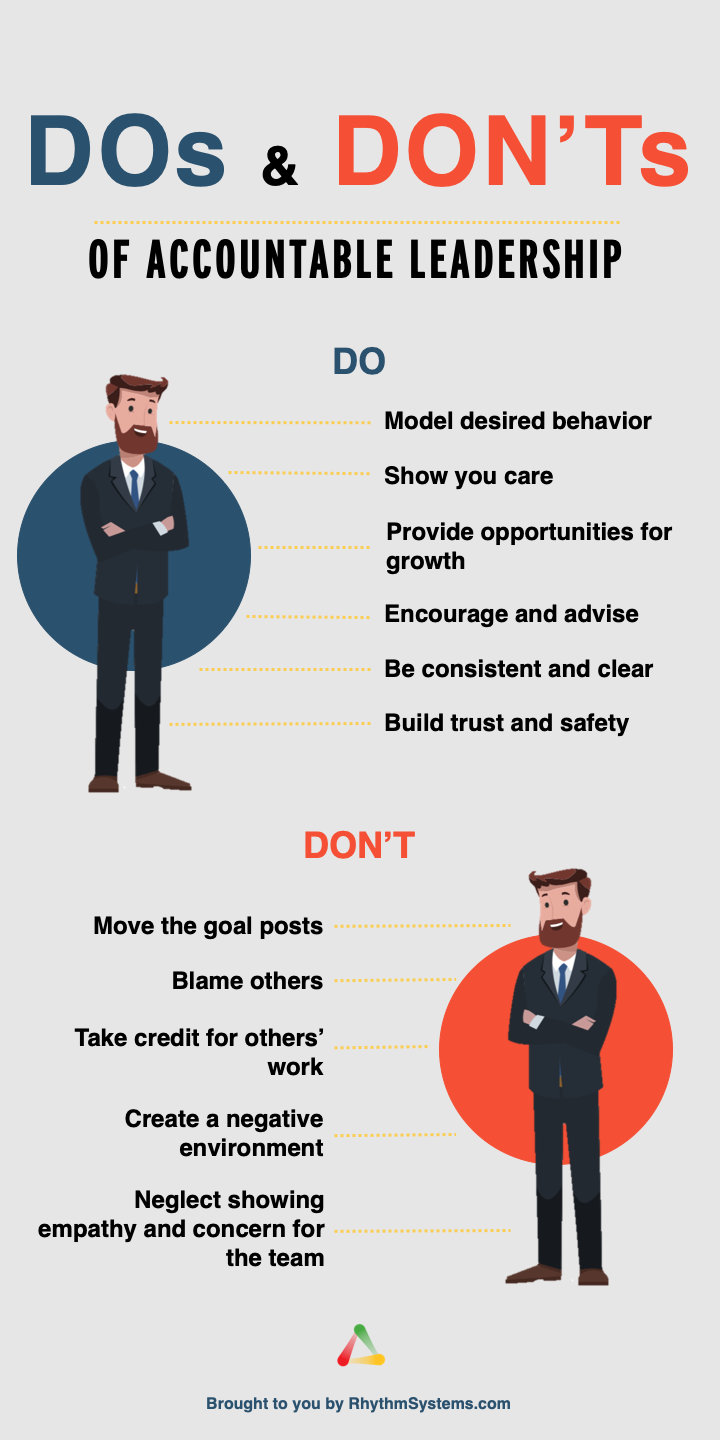
How OKRs Can Encourage Accountability in Leadership
To hold people responsible for their work, you need a clear structure. OKRs offer a framework for establishing both corporate and personal objectives. Better accountability is supported by that structure for both leaders and individual contributors.
Running an OKR program requires managers to be deliberate in their goal-setting and open with their team members. Three elements make up OKR governance:
Accountability
Setting OKRs requires two-way communication in order to promote responsibility. The corporate strategy and priorities must be established by the executives, but employees should have the freedom to choose their own objectives. To ensure alignment, this calls for a meeting point between the two sides. The responsibility for coordinating the goals of their subordinates with the overarching business plan rests with the leader.
Accountability is crucial for learning from the experience of achieving predetermined goals. Leaders need to be able to guide their teams through what worked and what didn’t, and explain why, at the end of each quarter. To diagnose issues and address them going forward, everyone involved must be willing to accept accountability.
Alignment
The process of vertical alignment between people and the business is driven by accountable leaders. However, horizontal alignment is also important. The term “horizontal alignment” describes alignment between teams or departments.
Document dependencies as you set OKRs. When a goal is shared among teams or departments that don’t typically collaborate, it must be very clear from the start who is in charge of what parts of achieving the goal. To encourage responsibility and to promote greater communication and openness throughout this process, designate a clear owner.
Focus
Without enough concentration and dedication, OKRs won’t be accomplished. Prior to leaders communicating with their staff, organizations must clarify their goals. The second step is for people to commit to their goals, which calls for specifying clear and well-considered important outcomes.
Accountability is crucial in this case as well: People must feel responsible for their own OKRs, but leaders must set the standard. To ensure that employee objectives are being met, think about designing an OKR template. The form should specify OKR ownership so that each employee is aware of their quarterly goals.
By putting individual OKRs in the perspective of the bigger picture, OKR software can assist provide another layer of accountability. Individuals can stay focused on accomplishing their goals by understanding how their OKRs fit into the bigger company priorities that comprise their individual ambitions.

Case Study: Southwest Airline
Let’s examine Southwest’s dedication to accountability. The 2020 grounding of the 737 Max had significant financial ramifications for both Boeing and the airlines that are its clients. Boeing indicated shortly after the grounding that it would reimburse customers for damages brought on by the FAA’s decision. Southwest reported losses of more than $800 million incurred in 2019 as a result of their inability to operate the 737 Max. Southwest has received compensation from Boeing for those losses.
This is the key accountability lesson. When asked what should be done with this Boeing compensation revenue, Southwest CEO Gary Kelly responded right once that he was “looking at ways to distribute proceeds as appropriate with all of our employees.” Kelly congratulated staff members for their handling of the groundings on several occasions during an earnings call, and he and the board were “delighted” to include staff in profit-sharing even if the Boeing settlement money didn’t precisely fit the definition of “profits” for that purpose.
Think about that for a minute.
One of the biggest US airlines’ CEO started his response to this problem by considering how best to distribute the compensation payout his firm received to each and every one of its employees. As of the time of writing, the Boeing payment to Southwest has gone entirely to the profit-sharing program for the staff. In action, this is accountable leadership.
Southwest is renowned for having a great workplace culture, and this is no coincidence. It is the outcome of important pledges made by leadership to the employees who come to work every day. One of the fundamental obligations of accountable leadership is a complete, unconditional commitment to the tenet “It’s all of us,” as I have already stated. When this pledge is kept, leadership acts in a way that effectively communicates the ideas that “I only succeed if you succeed” and “we are all in this together.” As a visit to Boeing’s website devoted to its core principles demonstrates, those sentiments are simple to express. But to follow through on them requires unwavering character, work, and discipline. These characteristics define responsible leadership. And these, in my opinion, have set Southwest’s leadership apart from Boeing’s.

Exercise 1.11: Communication: Coach the Builder

Course Manual 12: Team Dynamic
The makeup of the team’s members is one of the key factors that determines how well a team performs. A high-performing team is made up of various team members who have developed mutual respect and understanding. However, it’s not always simple to recognise the valuable contributions that various team members make to the success of the group. Additionally, it’s possible that other team members are unaware of your contributions to the team’s success and the role you play within it.
You can work together as a team lot better and truly understand the saying “teamwork makes the dreamwork” if you have an understanding of the various team member types on your team. It may be extremely simple for everyone to start functioning better as a team after you get to grasp the various talents, personality types, and communication styles of you and your team members.
The management of a high performance team requires a number of factors, but for the sake of this discussion, let’s focus on the personalities of the team members and how they interact.

Case Study: General Electric
GE employs more than 90,000 employees throughout the world.
Facing the challenges of communicating effectively across a global workforce, GE invested in training its leaders and employees.
Through a virtual classroom, employees learned how to collaborate to achieve common goals with interactive e-learning and quizzes on foundational virtual teamwork concepts. Training was made more interactive with virtual breakout rooms, polls, whiteboards, games and role-playing scenarios.
Personal feedback helped determine strengths and weaknesses for each participant and identified ways to enhance performance.
Training programs like these can transform a workforce. GE’s virtual leaders also receive specific training that addresses cultural differences, an important aspect of effective virtual leadership training in a global setting.
Five Different Team Members
There are numerous models for comprehending various team member types. Several well-known examples include;
• Belbin’s Team Roles: Resource Investigator, Monitor-Evaluator, Shaper, Implementer, Completer/Finisher, Coordinator, Team Worker, and Plants
• The 16 Myers-Briggs personality types are determined by evaluating individuals on four different dimensions.
• One Minute Millionaire’s HOTS Teams: Hare, Owl, Turtle, and Squirrel
But times have changed, and all of these models are now rather obsolete. Here is a new list of team jobs and personality types that the majority of us can identify with. All of these positions should be present in some capacity in order for teams to function effectively. Keep in mind that, especially in extremely small teams, it is feasible for one person to really fit and identify with more than one function.
What then are the various team personas? See below:
1) The Creative Spark
The team’s ideas come from The Creative Spark!

Support for Team Performance
The Creative Spark is excellent at thinking outside the box and is constantly seeking out new, creative approaches to problems. On any team, having this ability is crucial because not many people do. This team member is a great addition because of their innovative ideas, upbeat outlook, and dedication to improvement.
Issues with the performance of the team
If projects take too long and there isn’t enough stimulation, the Creative Spark may get bored. Additionally, they struggle with details, which occasionally makes their work appear sloppy.
Team management advice: Ensure that these team members’ creative demands are addressed, if necessary with additional initiatives outside of their main responsibilities. Offer guidance and checklists for quality control.
2)The Dynamic Producer
The team’s workhorse is the Productive Dynmano.

Support for Team Performance
The Productive Dynamo is driven to complete tasks and takes pleasure in reaching objectives. While others talk about something, they are actually doing it. This team member puts forth a lot of effort and is capable of handling any challenge. Every successful team needs a Productive Dynamo on staff!
Issues with the performance of the team
The Productive Dynamo may occasionally become so preoccupied with their work that they neglect to inquire sufficiently or query whether a task even has to be completed. They may invest a lot of time in things that do not necessarily need that kind of care. Additionally, if their workload is not adequately managed, they risk burning out.
Coaching this team member to prioritise and triage their work is a good team management strategy. If they feel like they have too much on their plate, tell them to let you know.
3) The team’s driver
The squad’s unifying factor is the team driver!

Support for Team Performance
The team driver keeps everyone on schedule, organised, and unafraid to follow through. This team member excels at leading meetings and setting up procedures that keep things operating smoothly. Working as a team is really challenging without the Team Driver on board!
Issues with the performance of the team
Team drivers can lose sight of the greater picture because they are too preoccupied on the team’s procedures. They might not be as understanding of team members who operate more haphazardly.
Encourage this team member to appreciate the value that various sorts of team members can contribute to the group. Keep this team member informed of the overarching objective and have a clear team or corporate vision.
4) The Intellectual Powerhouse
The team’s brains are located at the Intellectual Powerhouse.

Support for Team Performance
Everyone looks to the Intellectual Powerhouse to discover a solution and fix the issue when something goes wrong. They have a sharp analytical mind and know a good idea when they see one. The team greatly values the uncommon and highly specialised skills of this team member.
Issues with the performance of the team
Though bright, the Intellectual Powerhouse frequently behaves erratically. They are frequently perceived as being negative because of their fervent desire to criticise ideas and other people’s work.
By pairing up this team member with a teammate for a project, for instance, you may help them comprehend the value that other team members bring to the table. Even though they are frequently reluctant participants, team building exercises are quite helpful for this sort of team member.
5) The Maven Influencer
The team promoter is the Maven Influencer.

Support for Team Performance
The Maven Influencer uses their connections and influence to get around obstacles and win the team support from the outside. They are aware of what matters and are continuously considering the big picture. This team member has excellent communication skills and is a motivated and occasionally entertaining resource for the group.
Issues with the performance of the team
Maven Influencers tend to follow their own path and dislike having to follow a lot of team procedures (and may choose to ignore them). They have a lot of ideas, but occasionally they need to be greatly refined because they are not always useful.
Managing this team member can be challenging despite their crucial importance. Be explicit about the team’s goals and KPIs as well as each member’s responsibilities. Keep your attention on these.

Exercise 1.12: Team Accountability Exercise
Compassion, composure, creativity, integrity, and trust. Analytical skills, business acumen, leadership, prioritization skills, problem-solving skills, strategic agility, and teamwork.
• Salary and benefits
• Research and discovery; learning and development; helping others; making a difference in the world; fame and recognition; and resolving challenging issues.
• Work-life balance; teaching and mentoring
Project Studies
Project Study (Part 1) – Customer Service
The Head of this Department is to provide a detailed report relating to the Introduction to DTW process that has been implemented within their department, together with all key stakeholders, as a result of conducting this workshop, incorporating process: planning; development; implementation; management; and review. Your process should feature the following 12 parts:
01. Understanding Accountability
02. Accountability Roadmap
03. Pre-Assessment
04. Debriefs Explained
05. Mission Command
06. Commander’s Intent.
07. Building Teams
08. High-Performance Teams
09. Common Barriers
10. Creating Culture
11. Accountable Leaders
12. Team Dynamic
Please include the results of the initial evaluation and assessment.
Project Study (Part 2) – E-Business
The Head of this Department is to provide a detailed report relating to the Introduction to DTW process that has been implemented within their department, together with all key stakeholders, as a result of conducting this workshop, incorporating process: planning; development; implementation; management; and review. Your process should feature the following 12 parts:
01. Understanding Accountability
02. Accountability Roadmap
03. Pre-Assessment
04. Debriefs Explained
05. Mission Command
06. Commander’s Intent.
07. Building Teams
08. High-Performance Teams
09. Common Barriers
10. Creating Culture
11. Accountable Leaders
12. Team Dynamic
Please include the results of the initial evaluation and assessment.
Project Study (Part 3) – Finance
The Head of this Department is to provide a detailed report relating to the Introduction to DTW process that has been implemented within their department, together with all key stakeholders, as a result of conducting this workshop, incorporating process: planning; development; implementation; management; and review. Your process should feature the following 12 parts:
01. Understanding Accountability
02. Accountability Roadmap
03. Pre-Assessment
04. Debriefs Explained
05. Mission Command
06. Commander’s Intent.
07. Building Teams
08. High-Performance Teams
09. Common Barriers
10. Creating Culture
11. Accountable Leaders
12. Team Dynamic
Please include the results of the initial evaluation and assessment.
Project Study (Part 4) – Globalization
The Head of this Department is to provide a detailed report relating to the Introduction to DTW process that has been implemented within their department, together with all key stakeholders, as a result of conducting this workshop, incorporating process: planning; development; implementation; management; and review. Your process should feature the following 12 parts:
01. Understanding Accountability
02. Accountability Roadmap
03. Pre-Assessment
04. Debriefs Explained
05. Mission Command
06. Commander’s Intent.
07. Building Teams
08. High-Performance Teams
09. Common Barriers
10. Creating Culture
11. Accountable Leaders
12. Team Dynamic
Please include the results of the initial evaluation and assessment.
Project Study (Part 5) – Human Resources
The Head of this Department is to provide a detailed report relating to the Introduction to DTW process that has been implemented within their department, together with all key stakeholders, as a result of conducting this workshop, incorporating process: planning; development; implementation; management; and review. Your process should feature the following 12 parts:
01. Understanding Accountability
02. Accountability Roadmap
03. Pre-Assessment
04. Debriefs Explained
05. Mission Command
06. Commander’s Intent.
07. Building Teams
08. High-Performance Teams
09. Common Barriers
10. Creating Culture
11. Accountable Leaders
12. Team Dynamic
Please include the results of the initial evaluation and assessment.
Project Study (Part 6) – Information Technology
The Head of this Department is to provide a detailed report relating to the Introduction to DTW process that has been implemented within their department, together with all key stakeholders, as a result of conducting this workshop, incorporating process: planning; development; implementation; management; and review. Your process should feature the following 12 parts:
01. Understanding Accountability
02. Accountability Roadmap
03. Pre-Assessment
04. Debriefs Explained
05. Mission Command
06. Commander’s Intent.
07. Building Teams
08. High-Performance Teams
09. Common Barriers
10. Creating Culture
11. Accountable Leaders
12. Team Dynamic
Please include the results of the initial evaluation and assessment.
Project Study (Part 7) – Legal
The Head of this Department is to provide a detailed report relating to the Introduction to DTW process that has been implemented within their department, together with all key stakeholders, as a result of conducting this workshop, incorporating process: planning; development; implementation; management; and review. Your process should feature the following 12 parts:
01. Understanding Accountability
02. Accountability Roadmap
03. Pre-Assessment
04. Debriefs Explained
05. Mission Command
06. Commander’s Intent.
07. Building Teams
08. High-Performance Teams
09. Common Barriers
10. Creating Culture
11. Accountable Leaders
12. Team Dynamic
Please include the results of the initial evaluation and assessment.
Project Study (Part 8) – Management
The Head of this Department is to provide a detailed report relating to the Introduction to DTW process that has been implemented within their department, together with all key stakeholders, as a result of conducting this workshop, incorporating process: planning; development; implementation; management; and review. Your process should feature the following 12 parts:
01. Understanding Accountability
02. Accountability Roadmap
03. Pre-Assessment
04. Debriefs Explained
05. Mission Command
06. Commander’s Intent.
07. Building Teams
08. High-Performance Teams
09. Common Barriers
10. Creating Culture
11. Accountable Leaders
12. Team Dynamic
Please include the results of the initial evaluation and assessment.

Project Study (Part 9) – Marketing
The Head of this Department is to provide a detailed report relating to the Introduction to DTW process that has been implemented within their department, together with all key stakeholders, as a result of conducting this workshop, incorporating process: planning; development; implementation; management; and review. Your process should feature the following 12 parts:
01. Understanding Accountability
02. Accountability Roadmap
03. Pre-Assessment
04. Debriefs Explained
05. Mission Command
06. Commander’s Intent.
07. Building Teams
08. High-Performance Teams
09. Common Barriers
10. Creating Culture
11. Accountable Leaders
12. Team Dynamic
Please include the results of the initial evaluation and assessment.

Project Study (Part 10) – Production
The Head of this Department is to provide a detailed report relating to the Introduction to DTW process that has been implemented within their department, together with all key stakeholders, as a result of conducting this workshop, incorporating process: planning; development; implementation; management; and review. Your process should feature the following 12 parts:
01. Understanding Accountability
02. Accountability Roadmap
03. Pre-Assessment
04. Debriefs Explained
05. Mission Command
06. Commander’s Intent.
07. Building Teams
08. High-Performance Teams
09. Common Barriers
10. Creating Culture
11. Accountable Leaders
12. Team Dynamic
Please include the results of the initial evaluation and assessment.

Project Study (Part 11) – Logistics
The Head of this Department is to provide a detailed report relating to the Introduction to DTW process that has been implemented within their department, together with all key stakeholders, as a result of conducting this workshop, incorporating process: planning; development; implementation; management; and review. Your process should feature the following 12 parts:
01. Understanding Accountability
02. Accountability Roadmap
03. Pre-Assessment
04. Debriefs Explained
05. Mission Command
06. Commander’s Intent.
07. Building Teams
08. High-Performance Teams
09. Common Barriers
10. Creating Culture
11. Accountable Leaders
12. Team Dynamic
Please include the results of the initial evaluation and assessment.

Project Study (Part 12) – Education
The Head of this Department is to provide a detailed report relating to the Introduction to DTW process that has been implemented within their department, together with all key stakeholders, as a result of conducting this workshop, incorporating process: planning; development; implementation; management; and review. Your process should feature the following 12 parts:
01. Understanding Accountability
02. Accountability Roadmap
03. Pre-Assessment
04. Debriefs Explained
05. Mission Command
06. Commander’s Intent.
07. Building Teams
08. High-Performance Teams
09. Common Barriers
10. Creating Culture
11. Accountable Leaders
12. Team Dynamic
Please include the results of the initial evaluation and assessment.
Program Benefits
Production
- Work measurement
- Labor efficiency
- Constraints management
- Workload balance
- Methods standardization
- Manufacturing reporting
- Changeover completion
- Personnel assignment
- Cost reduction
- Capacity utilization
Operations
- Interactive research
- Project execution
- Quality management
- Continuous improvement
- Performance analysis
- Cost effective
- Time effective
- Process improvement
- Performance improvement
- Process decentralization
Human Resources
- Improve engagement
- Improve retention
- Mitigate burnout
- Foster wellbeing
- Human flourishing
- Inclusive environment
- Recover morale
- Inspire workforce
- Reduce absenteeism
- Employee satisfaction
Client Telephone Conference (CTC)
If you have any questions or if you would like to arrange a Client Telephone Conference (CTC) to discuss this particular Unique Consulting Service Proposition (UCSP) in more detail, please CLICK HERE.
























